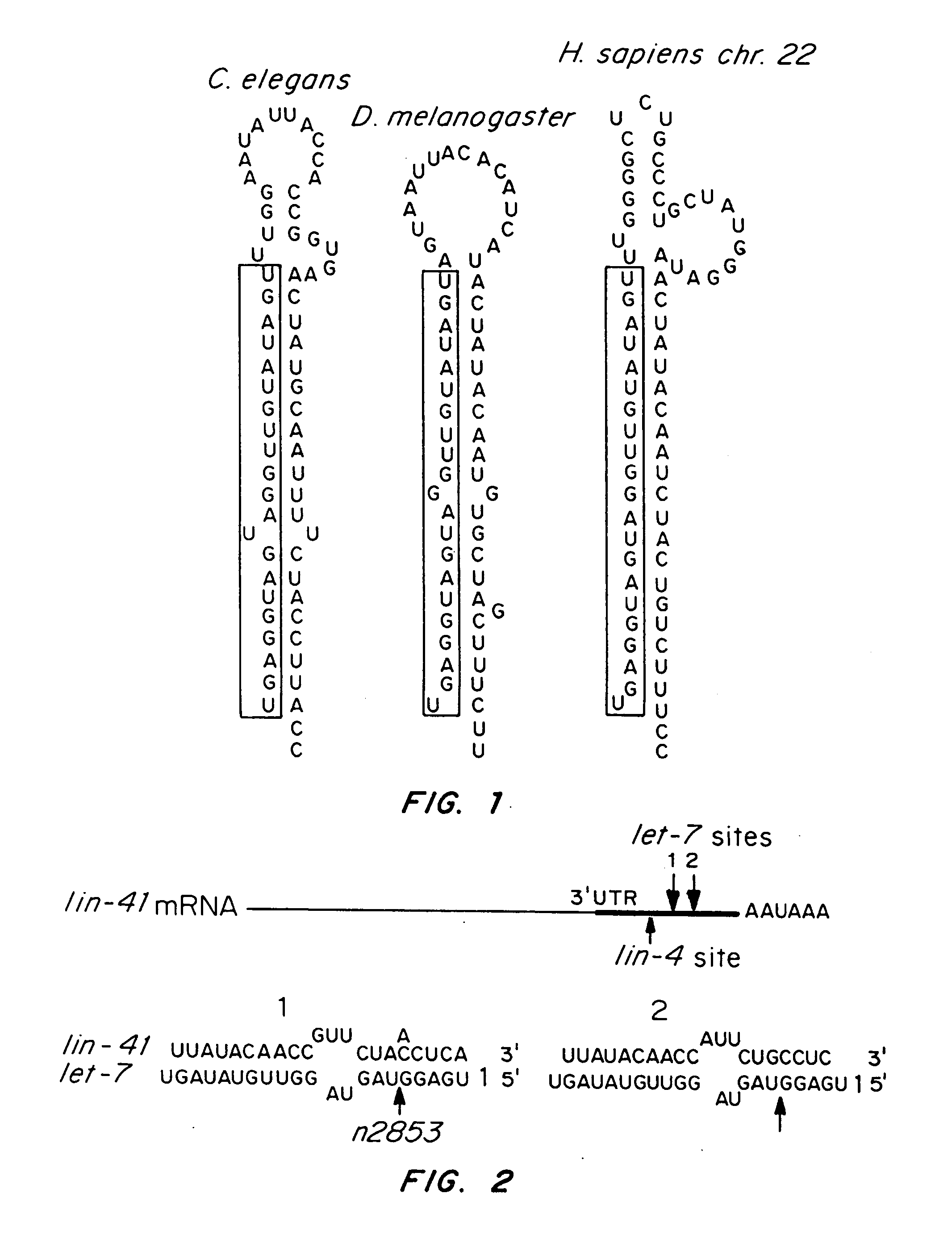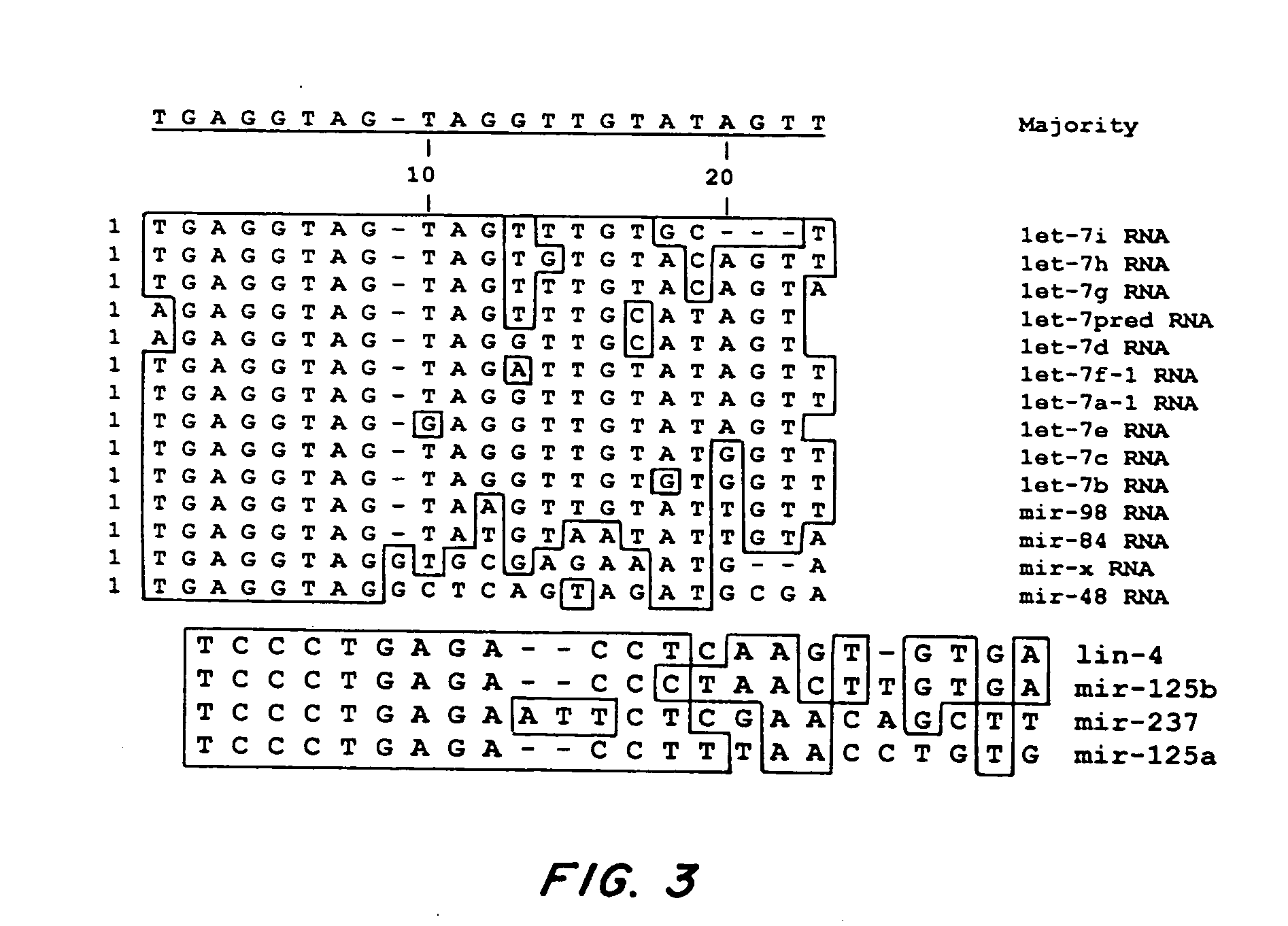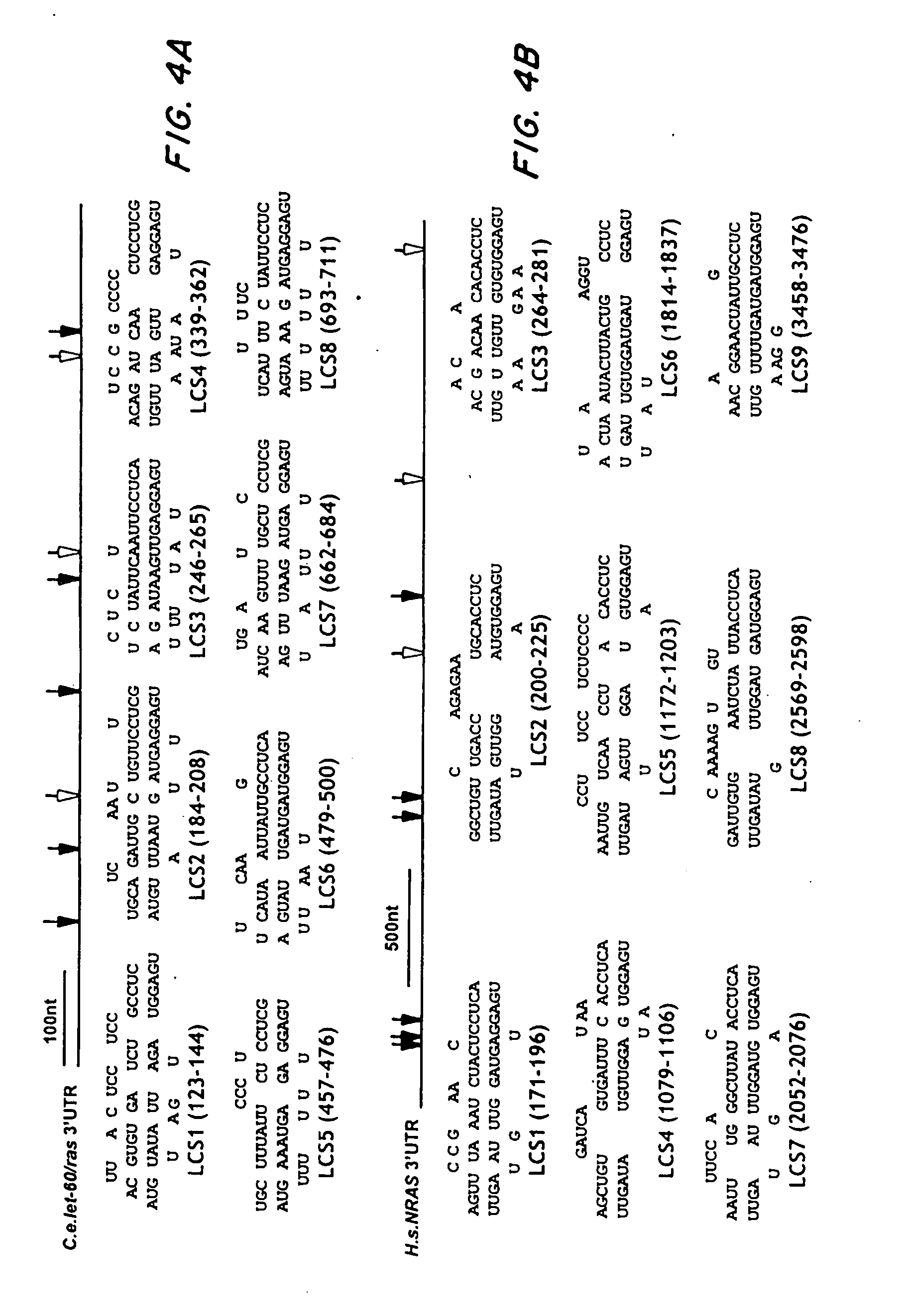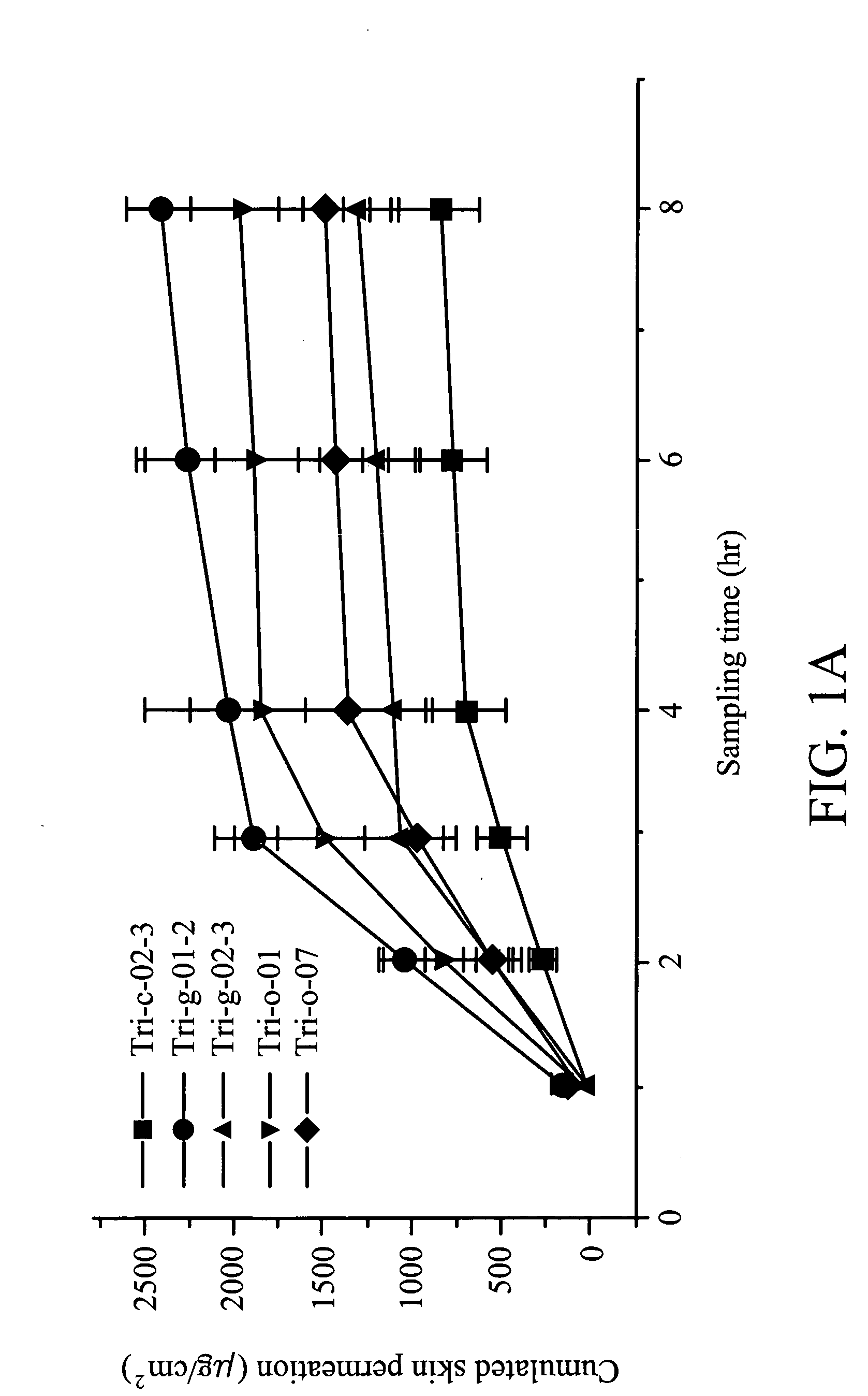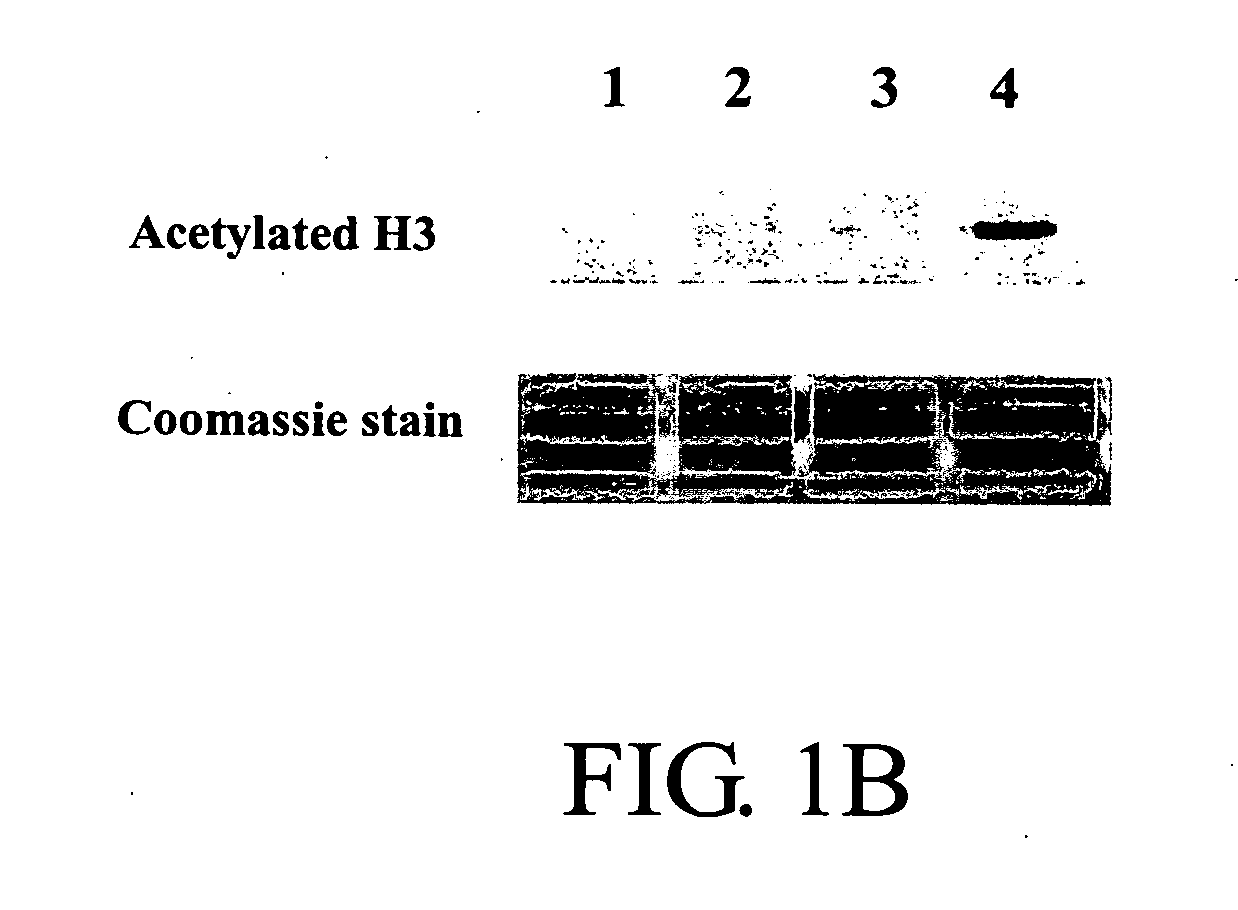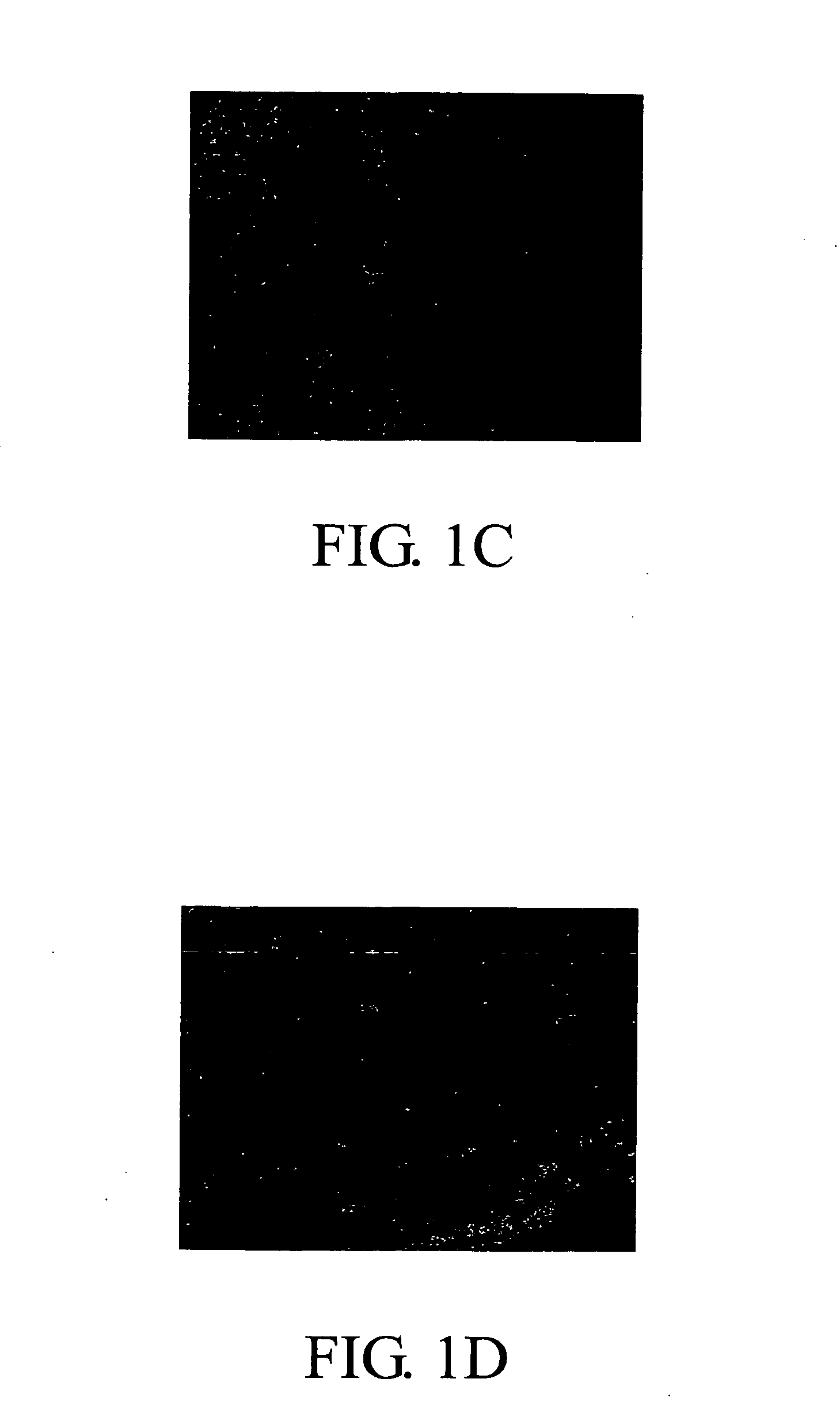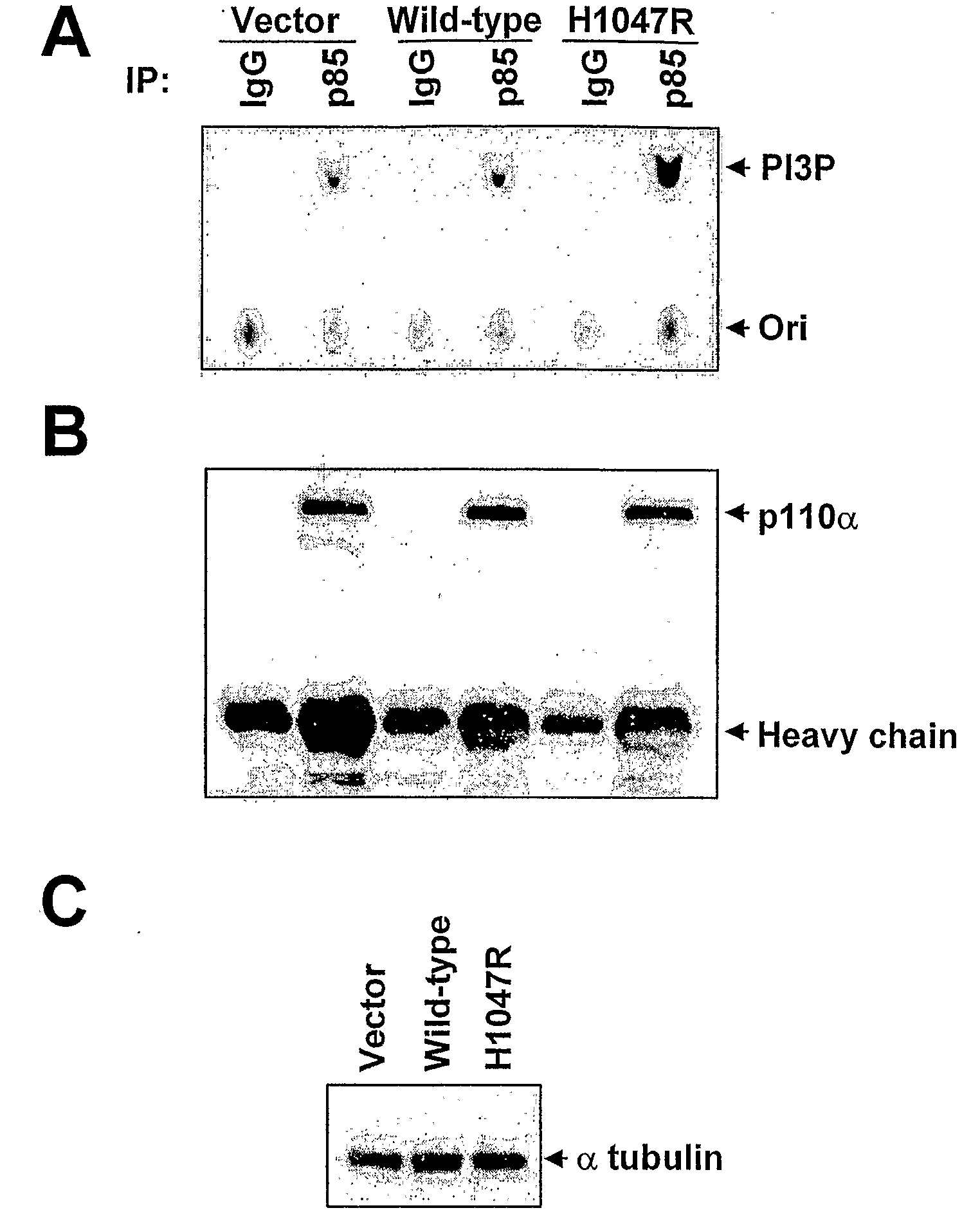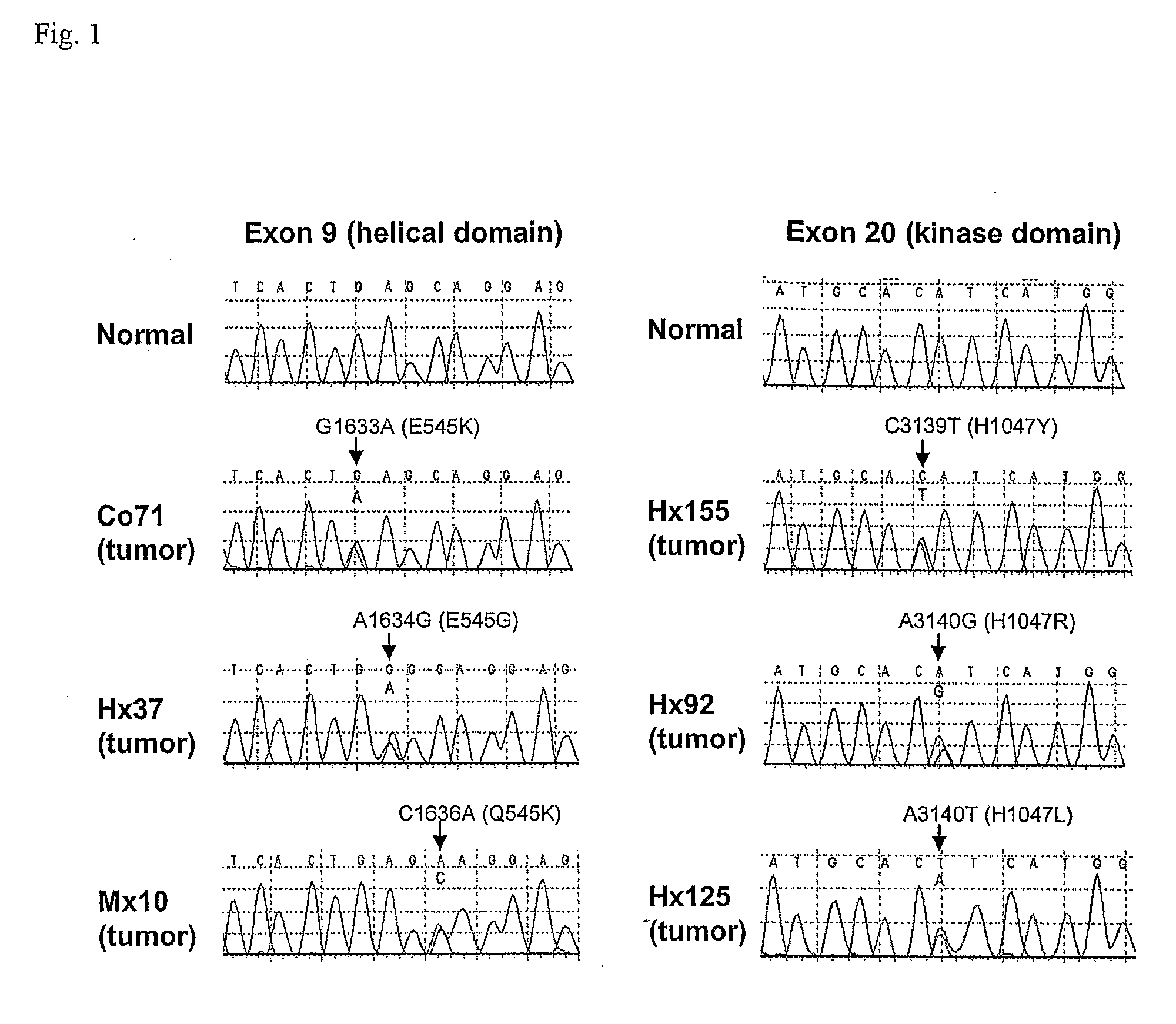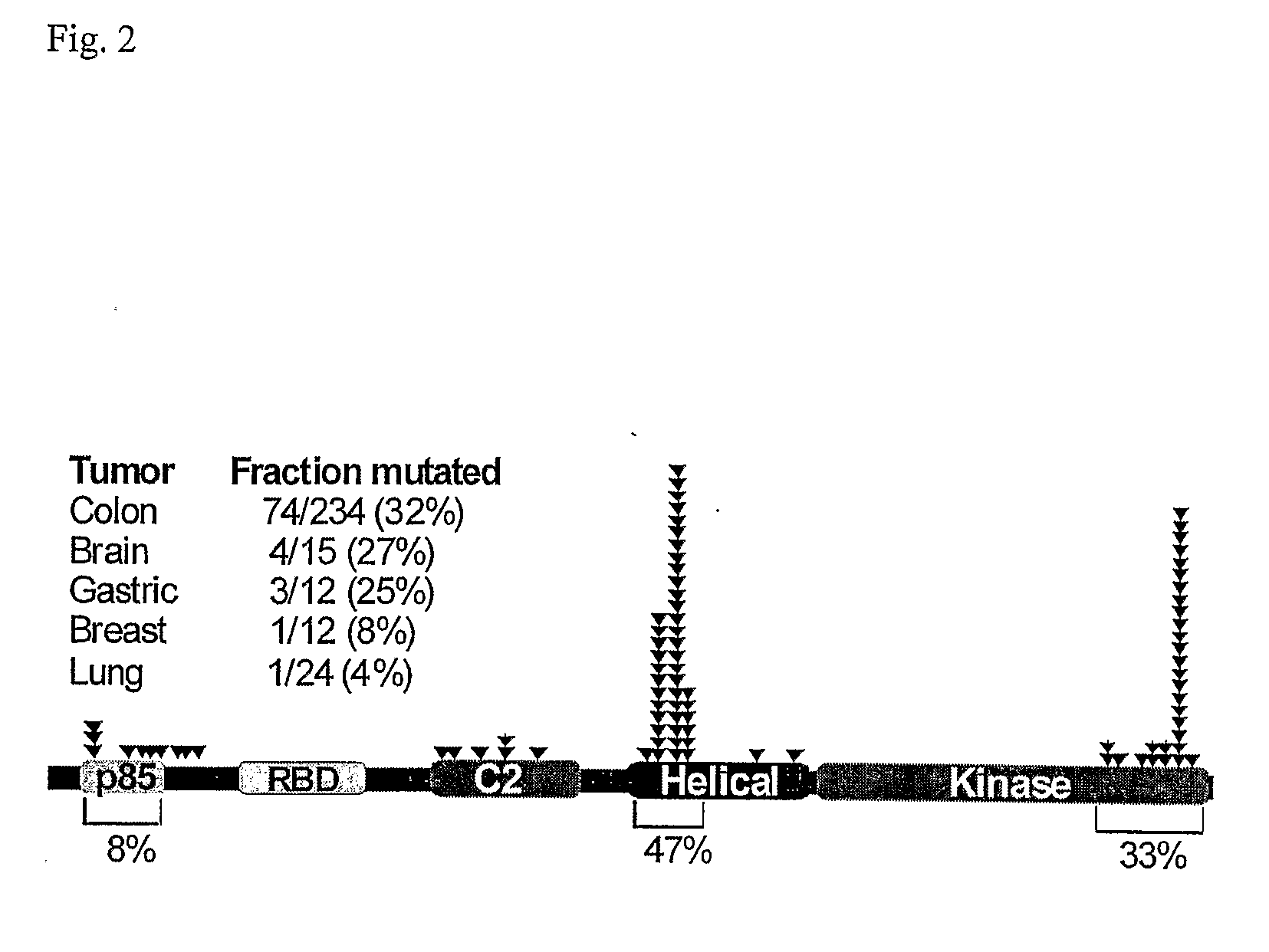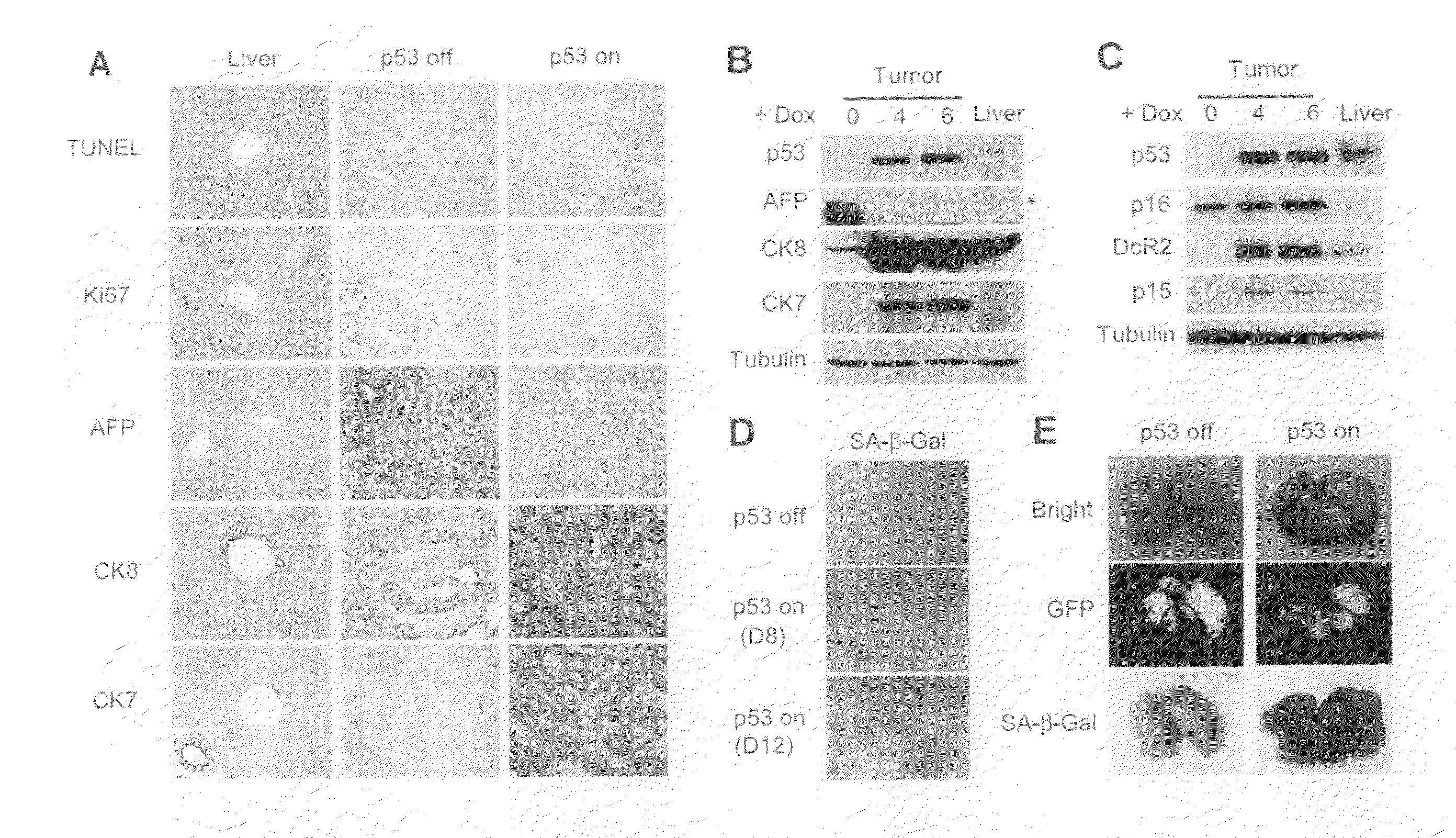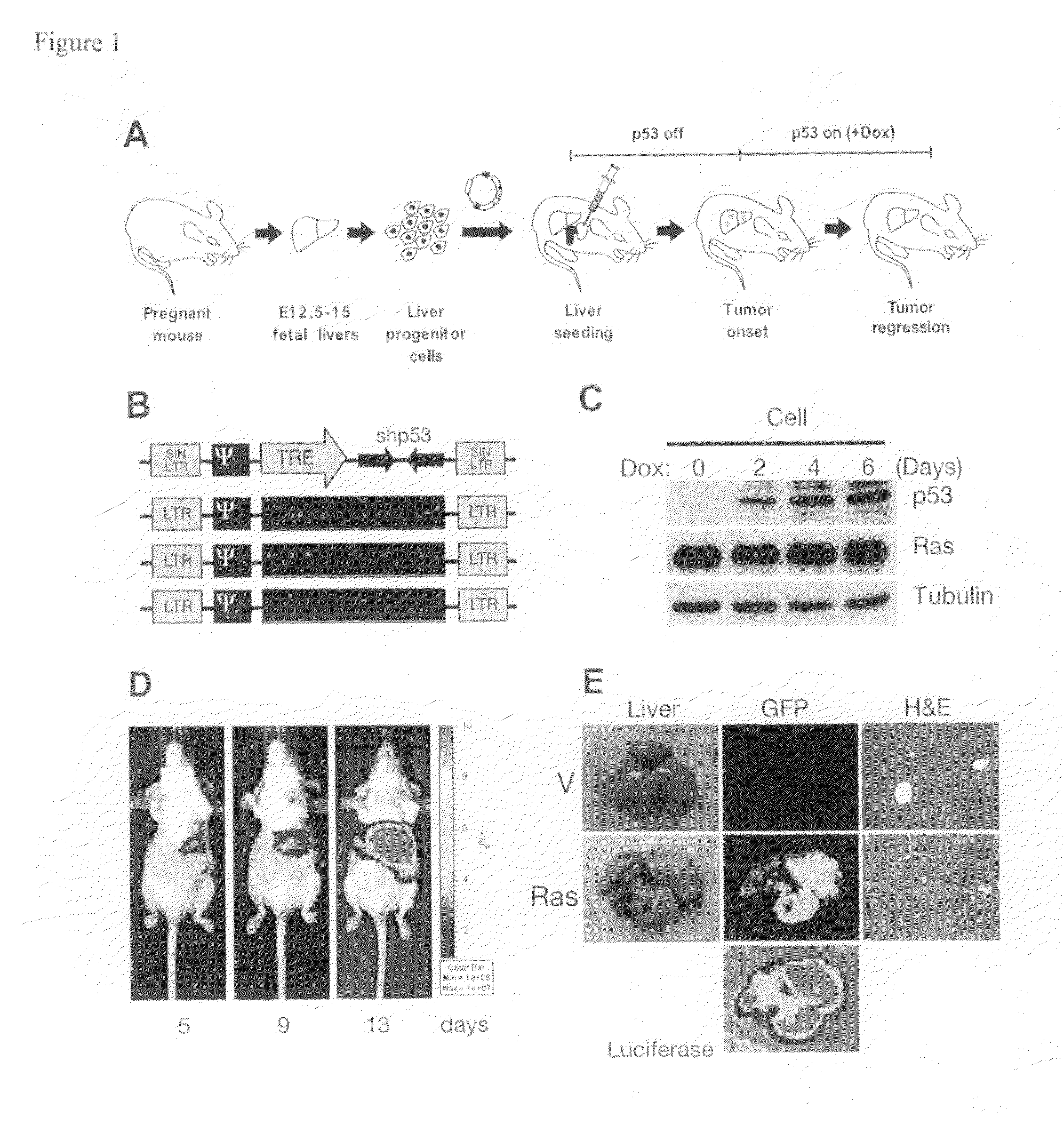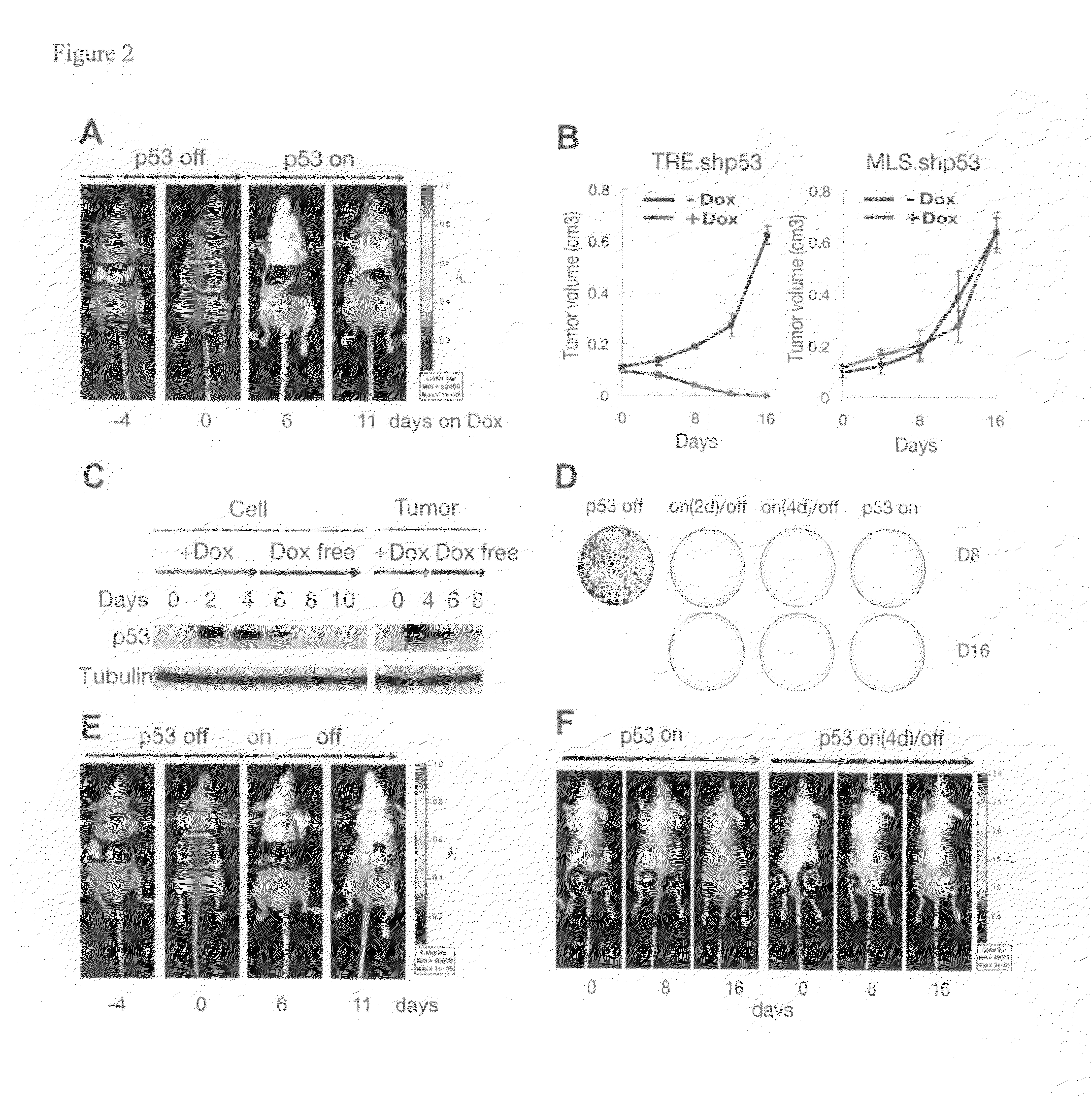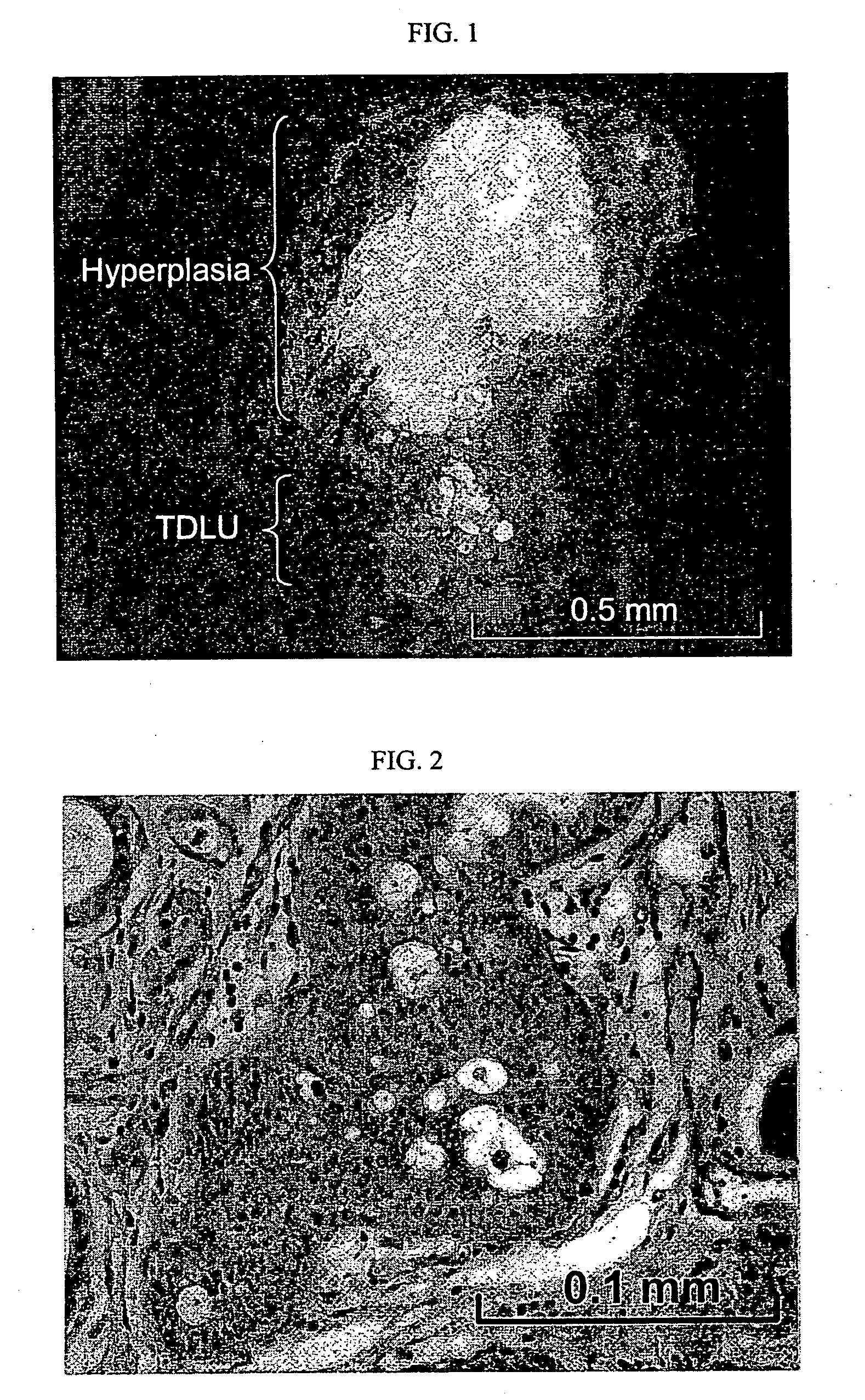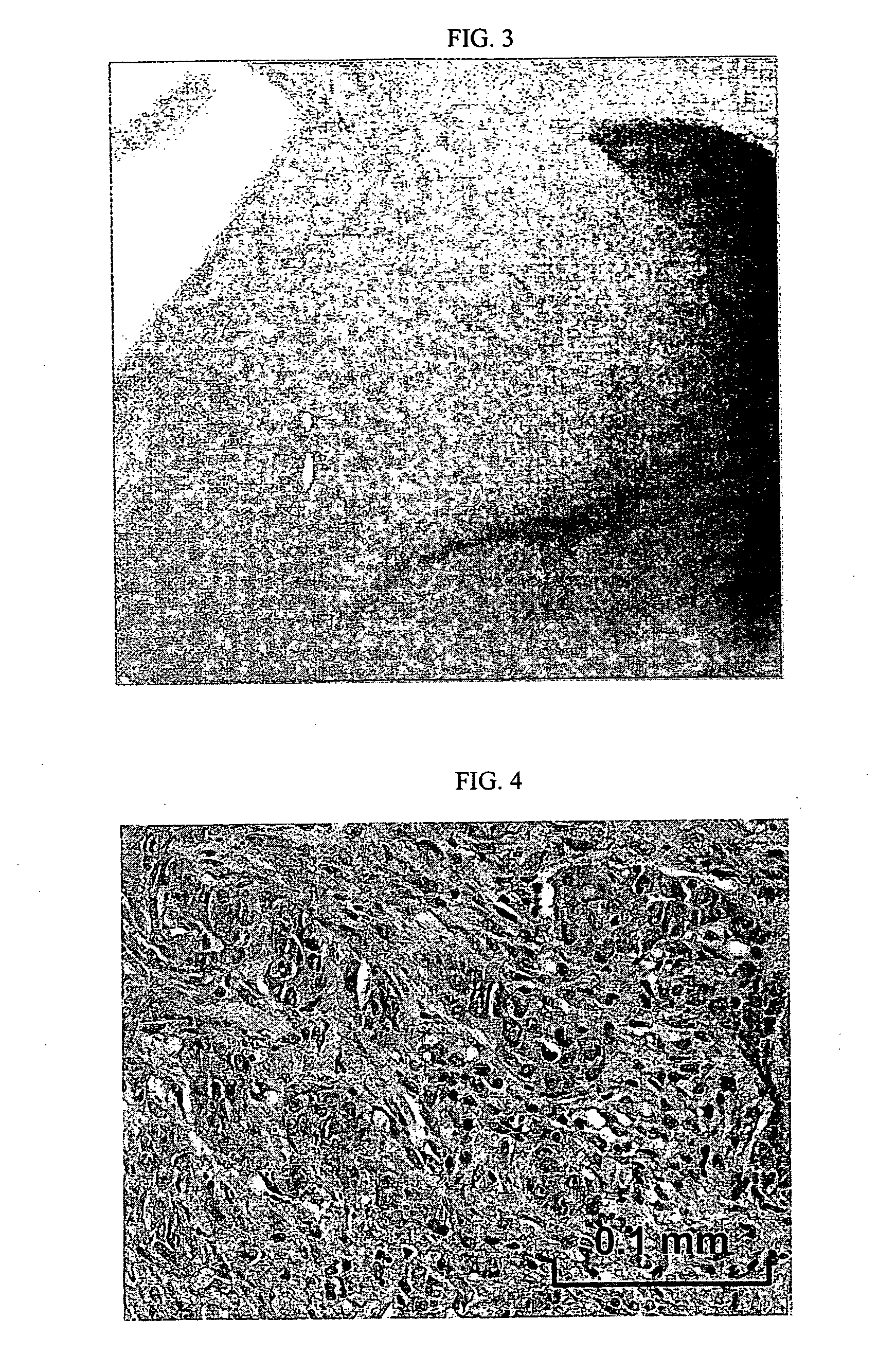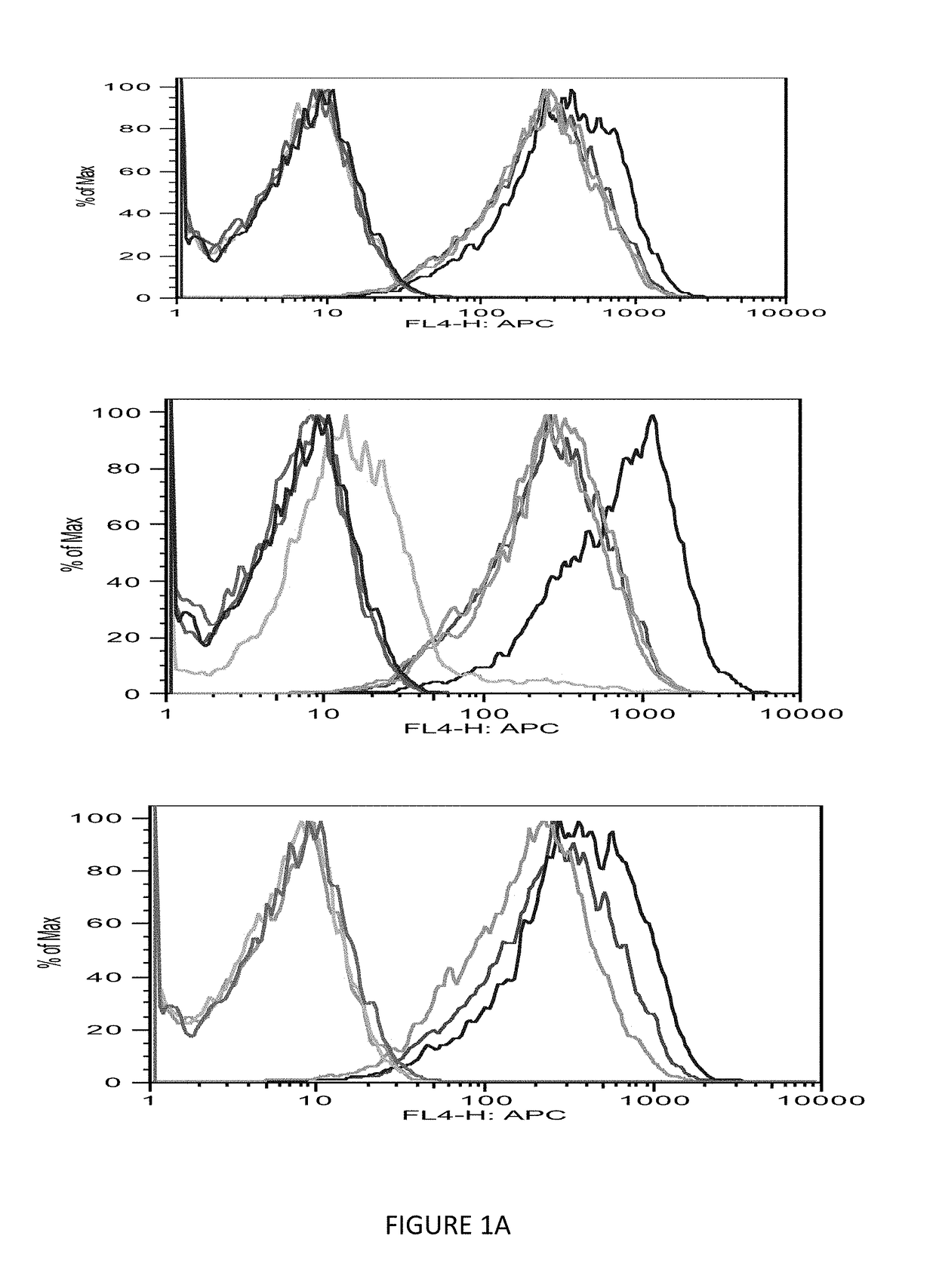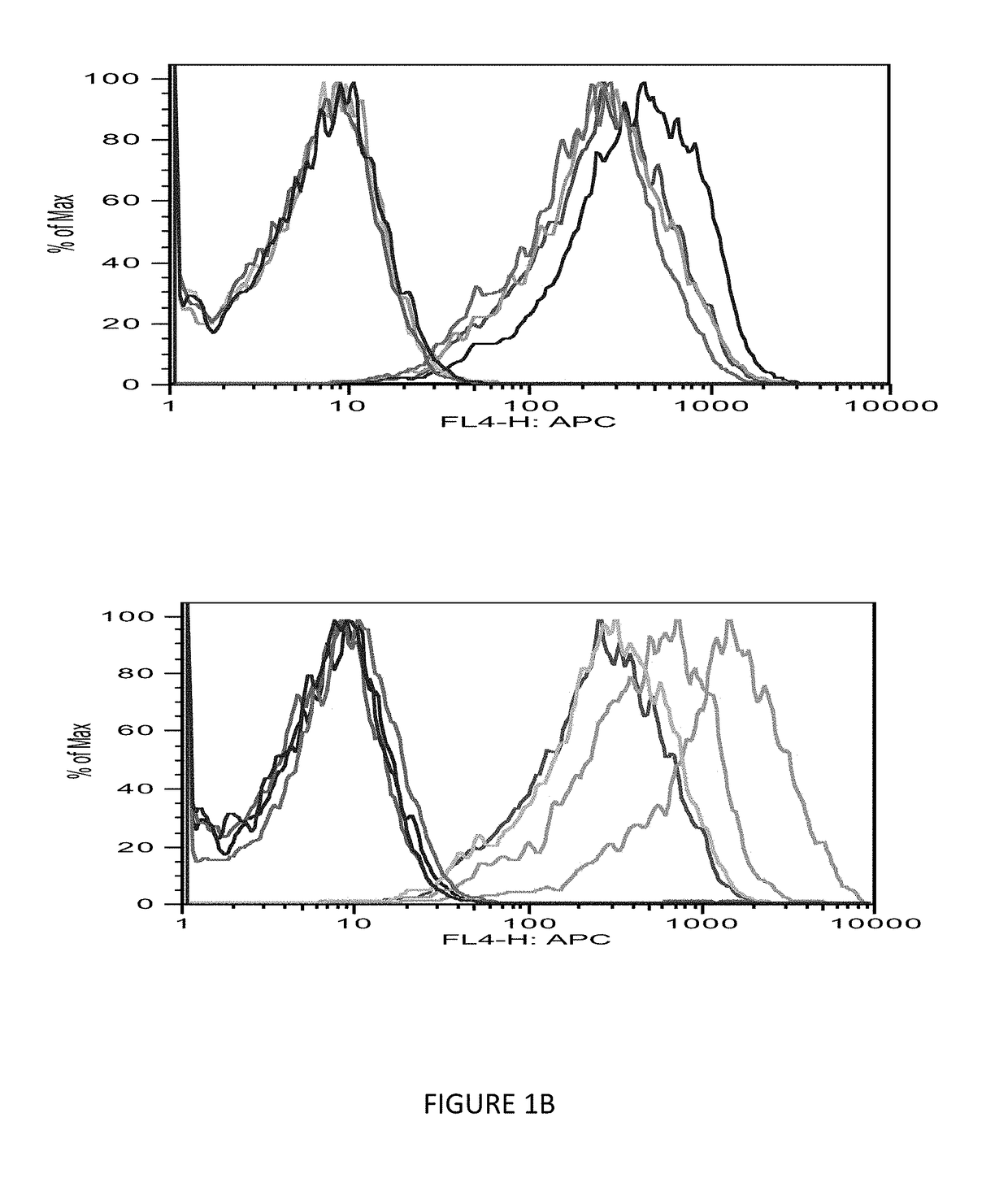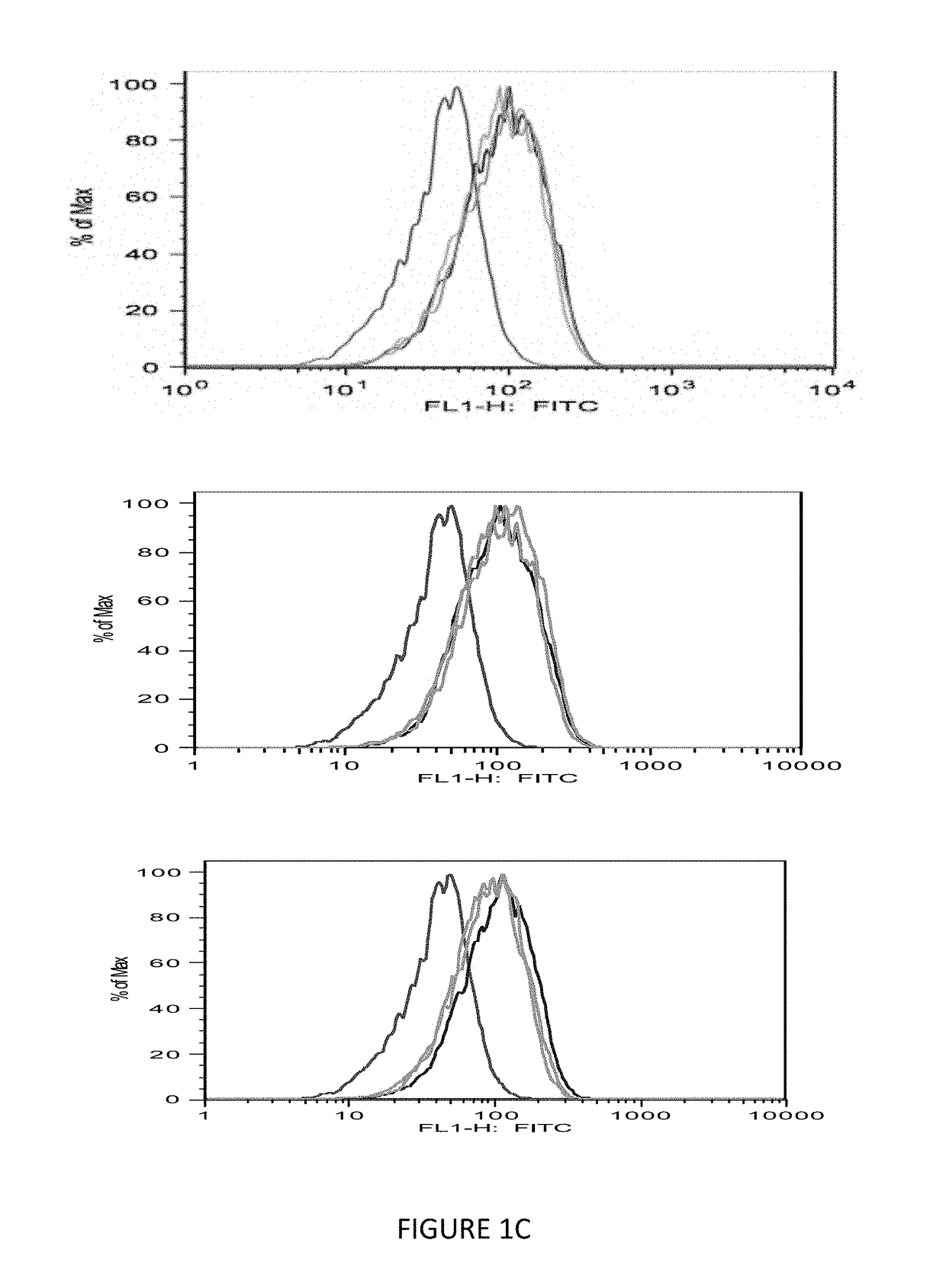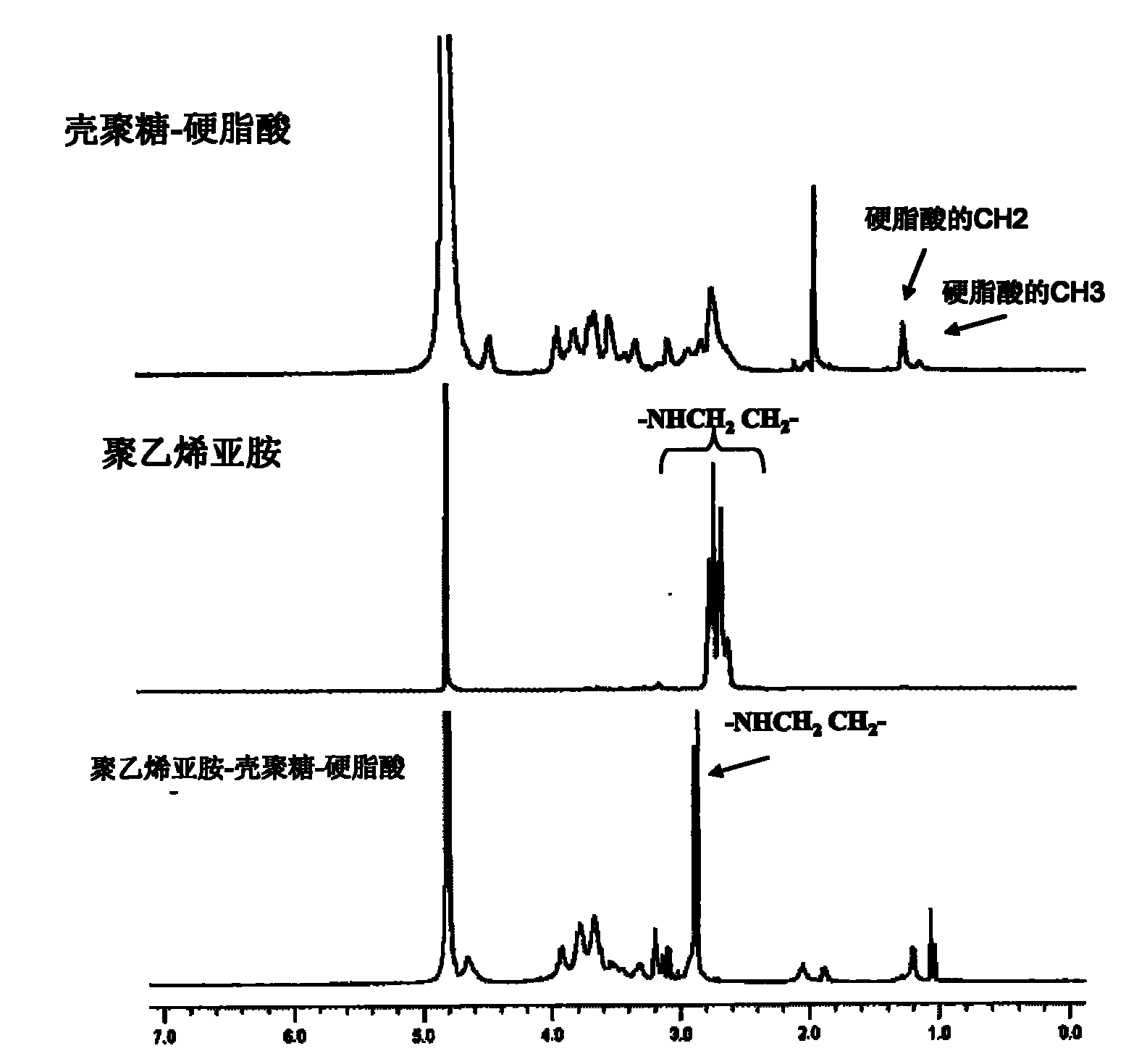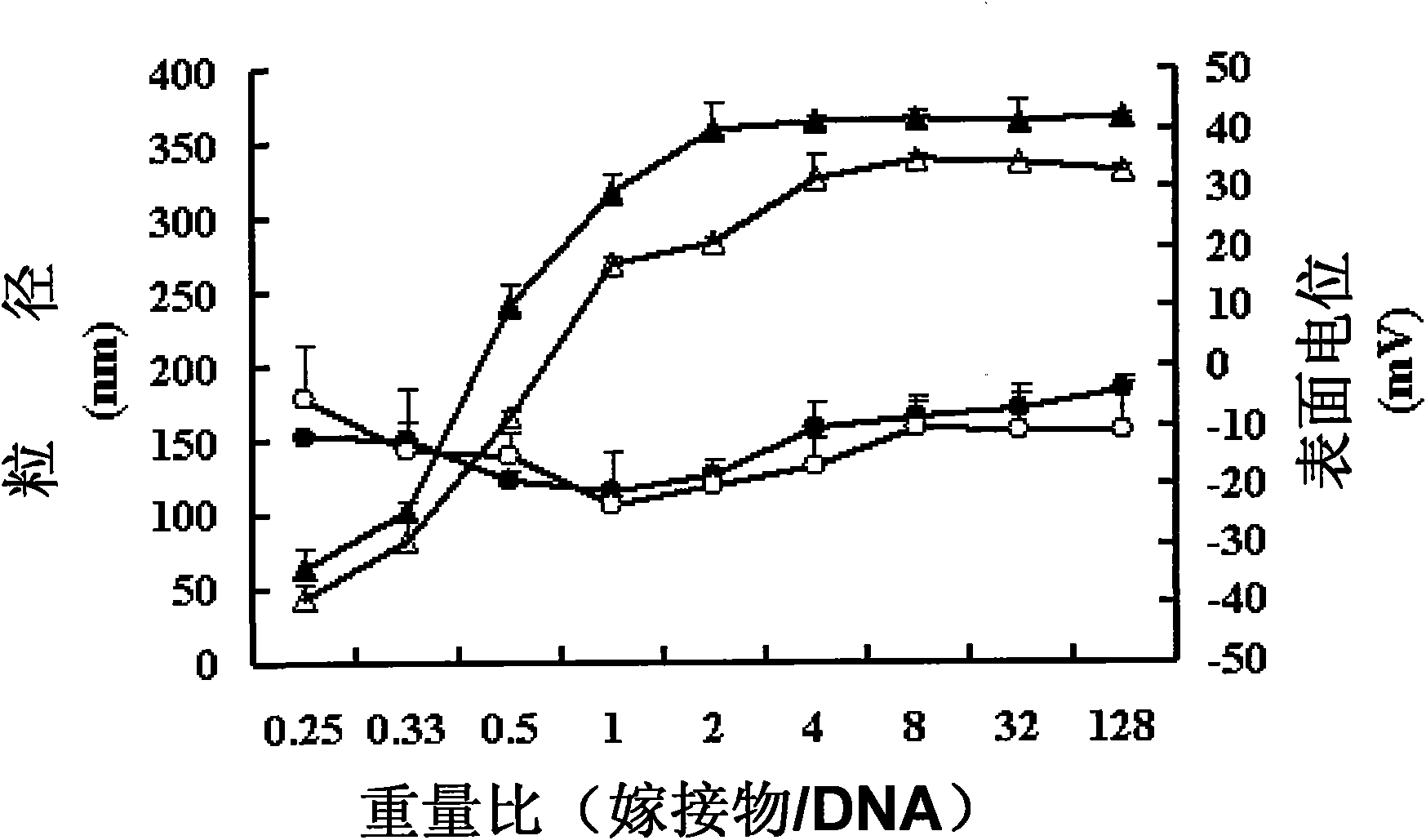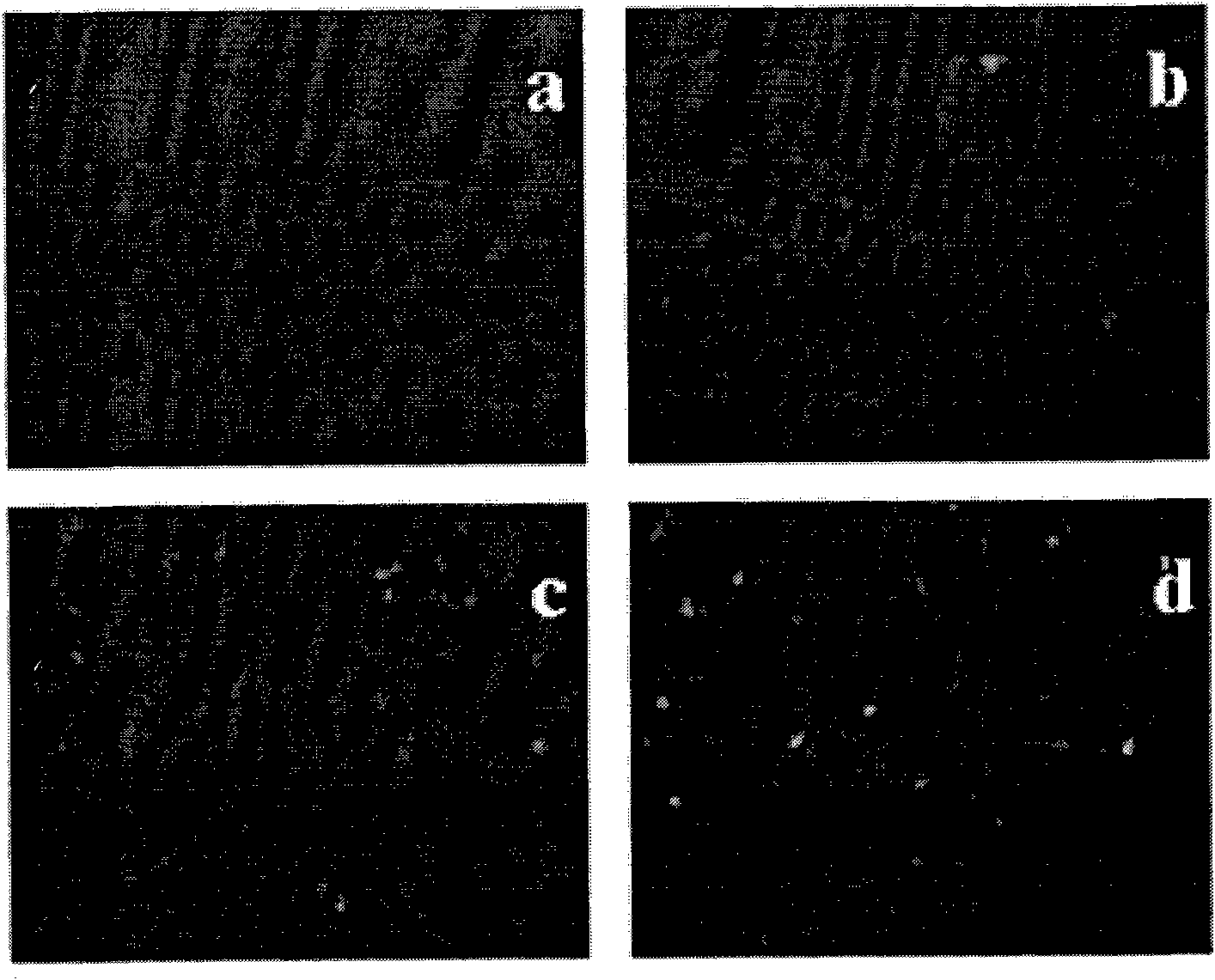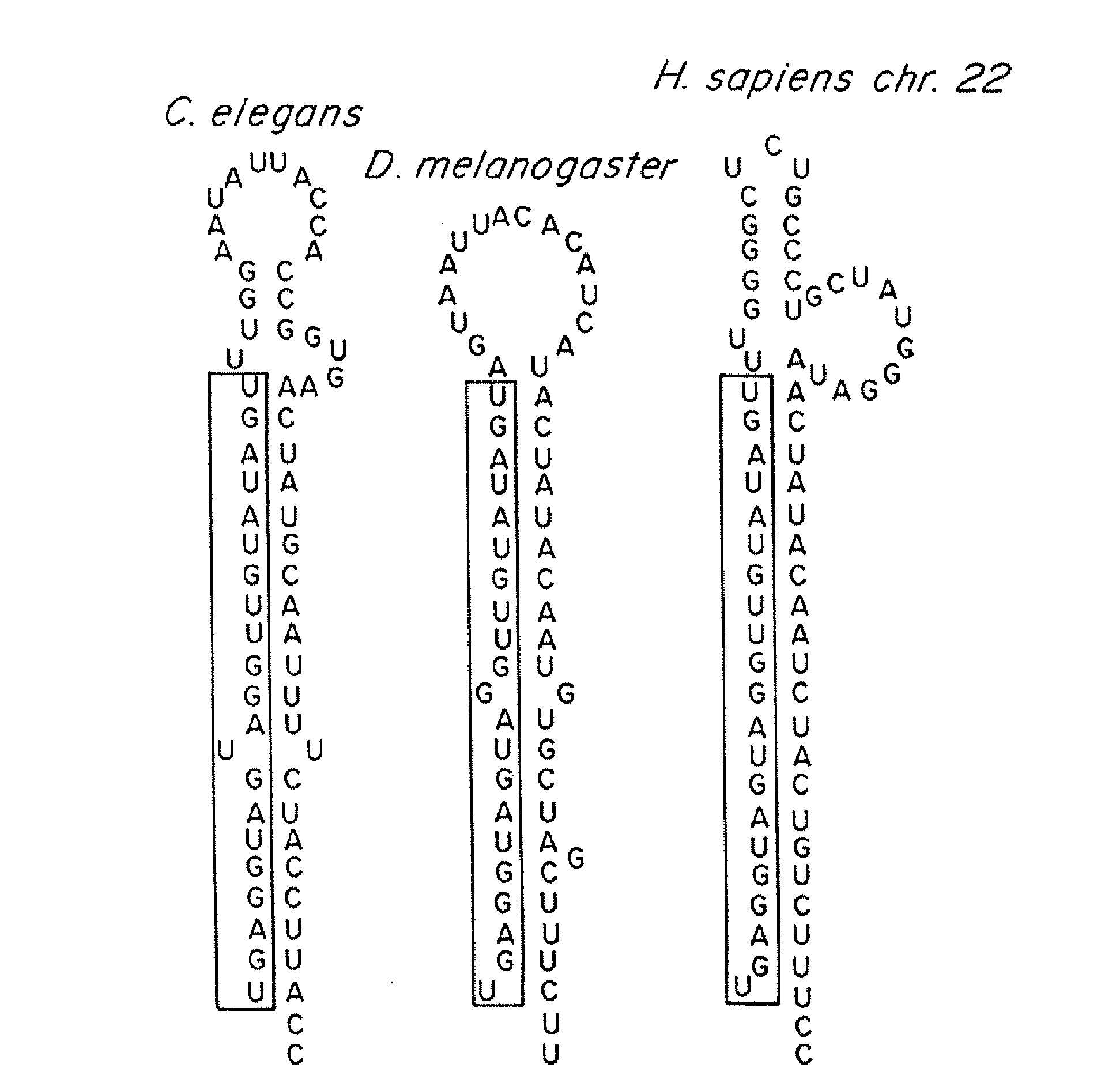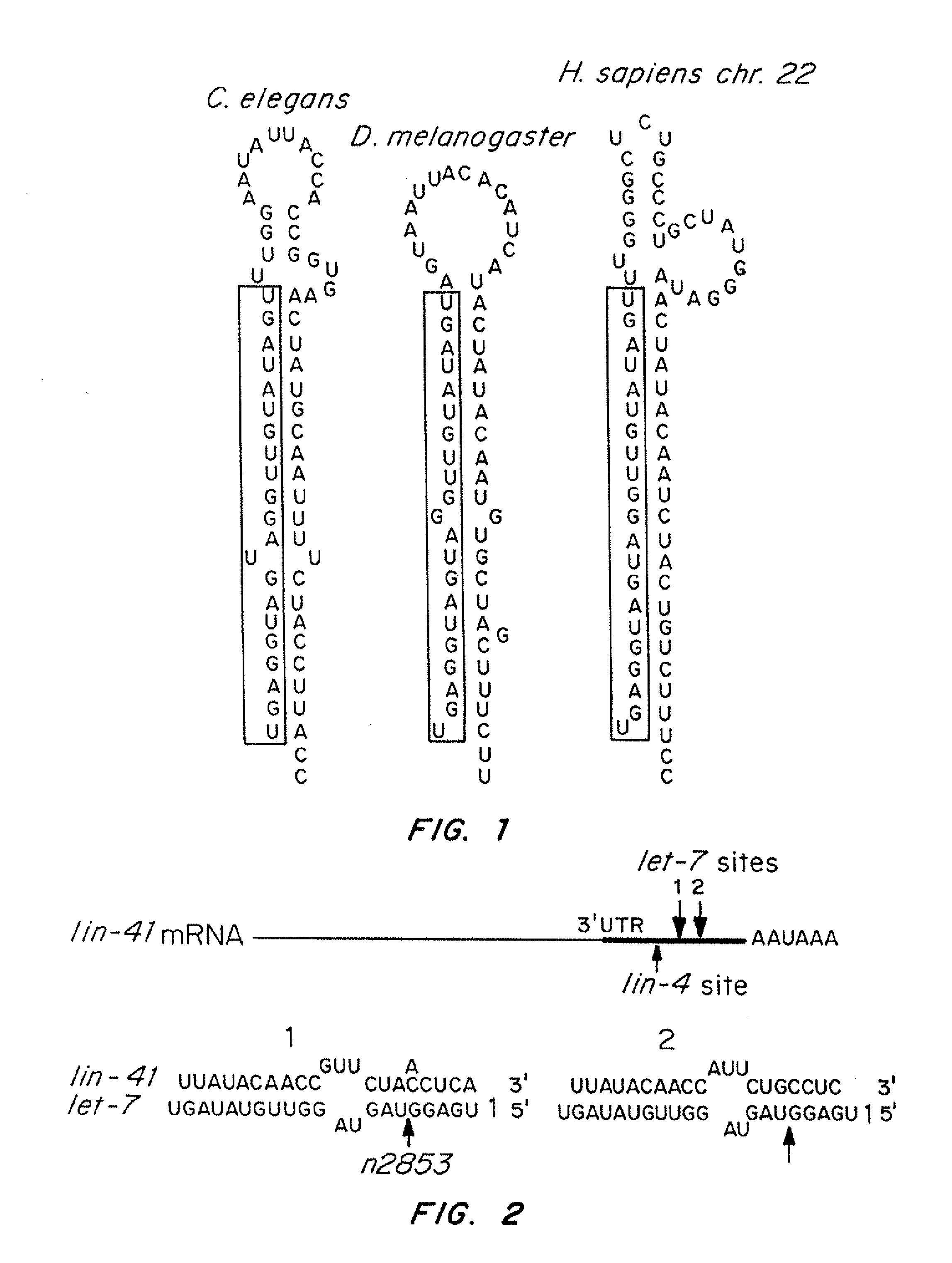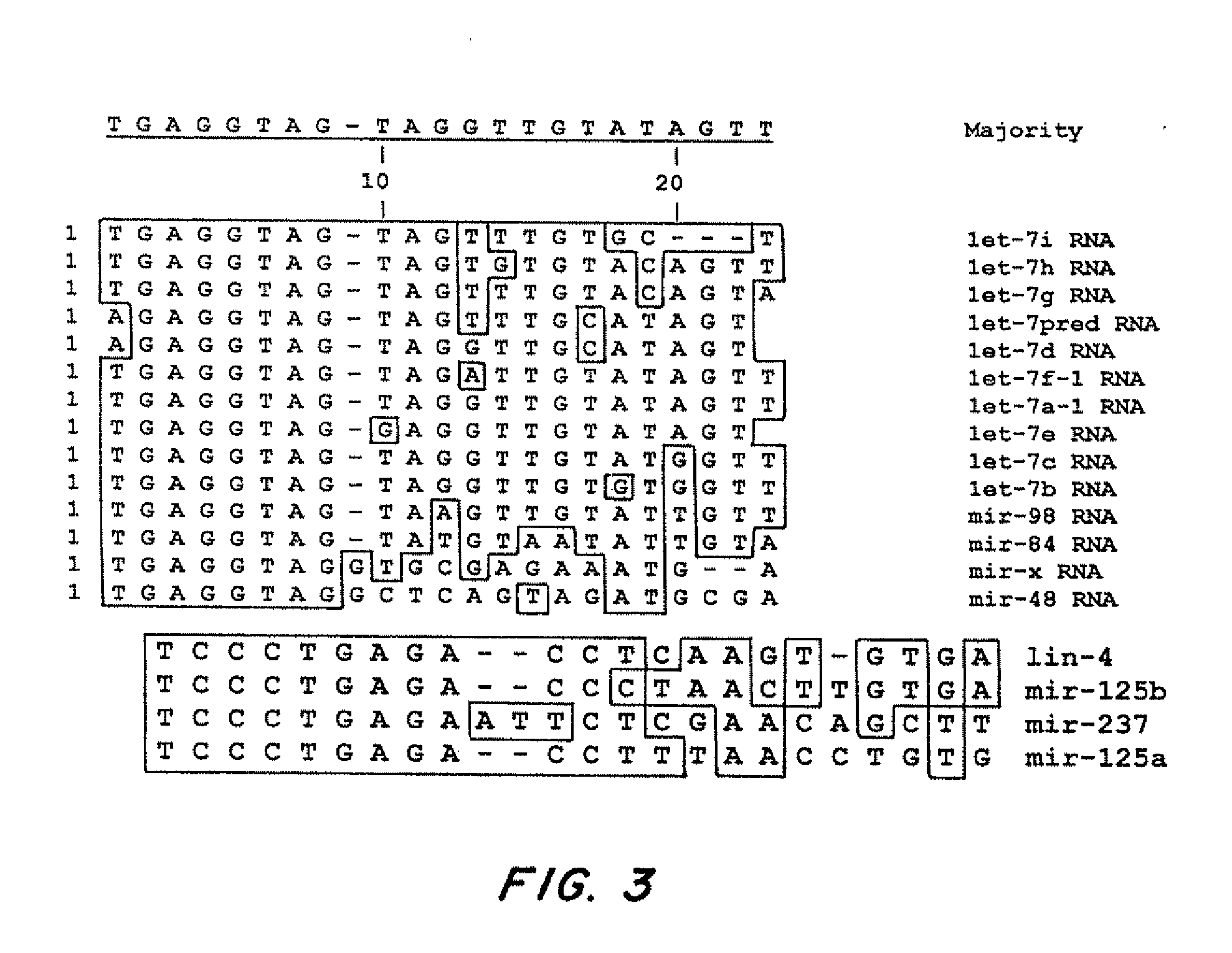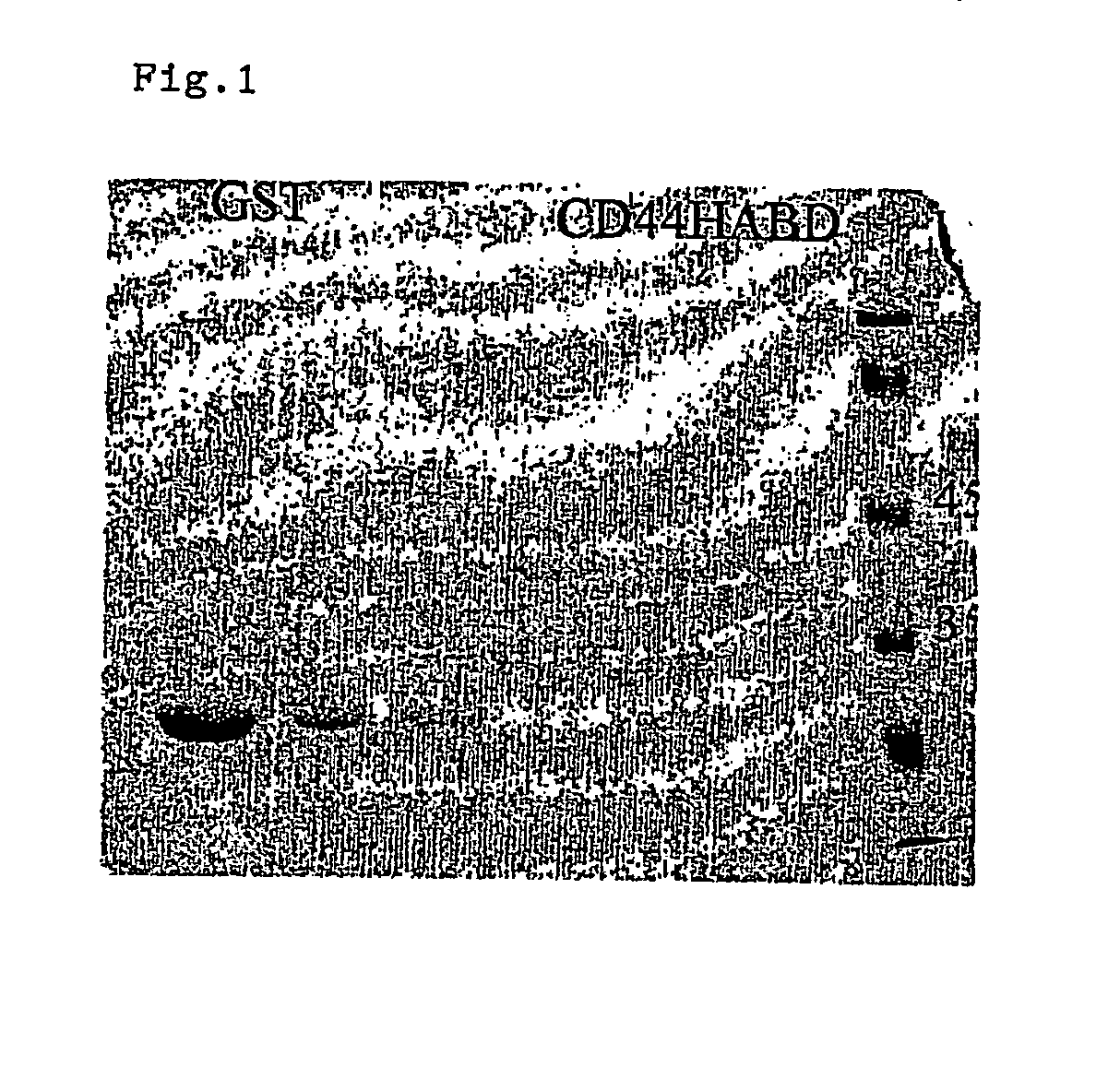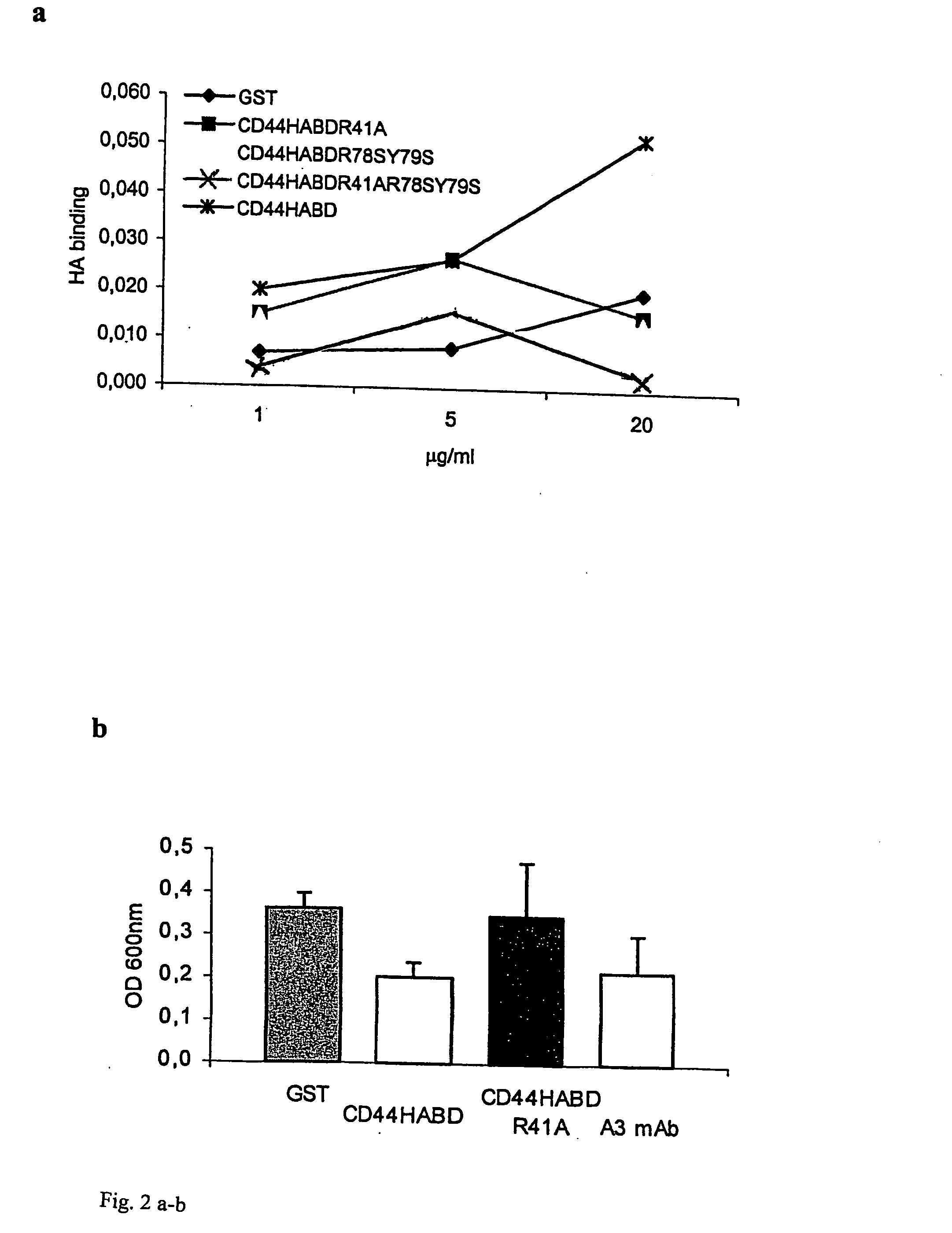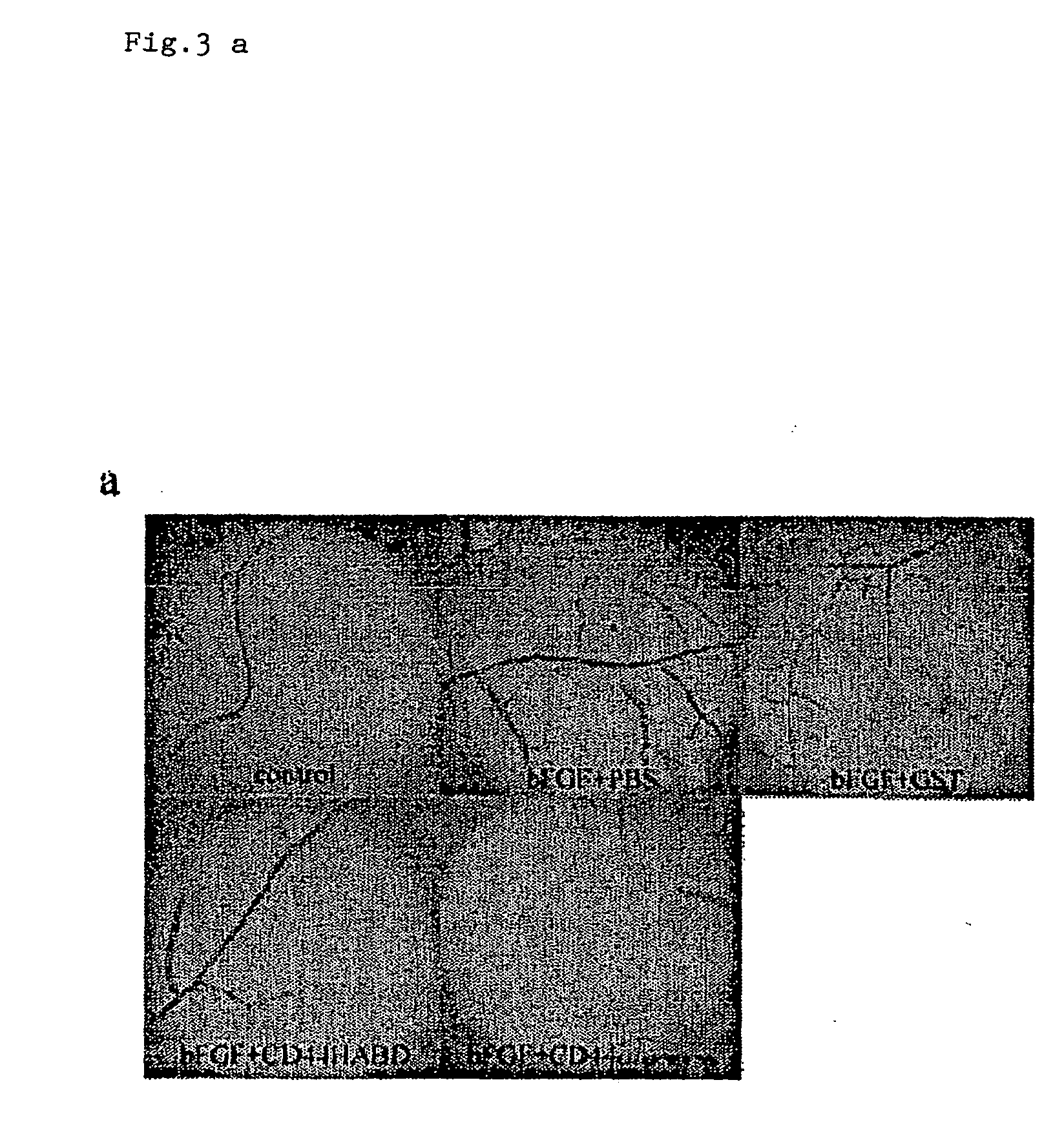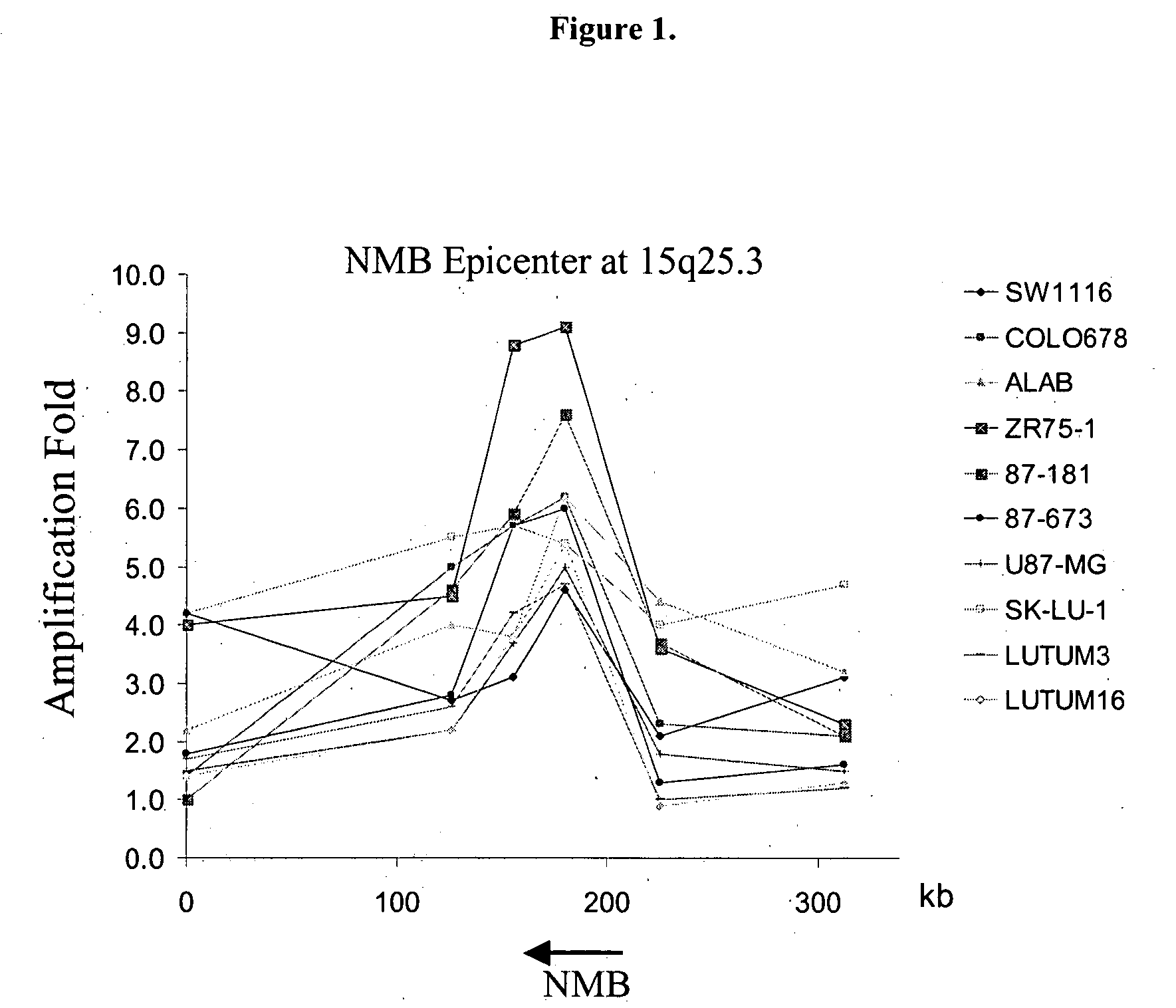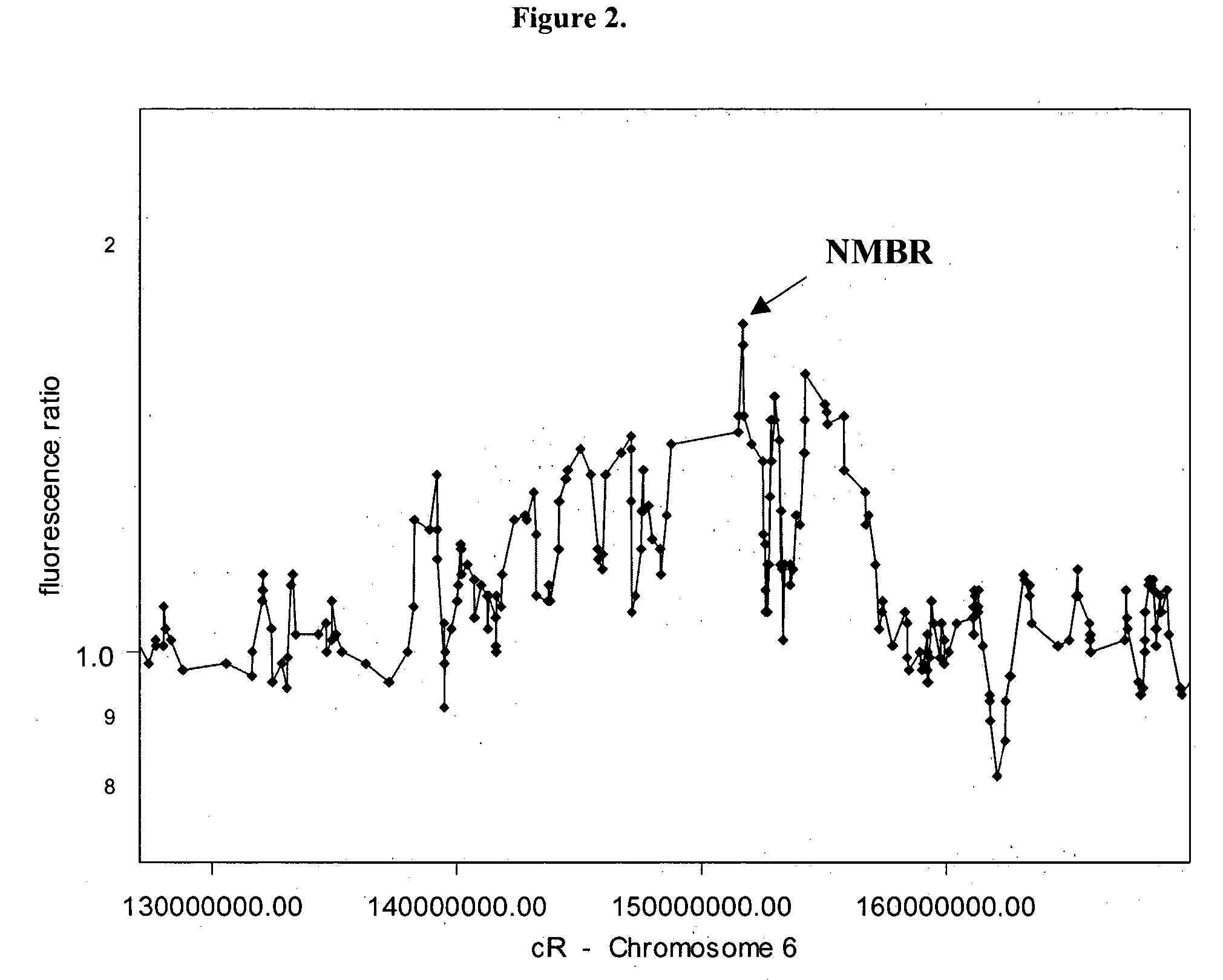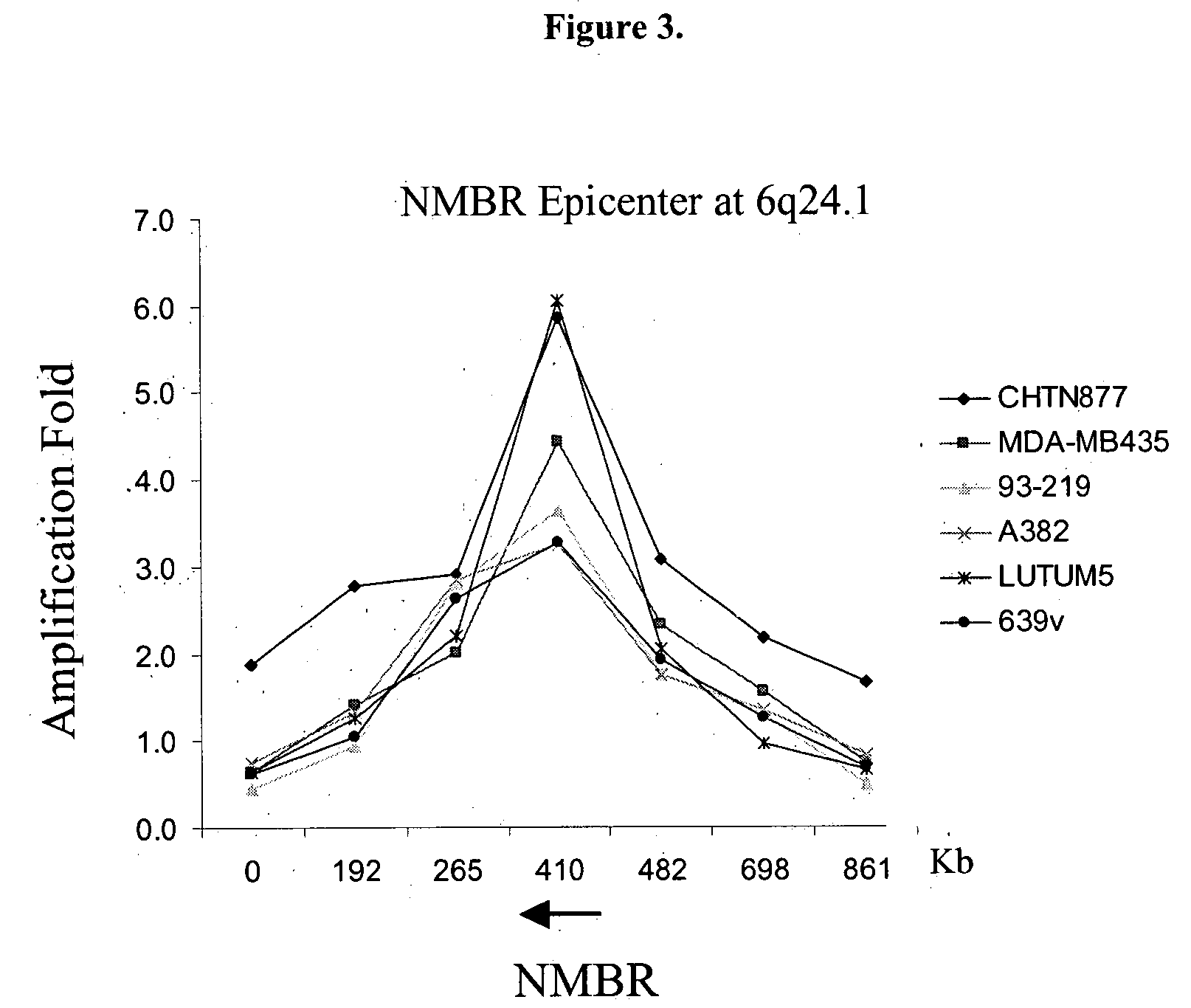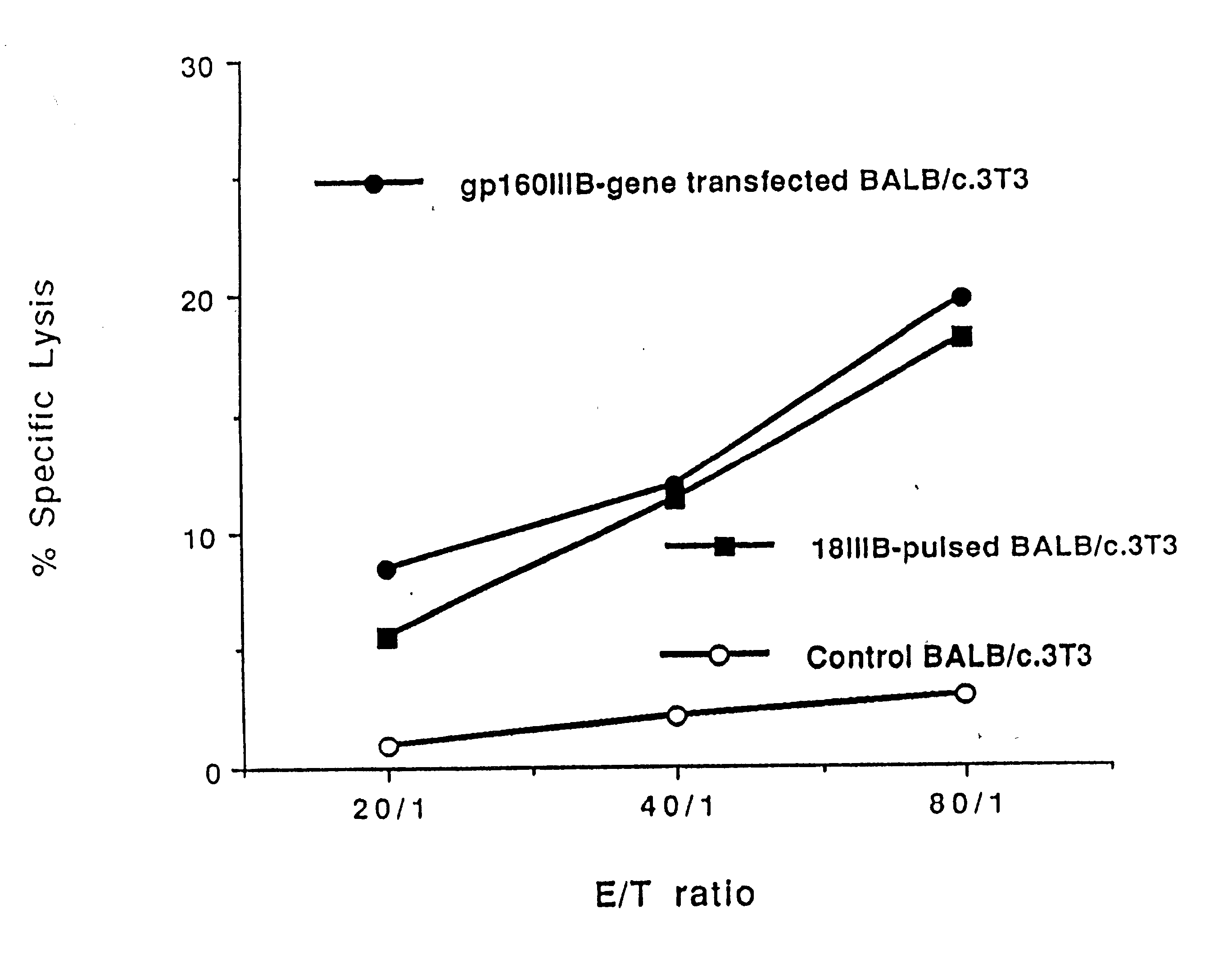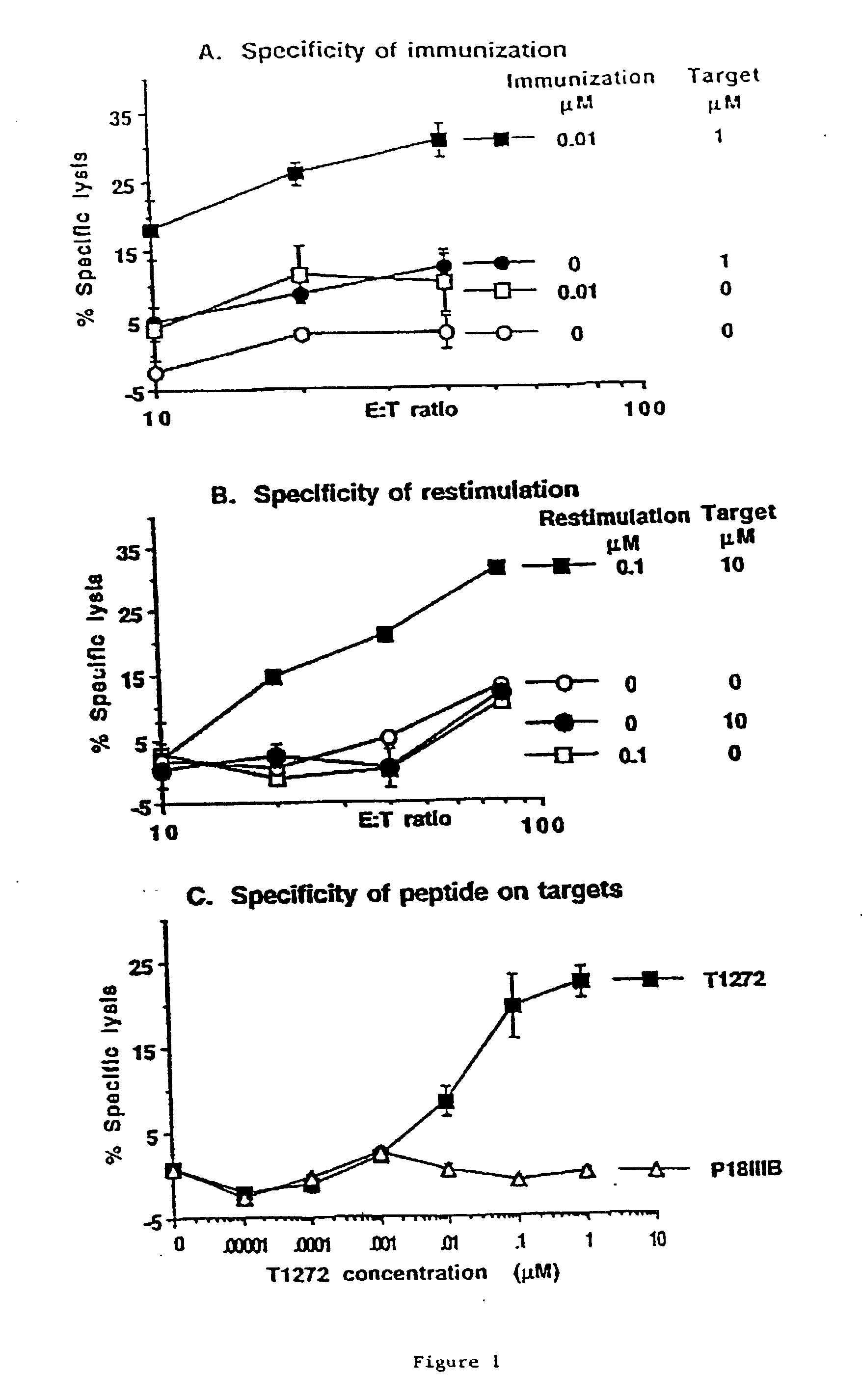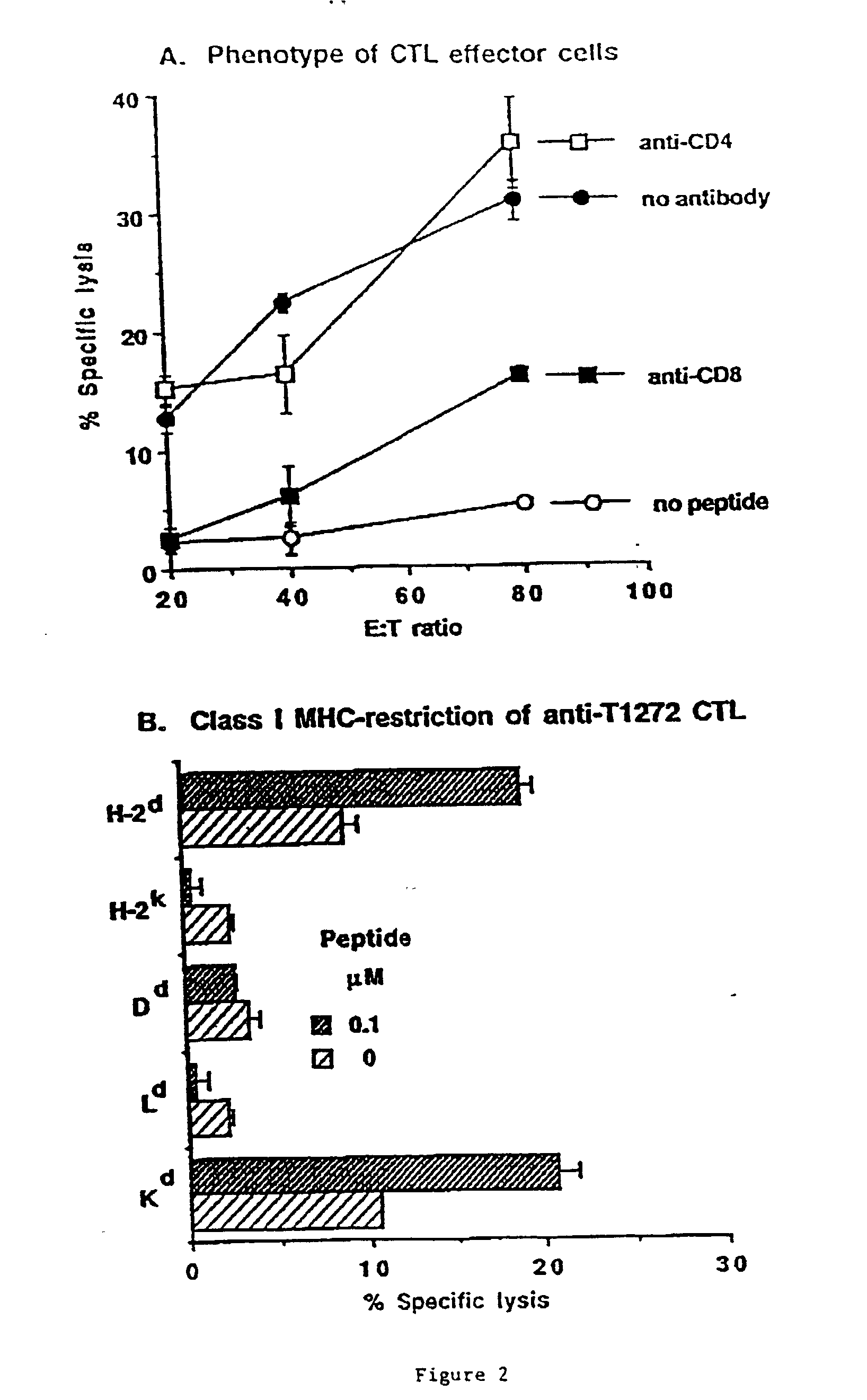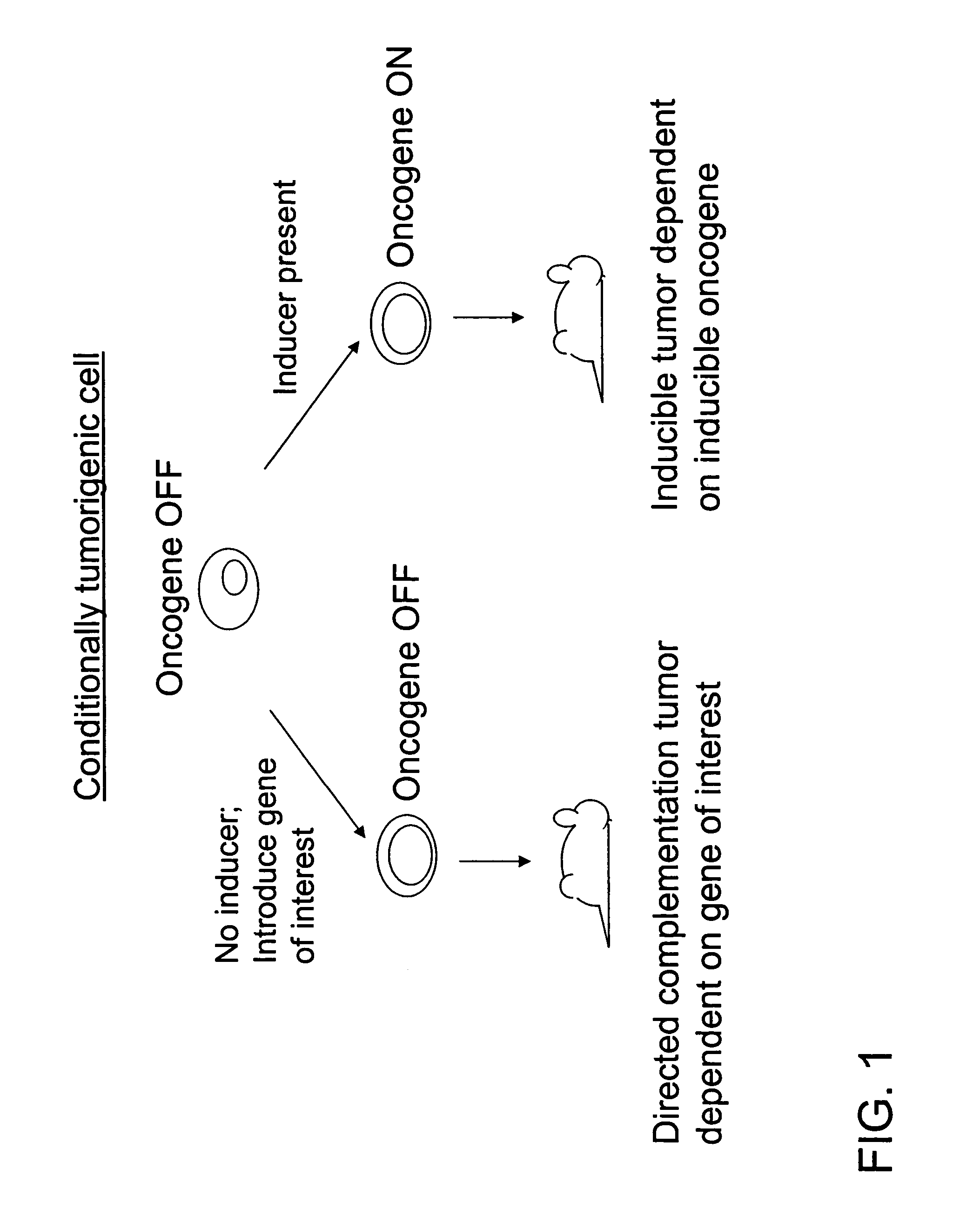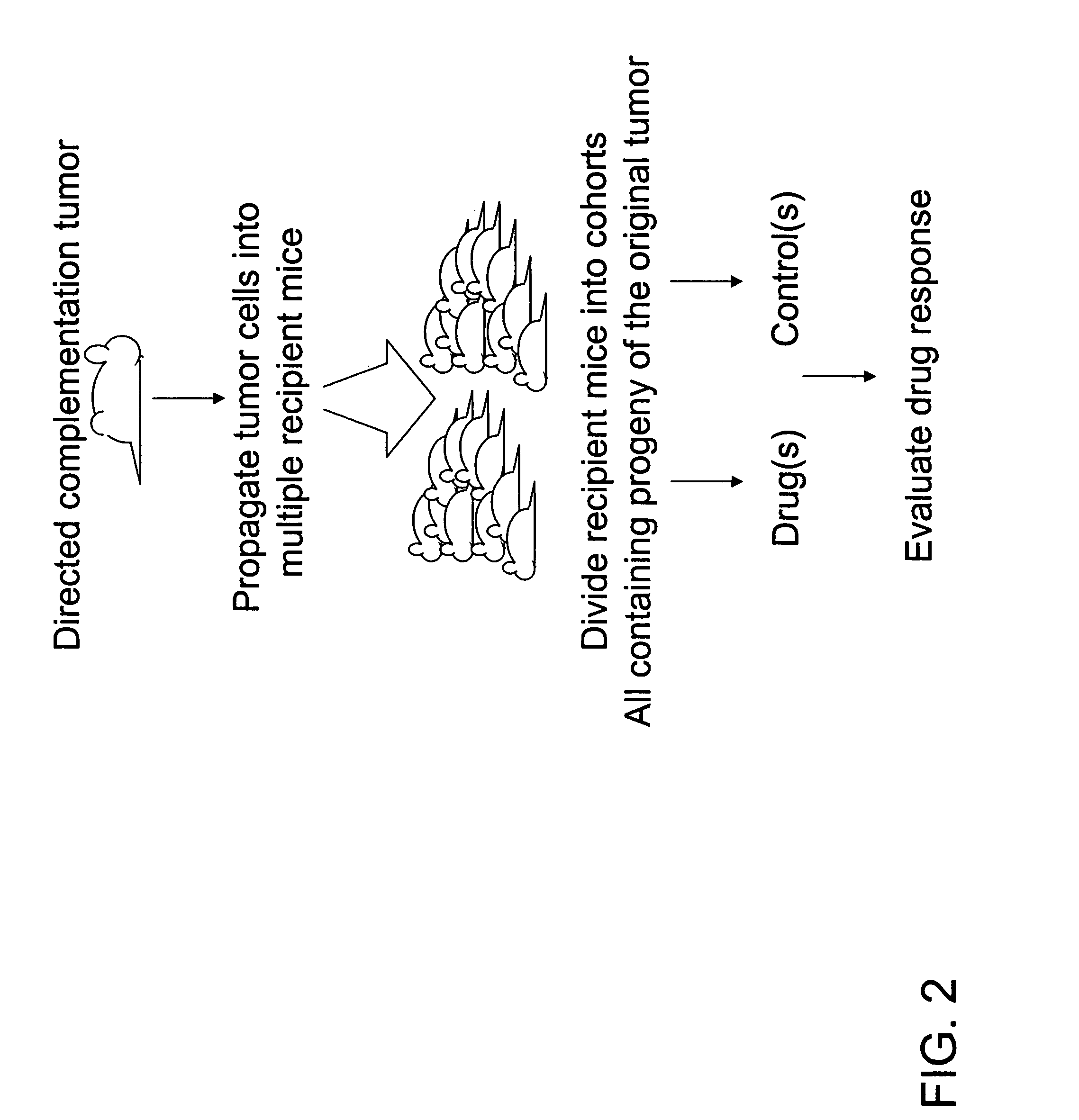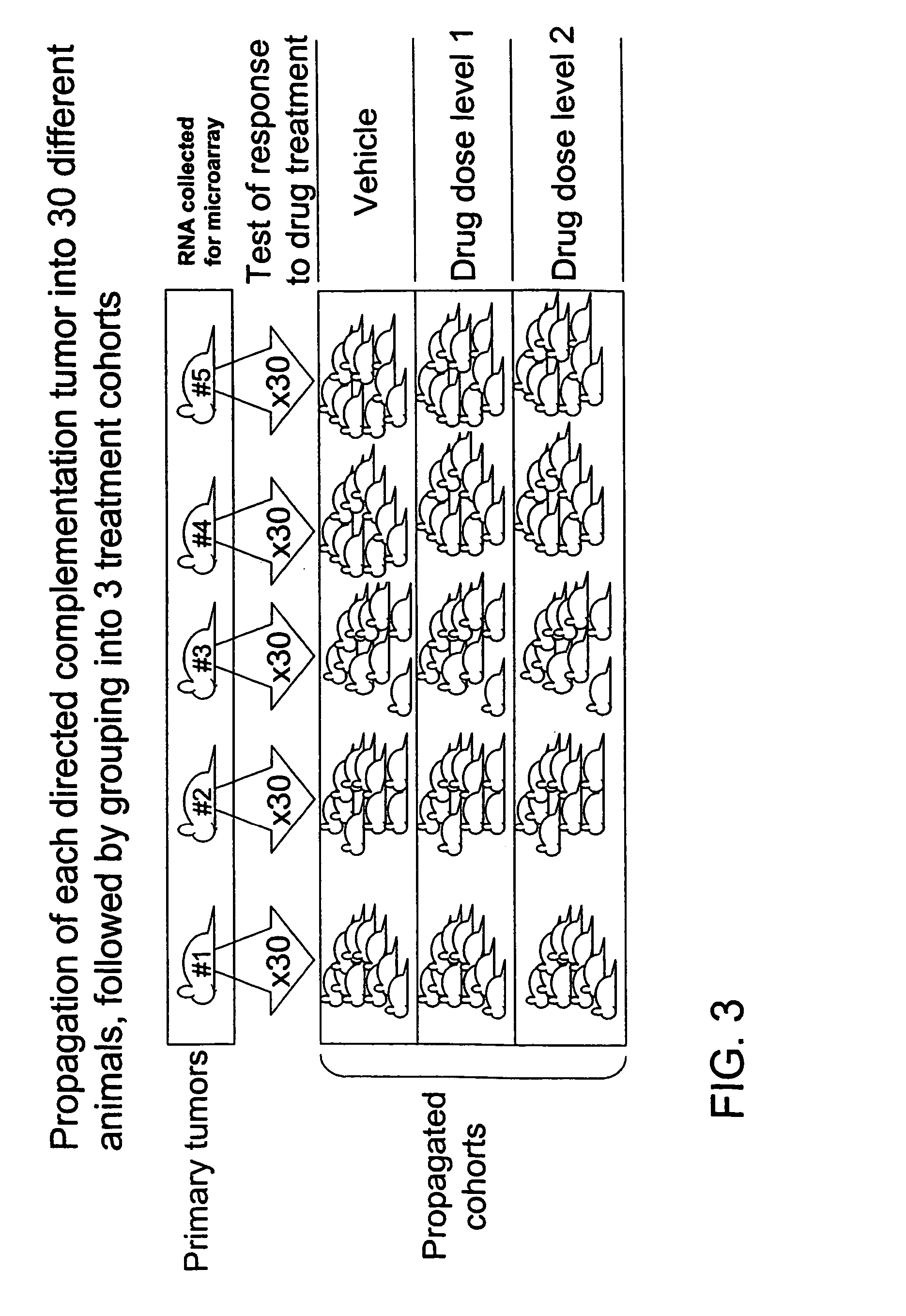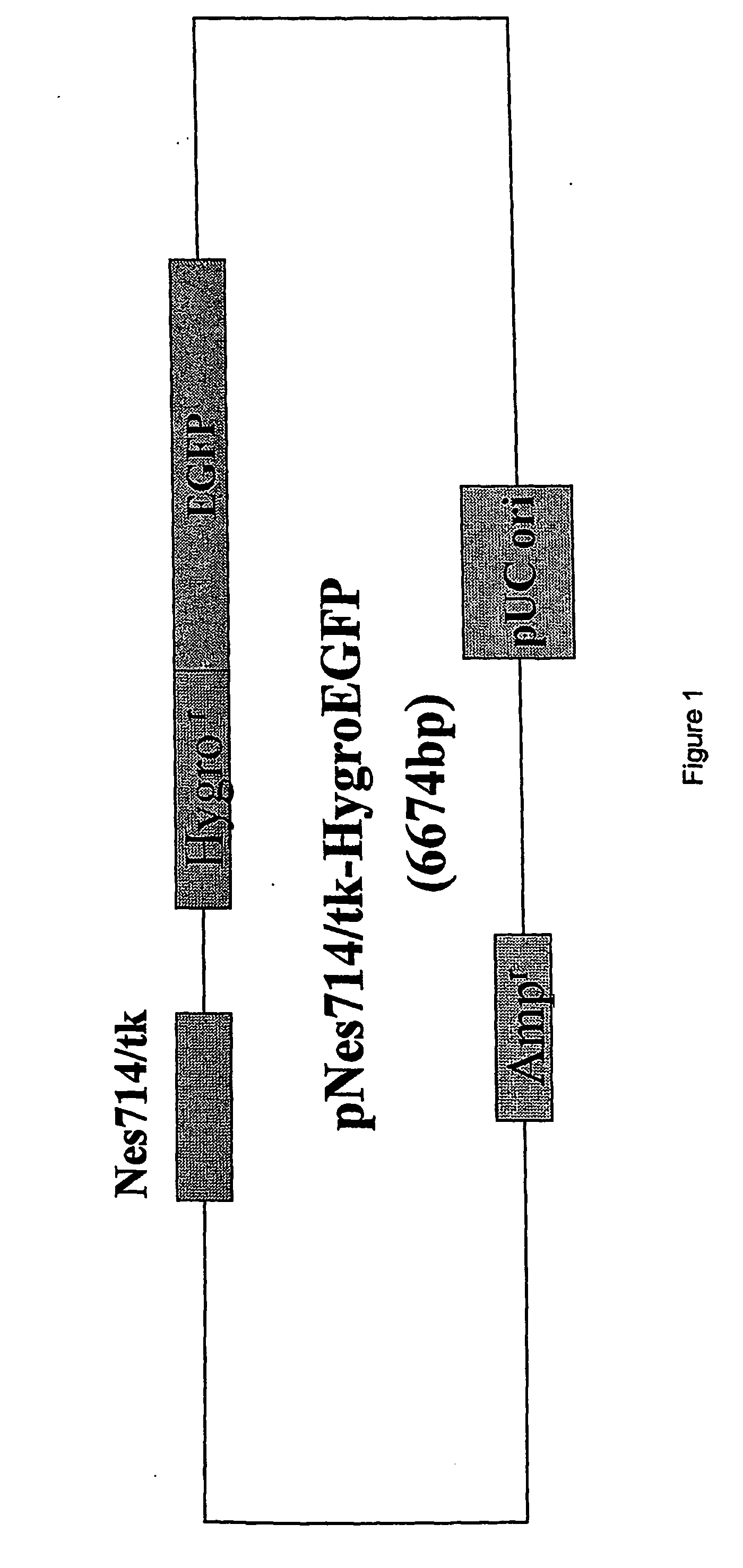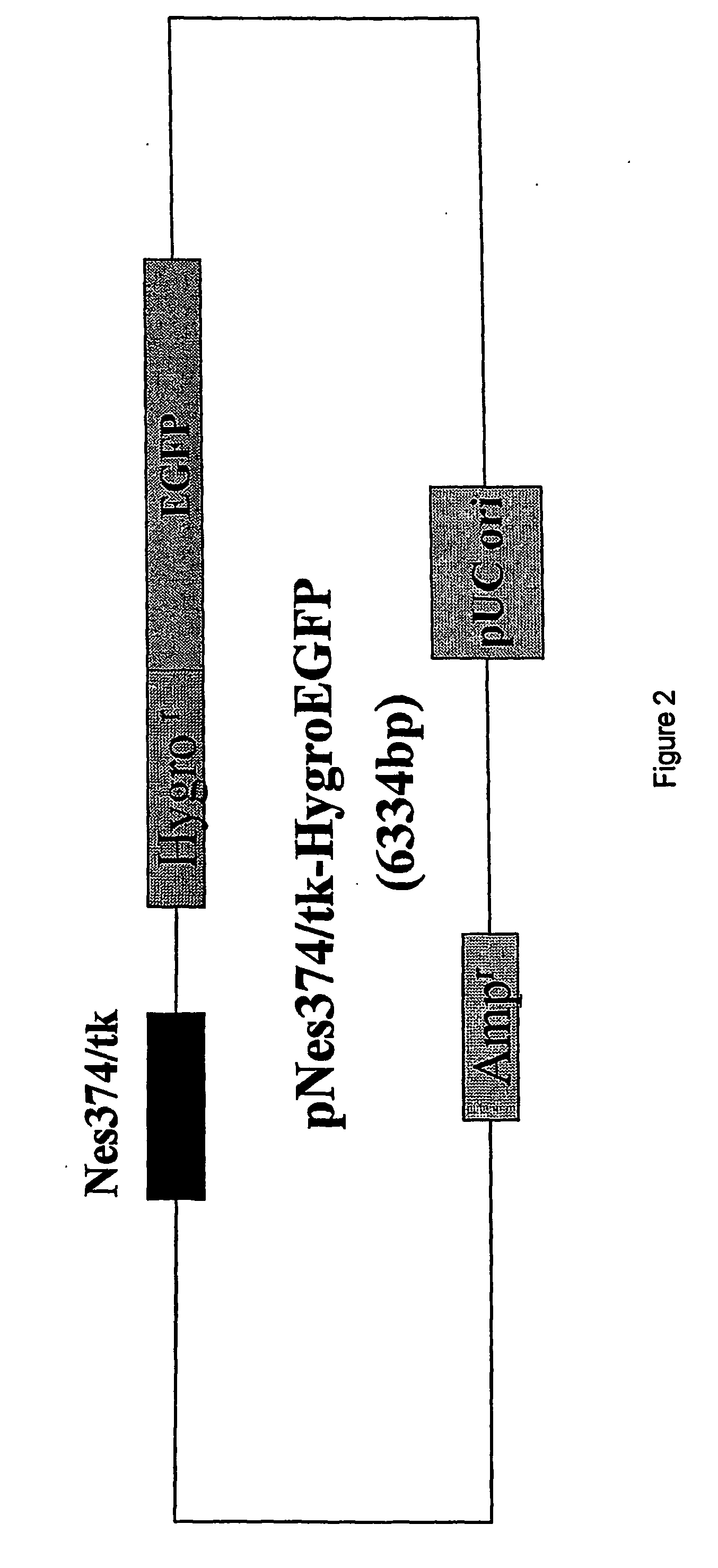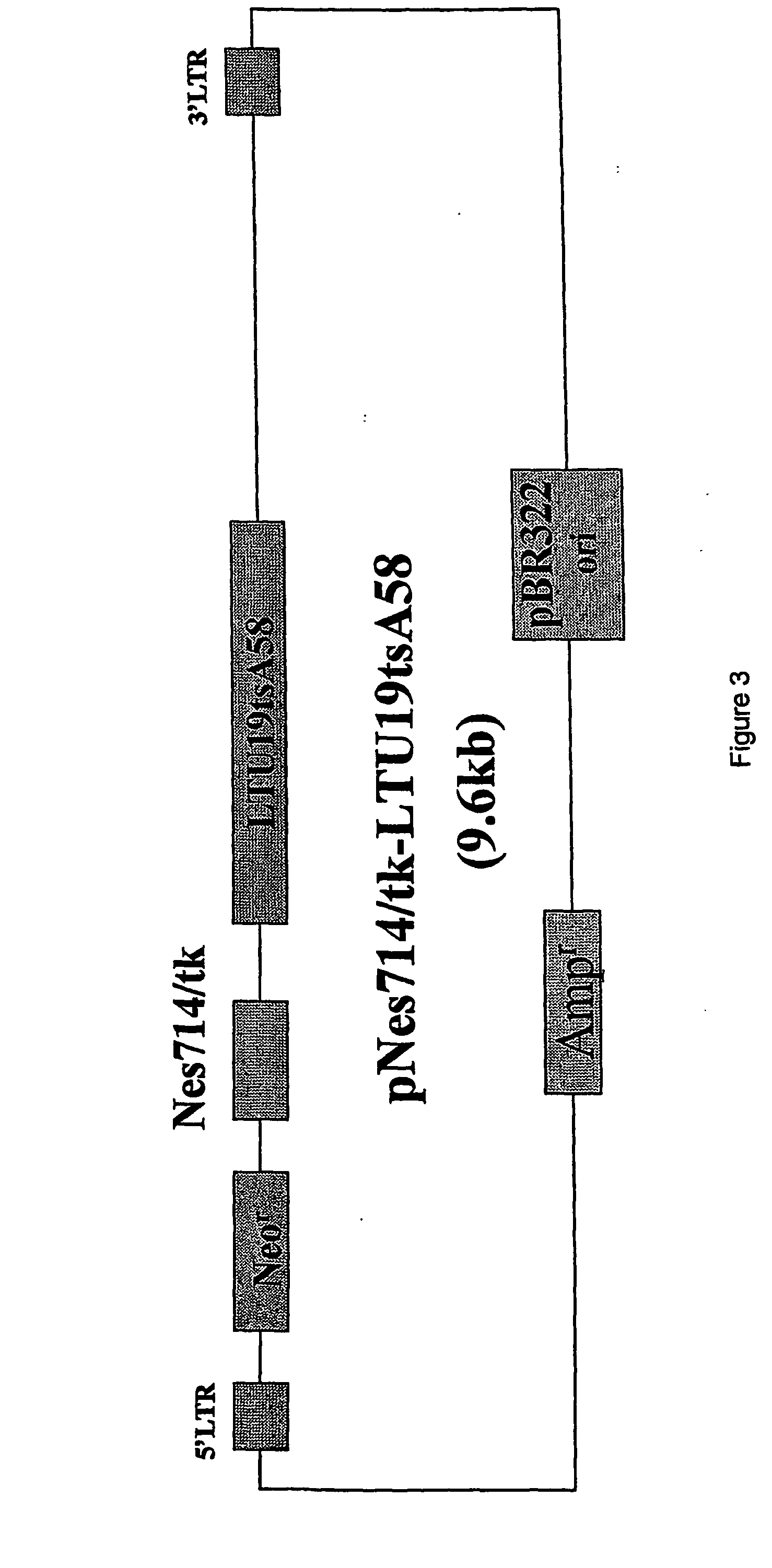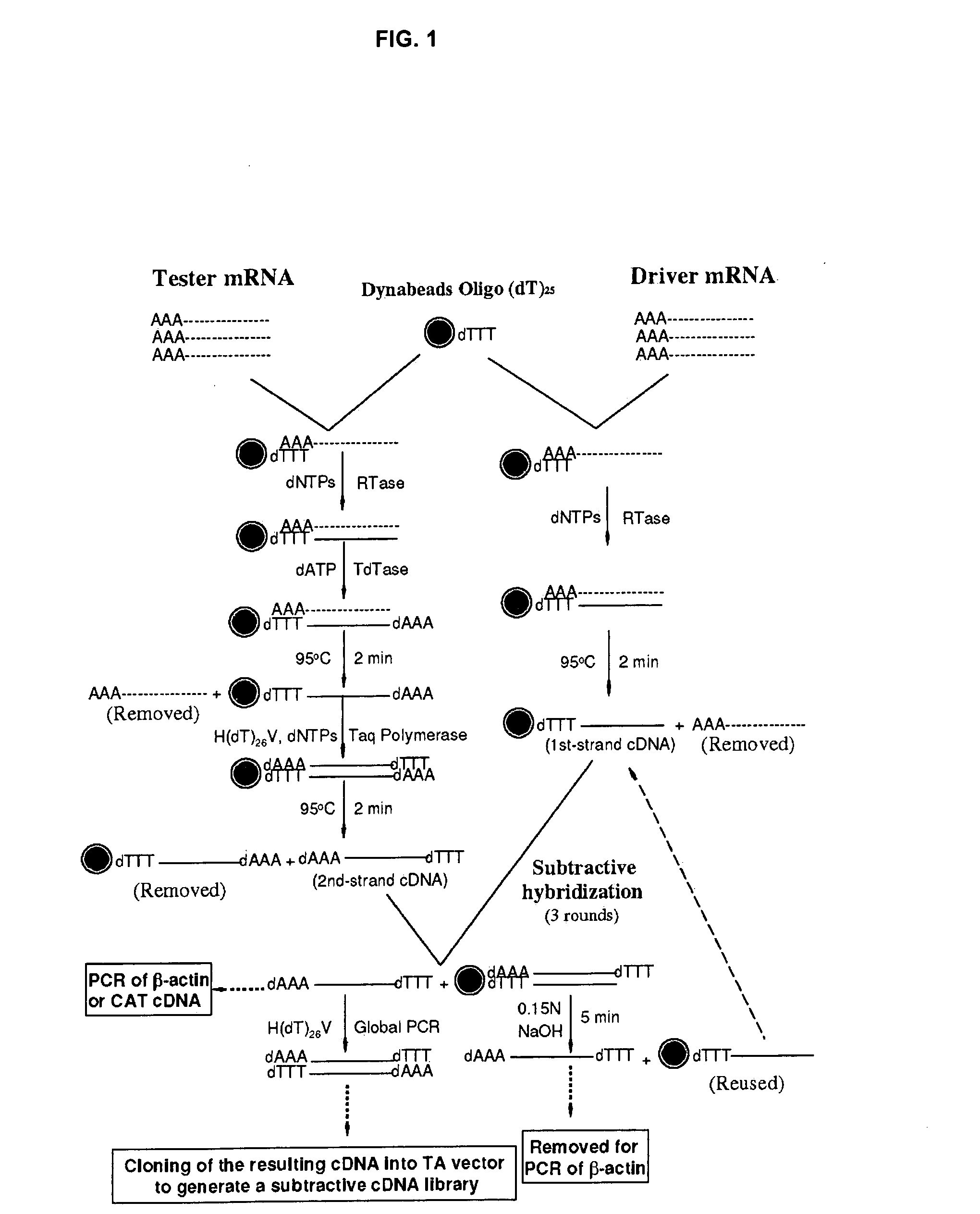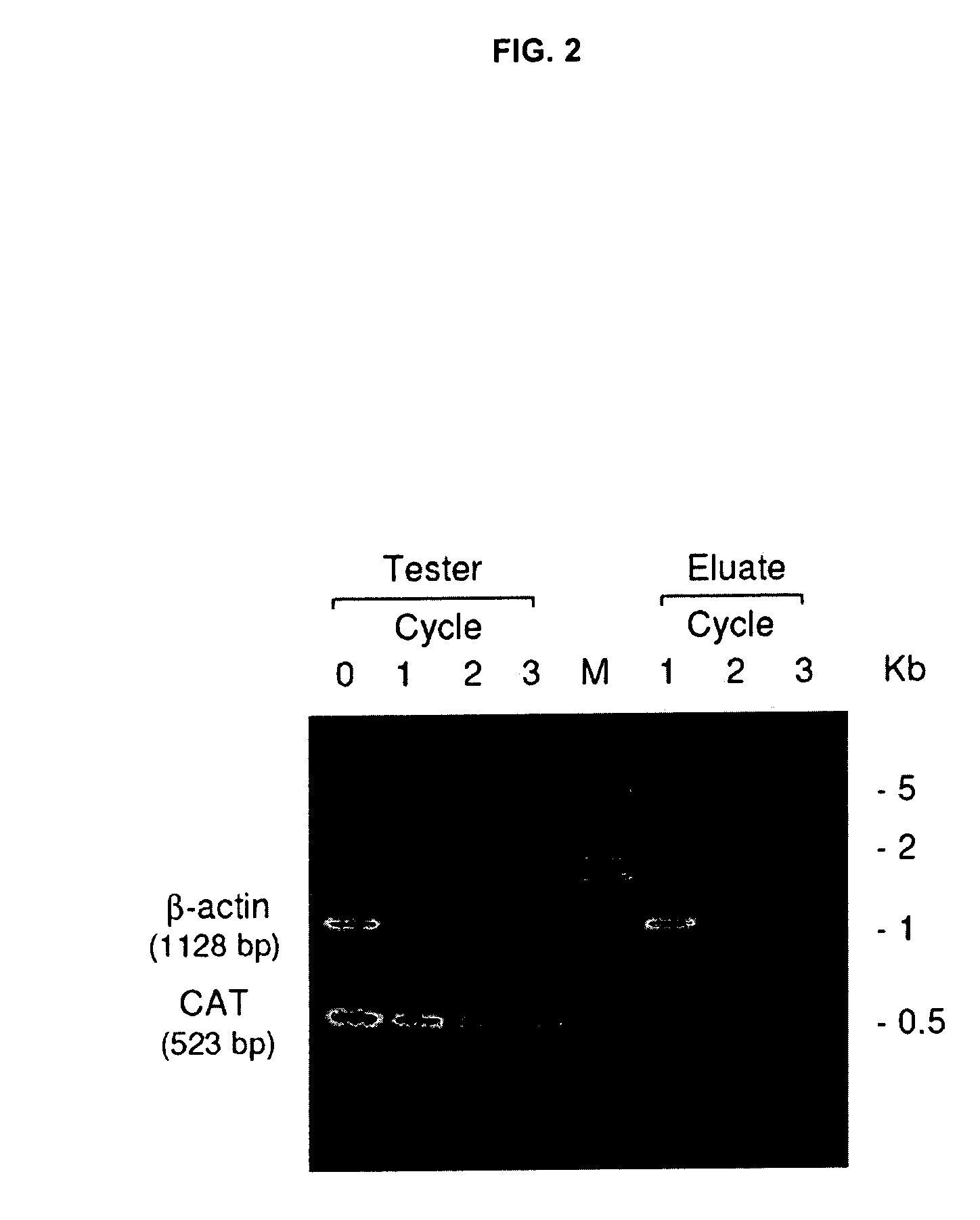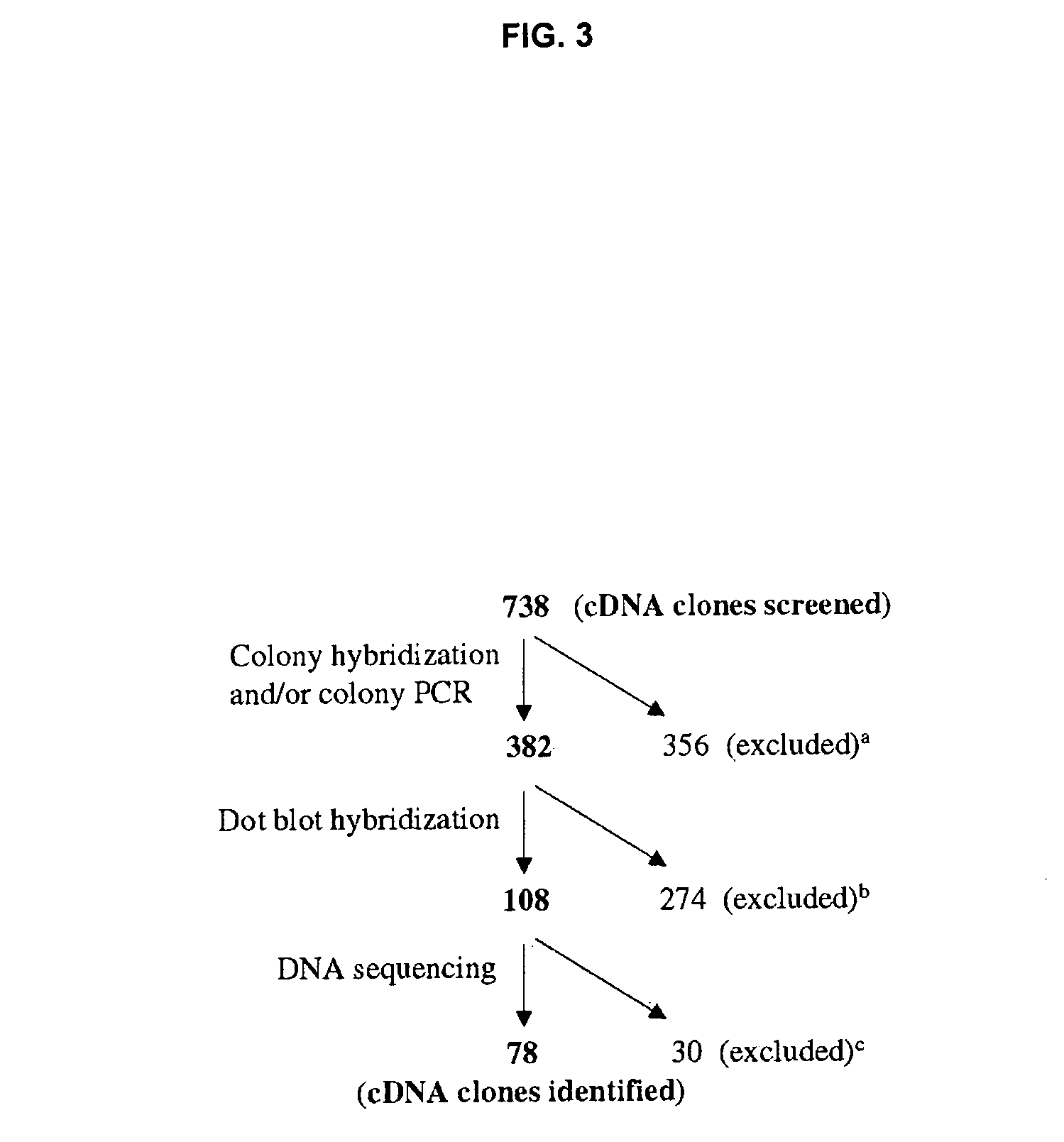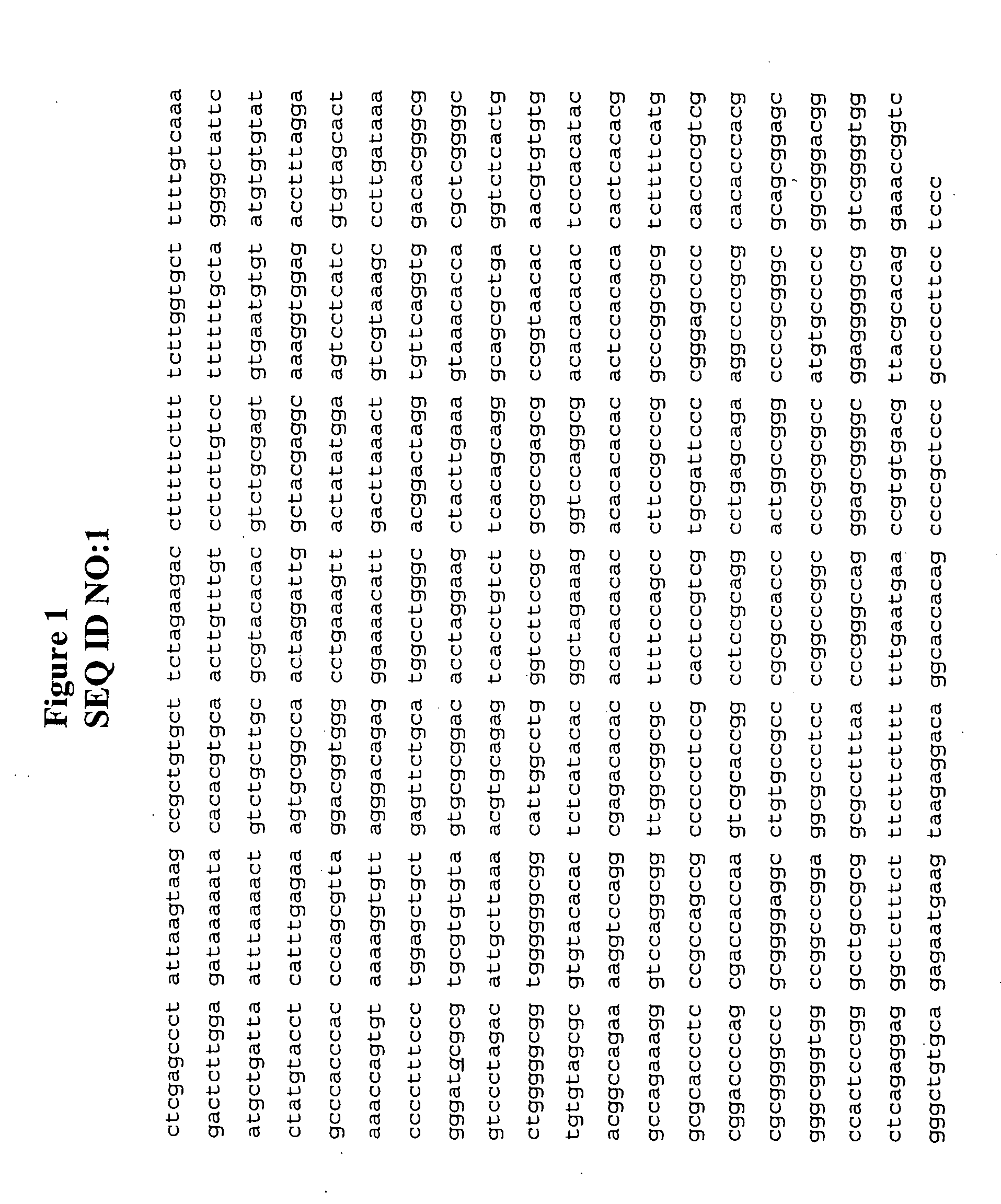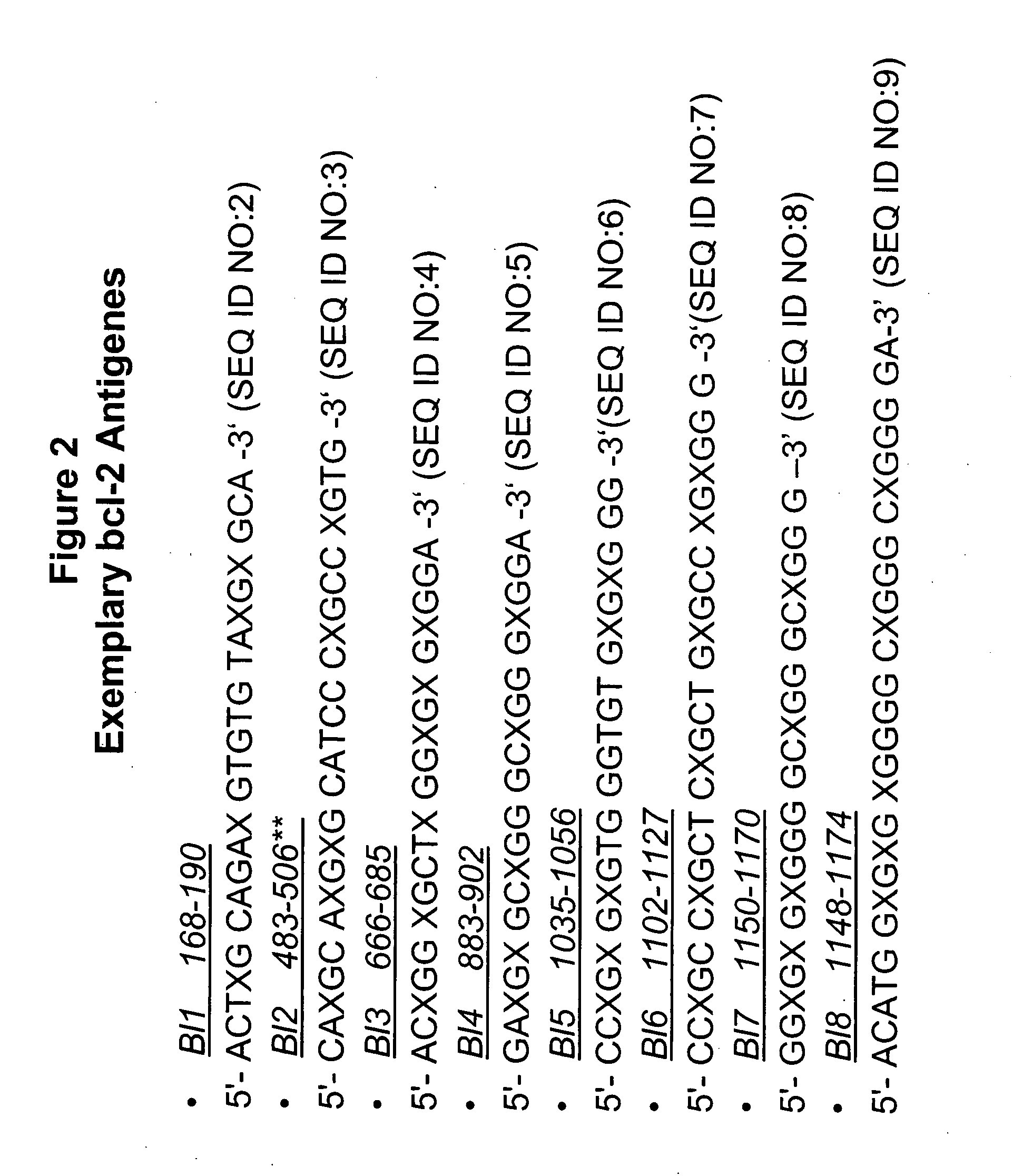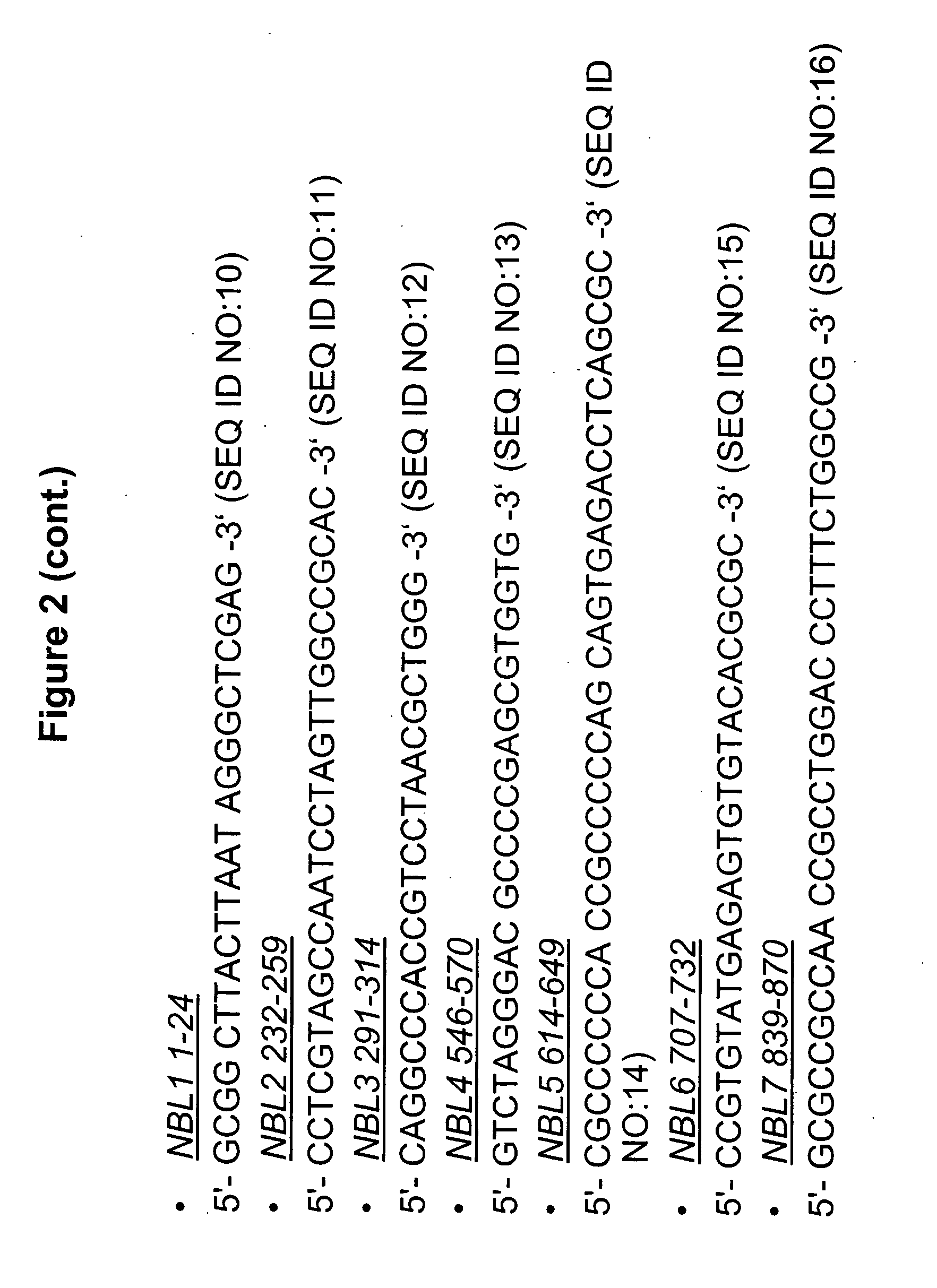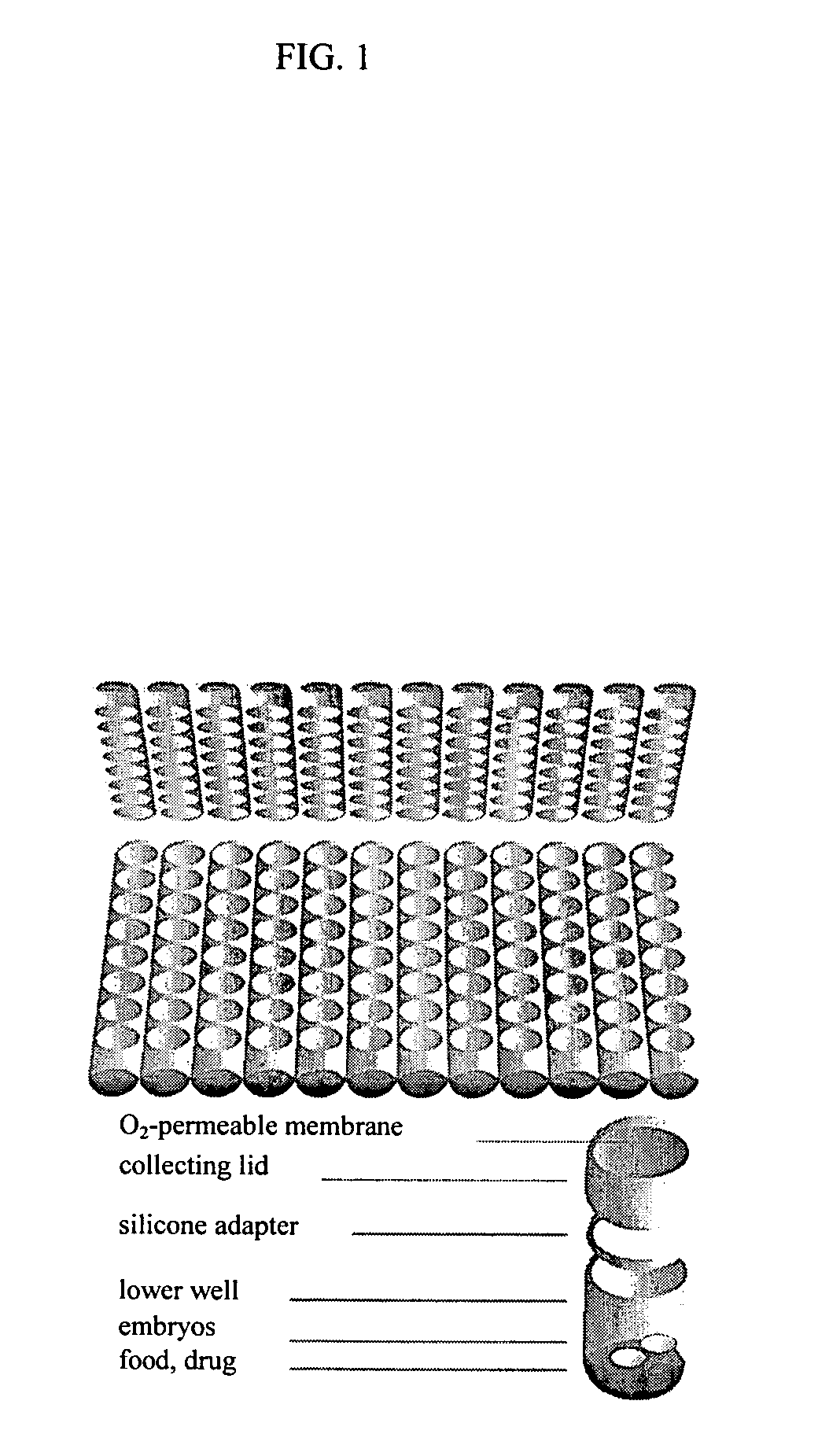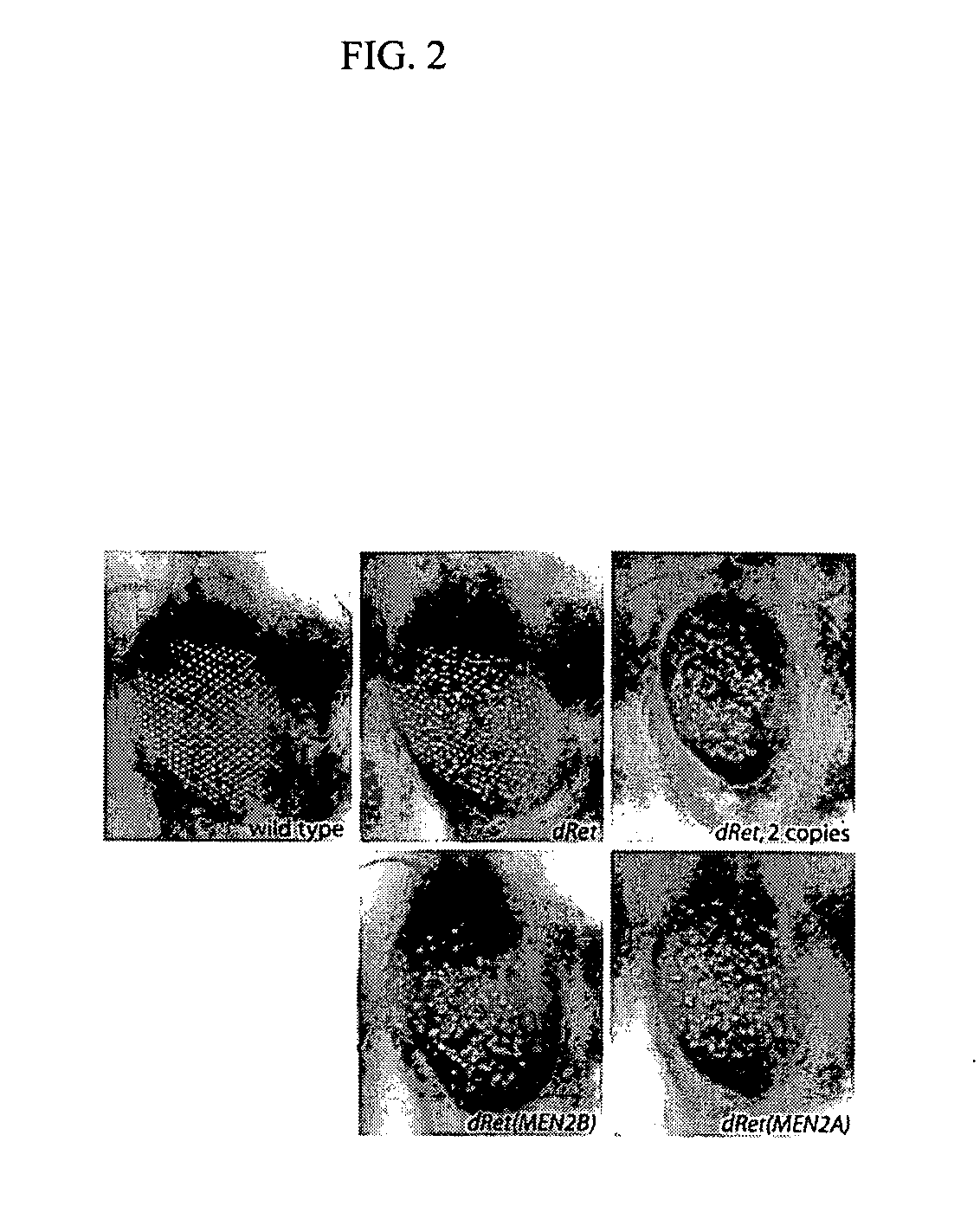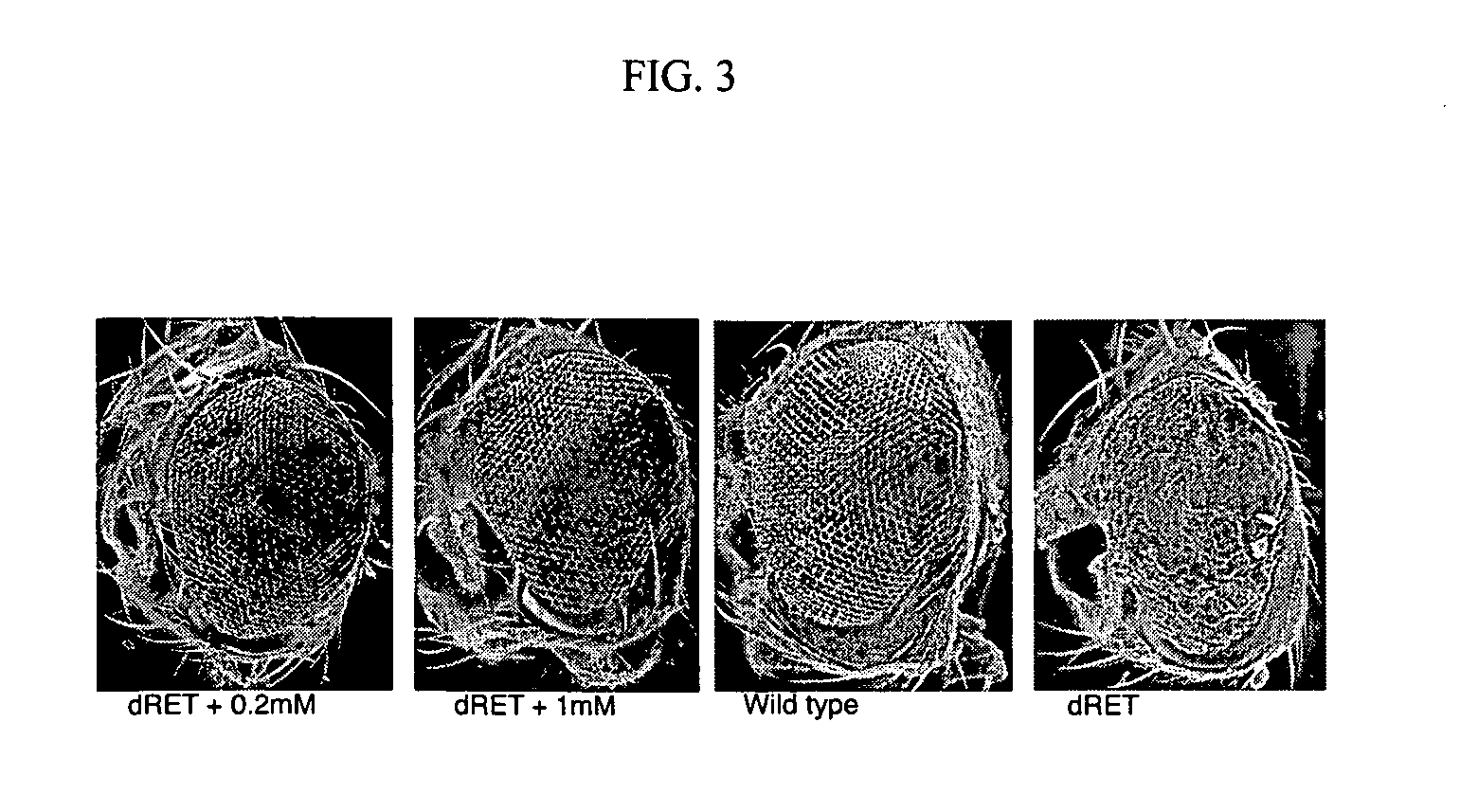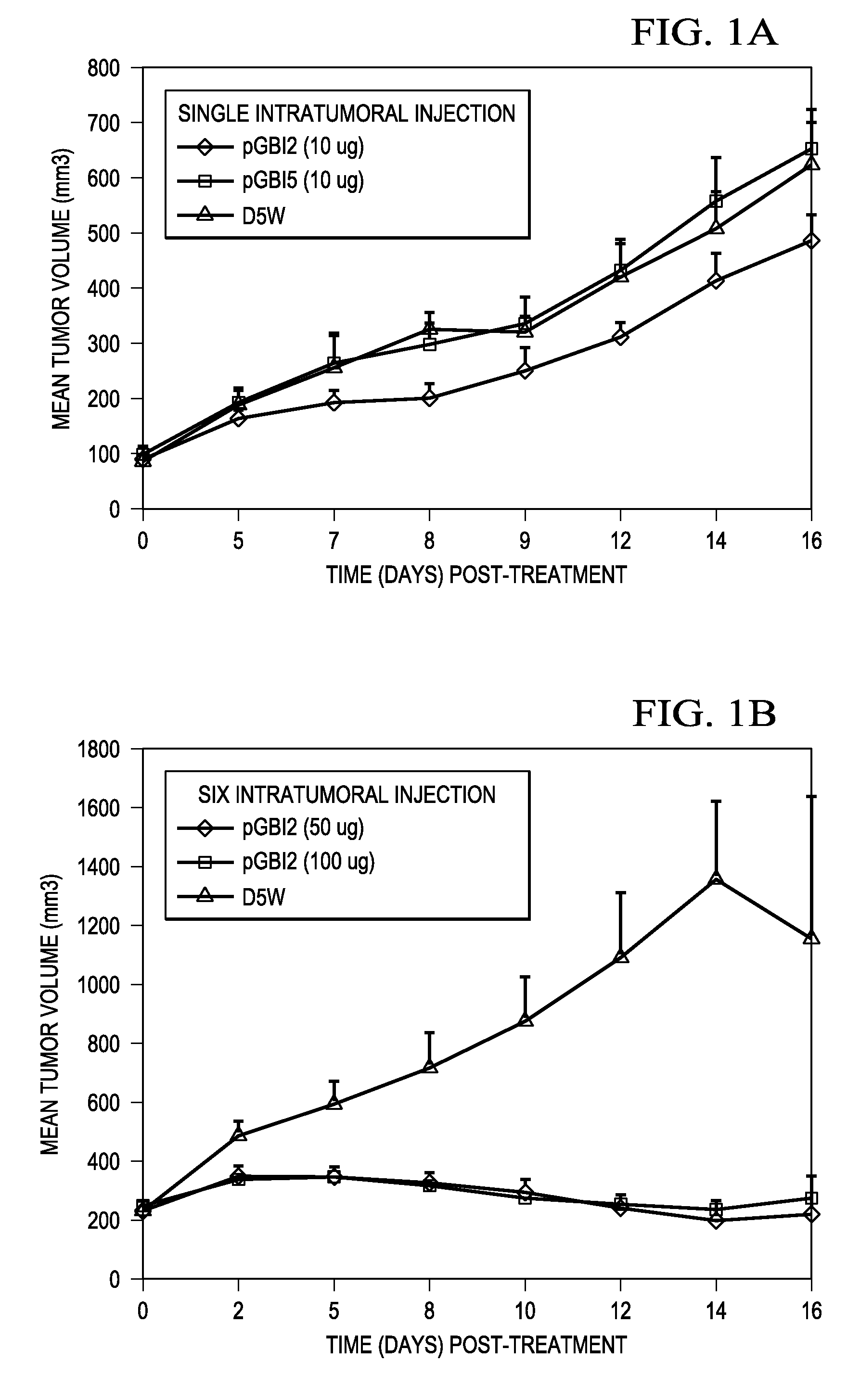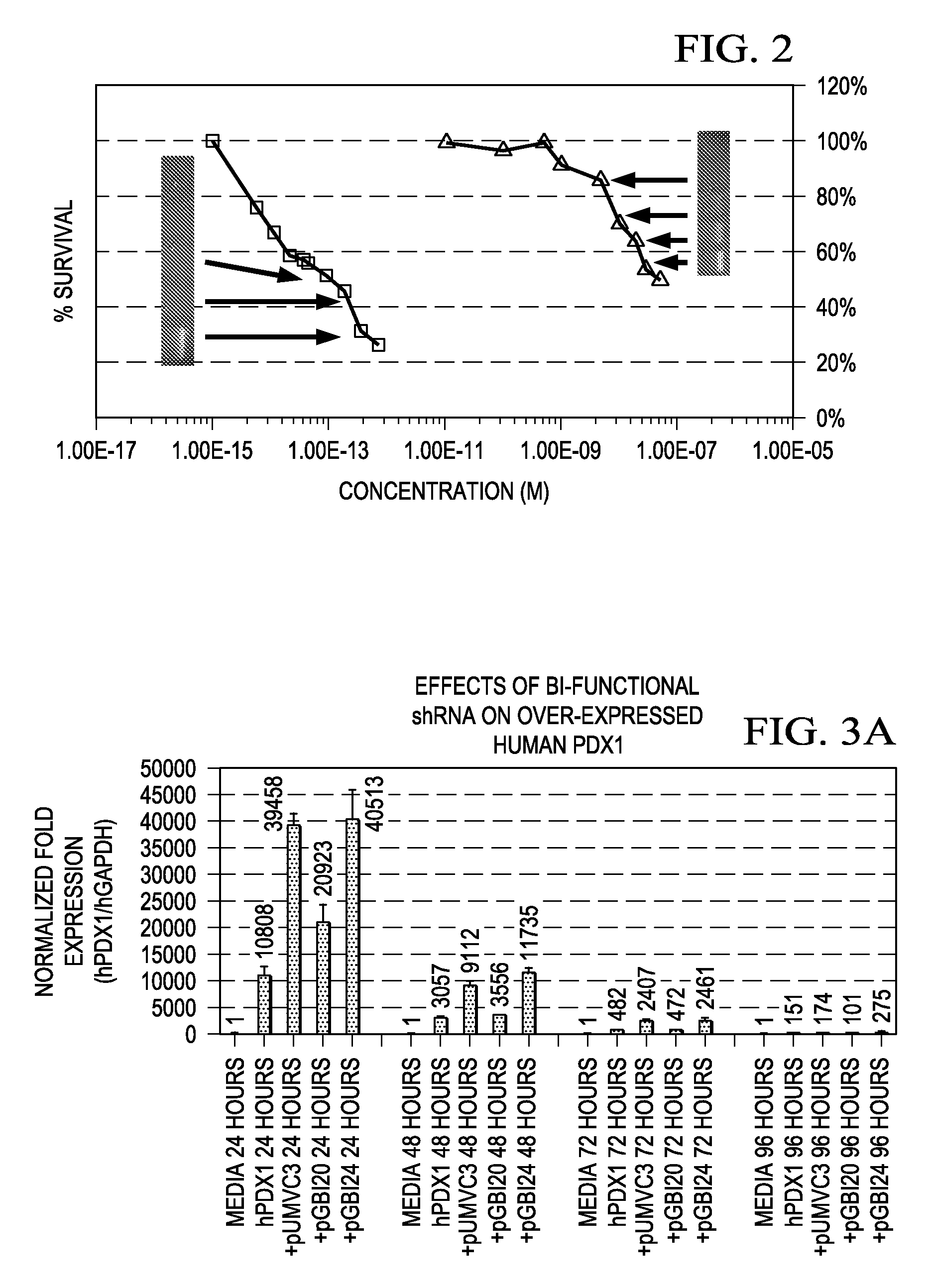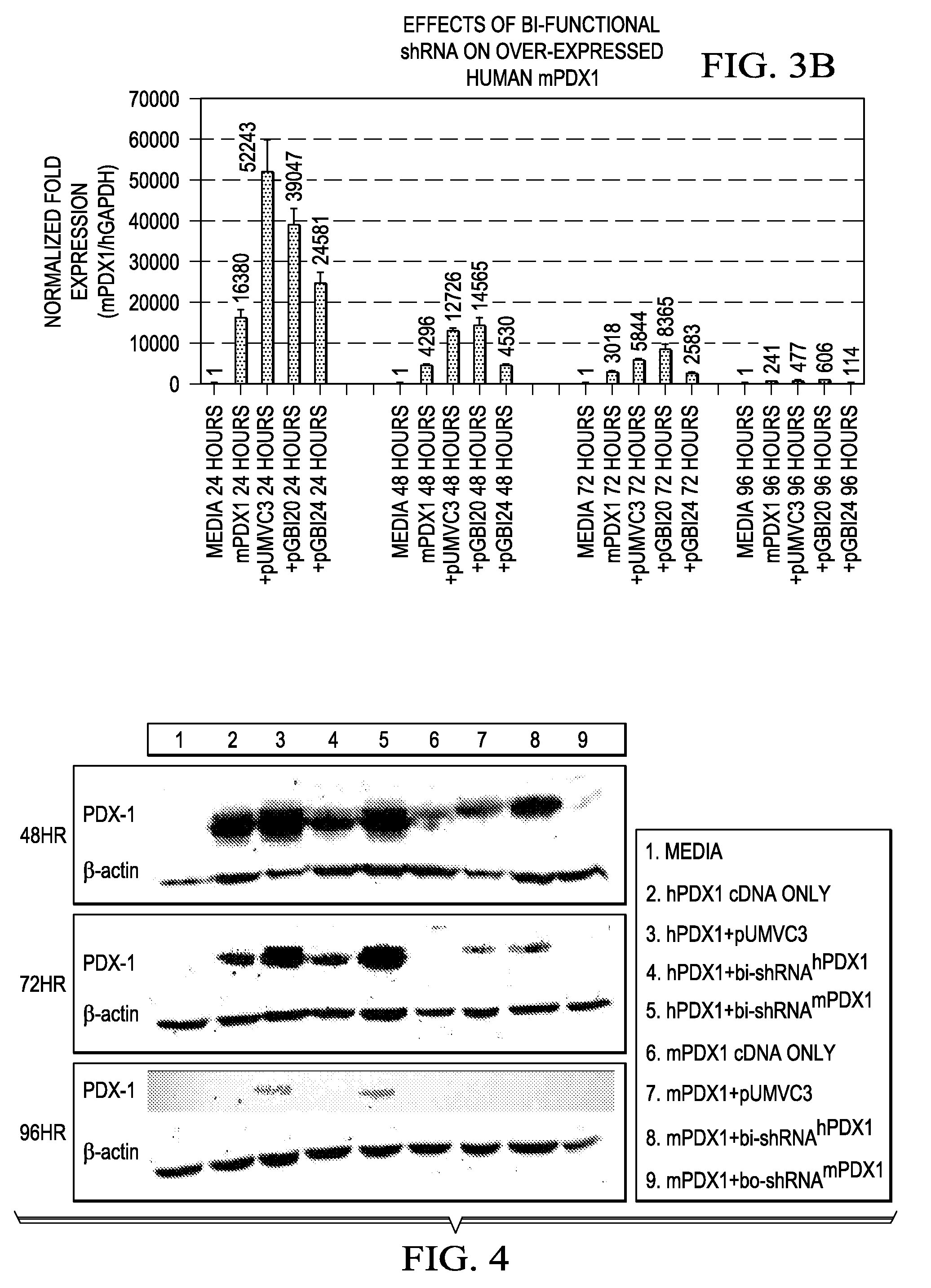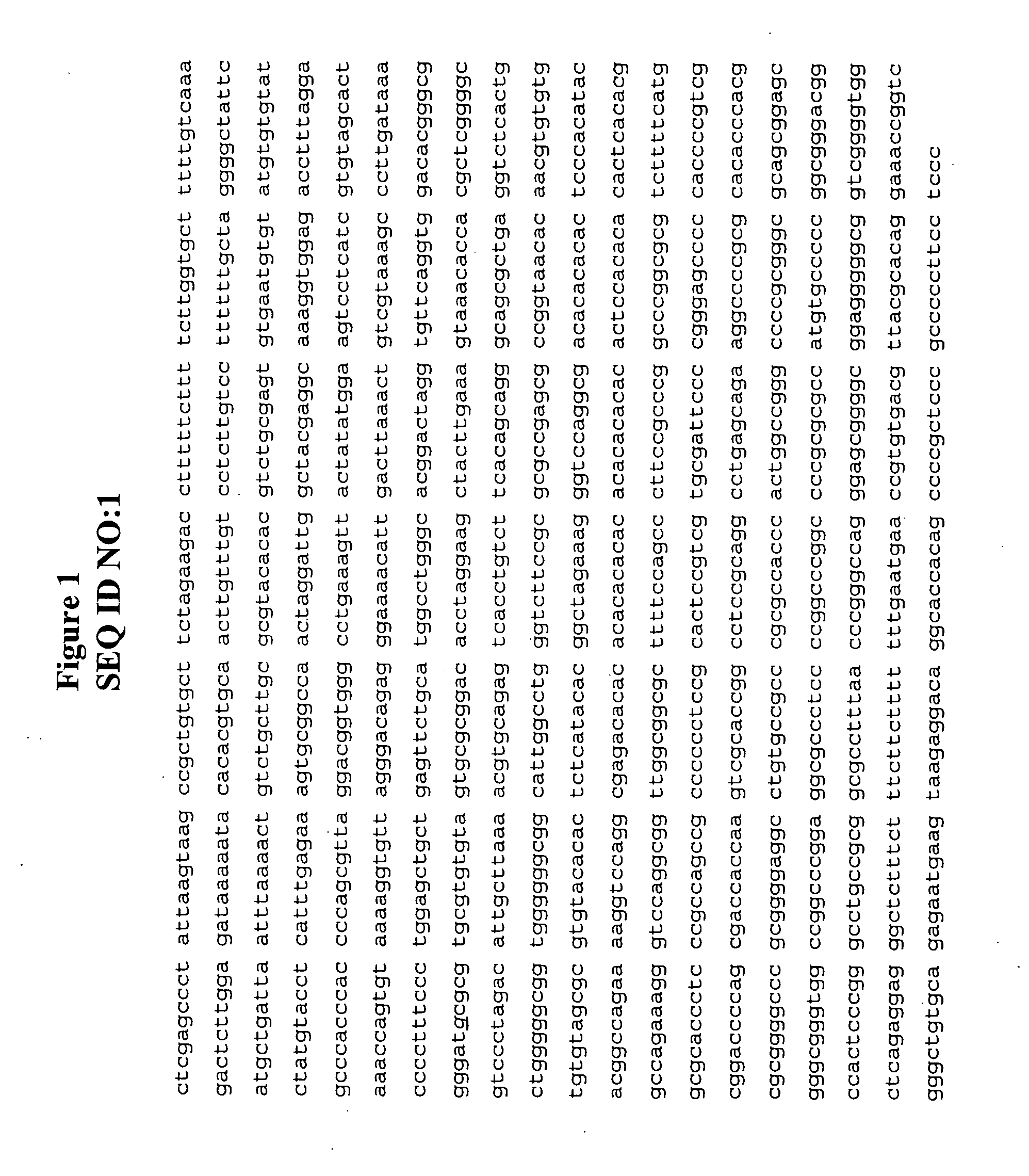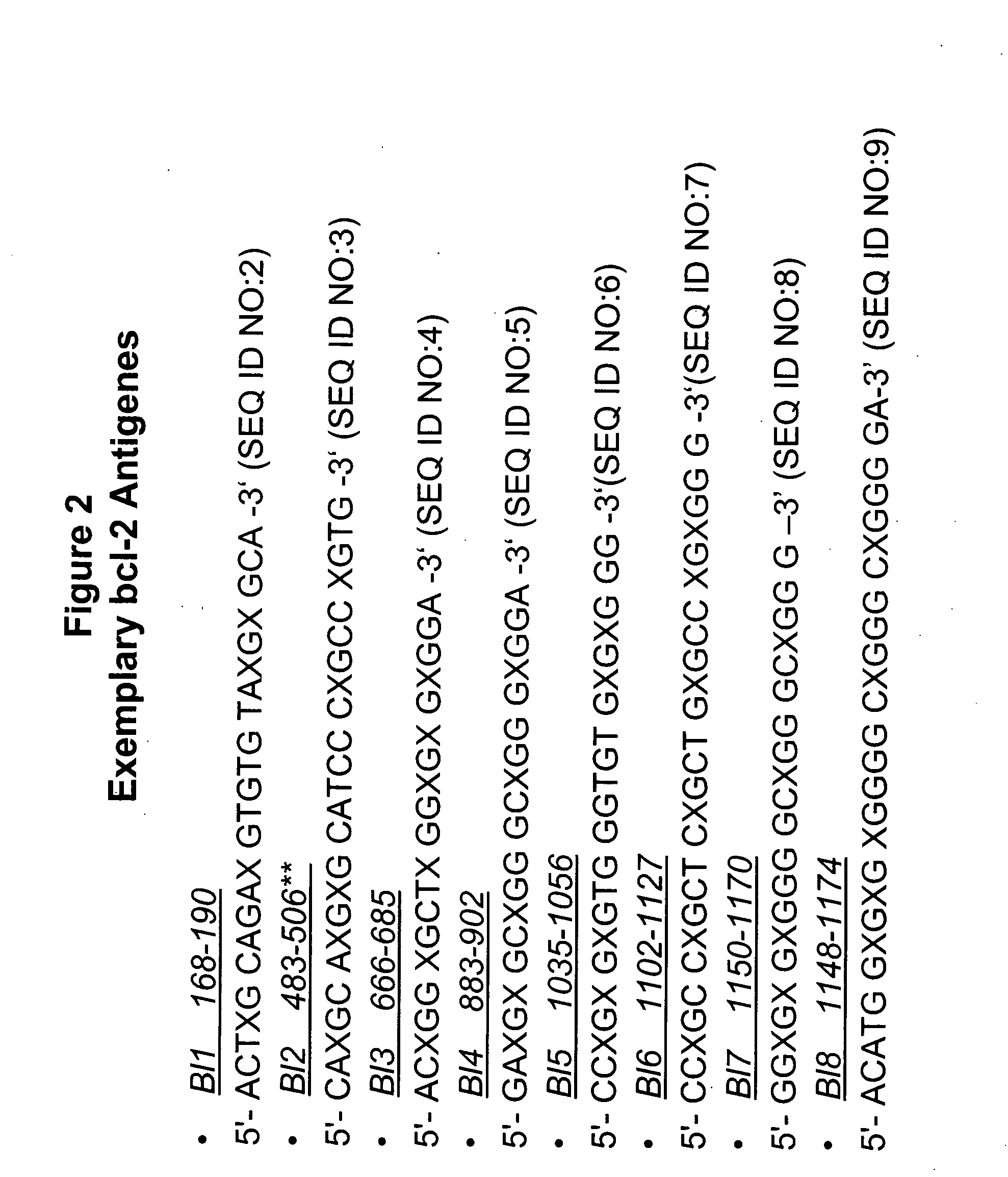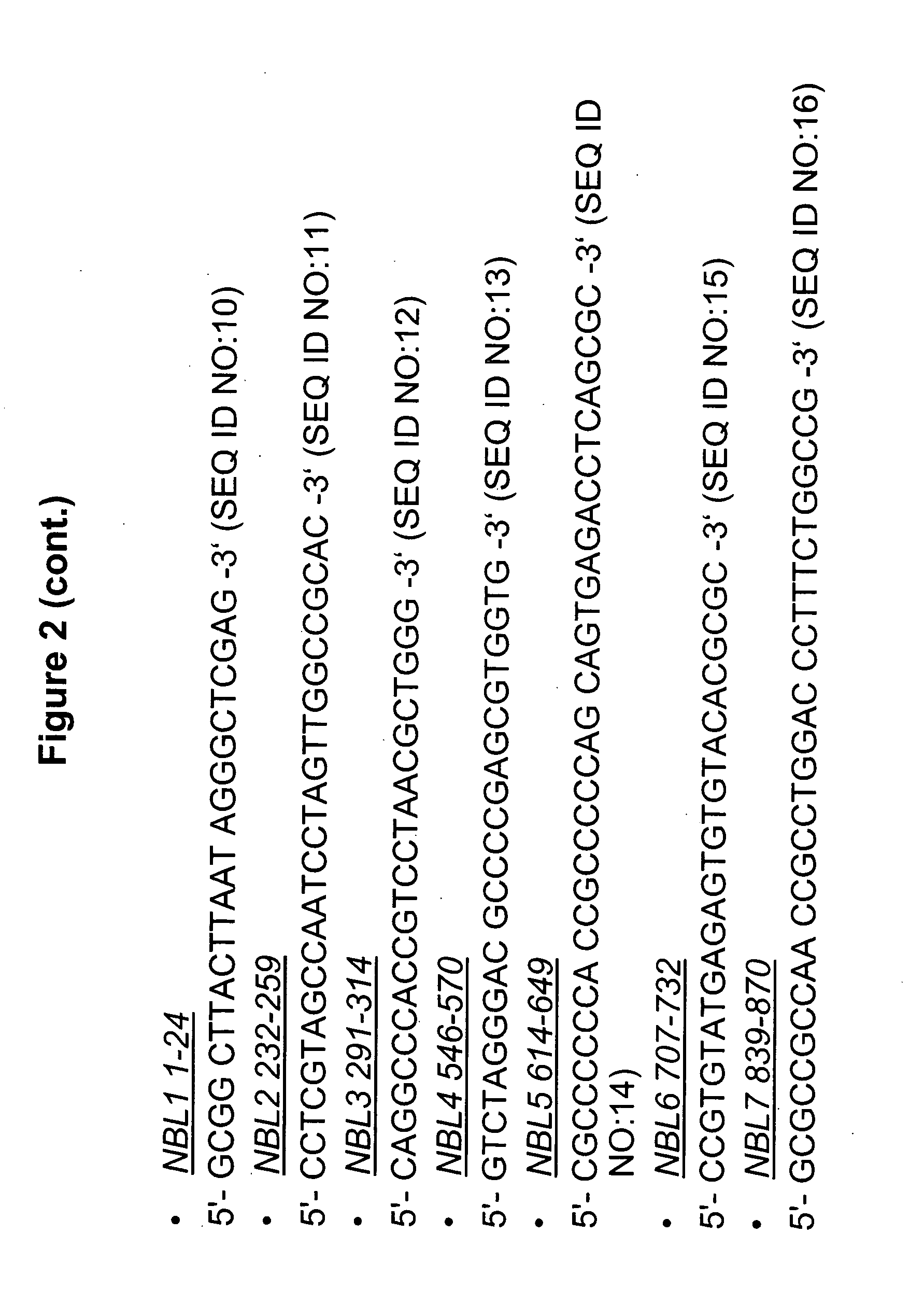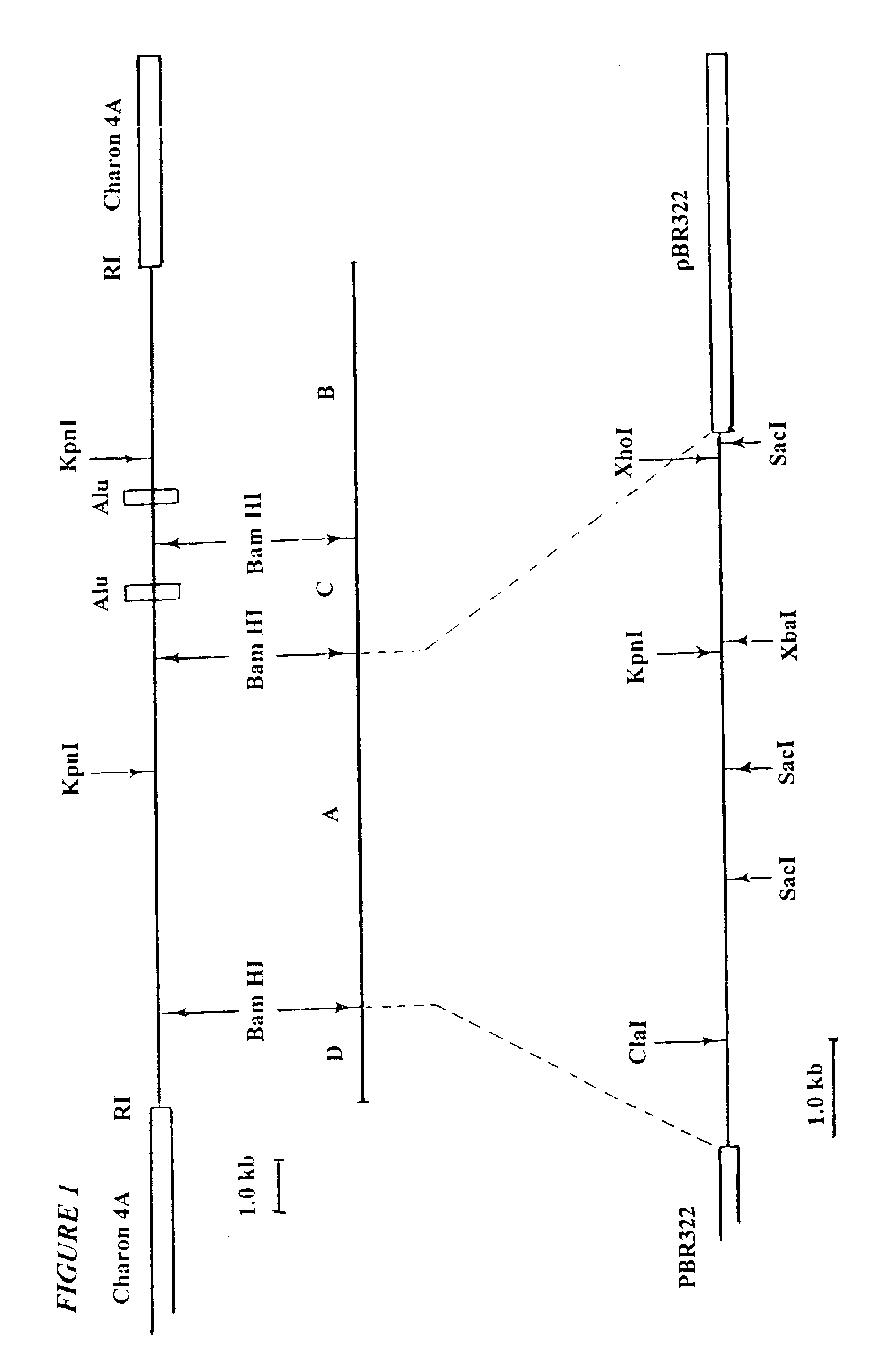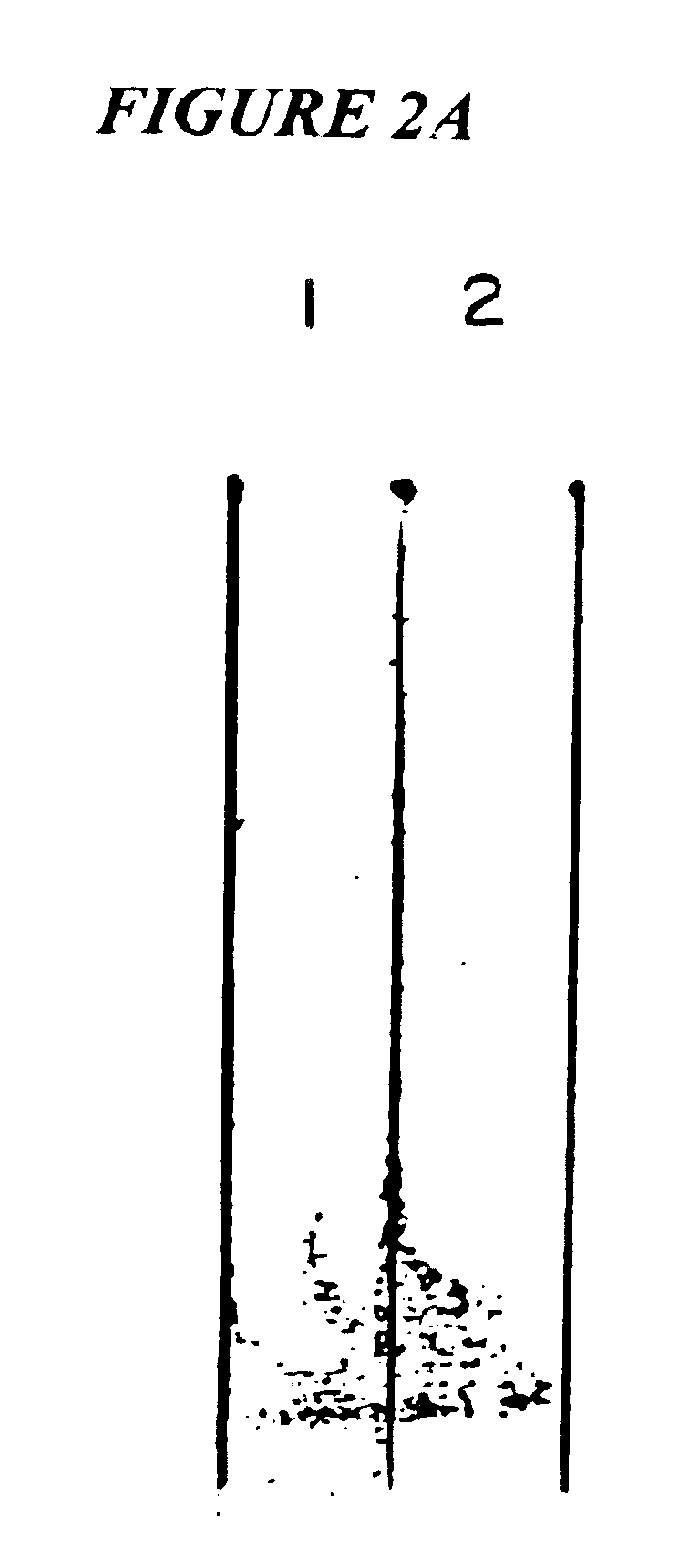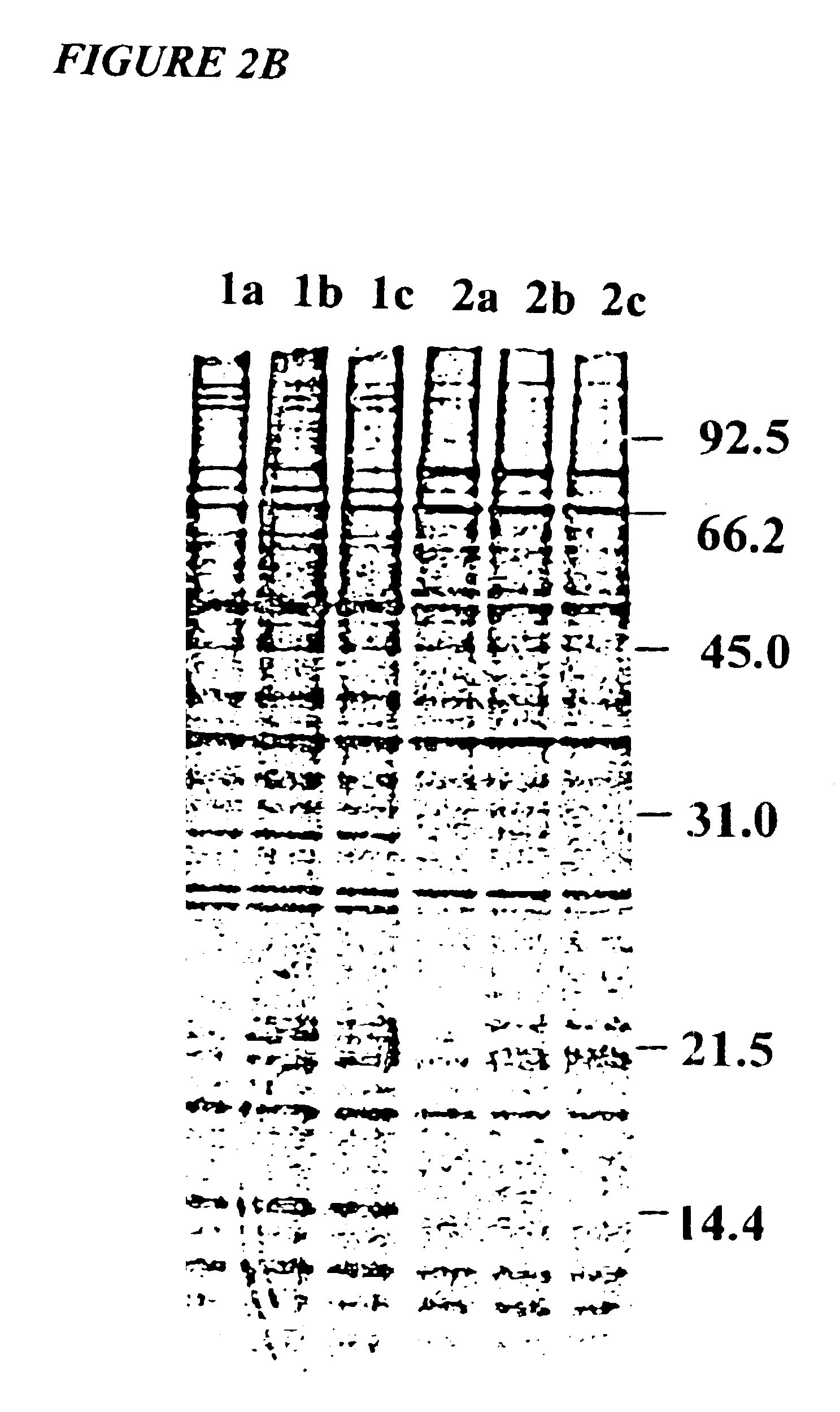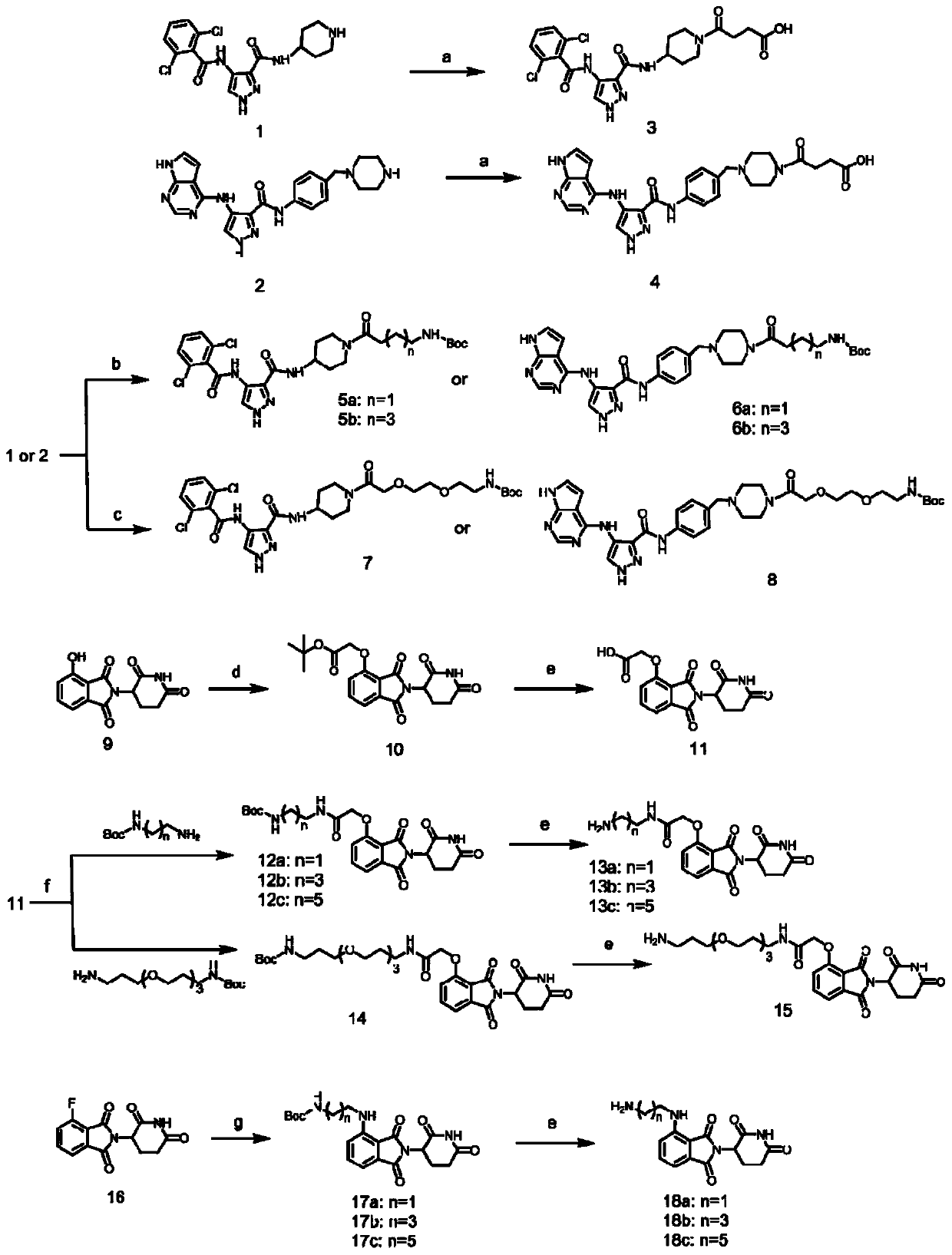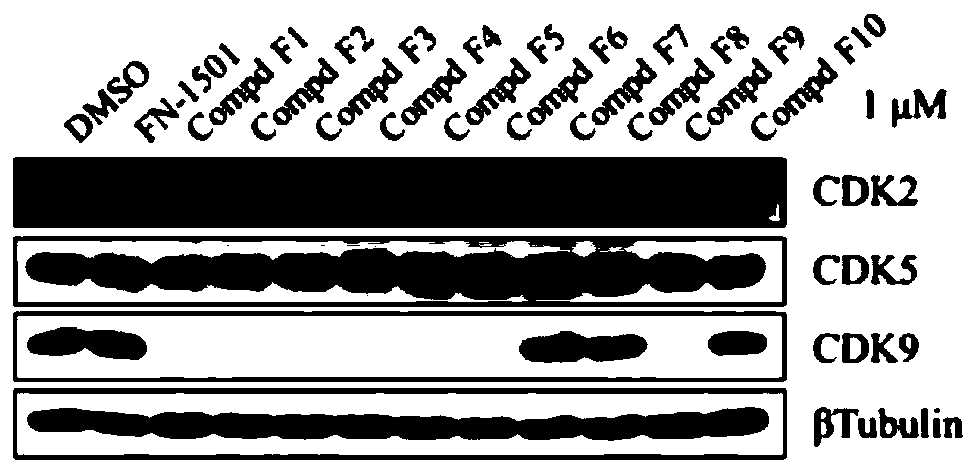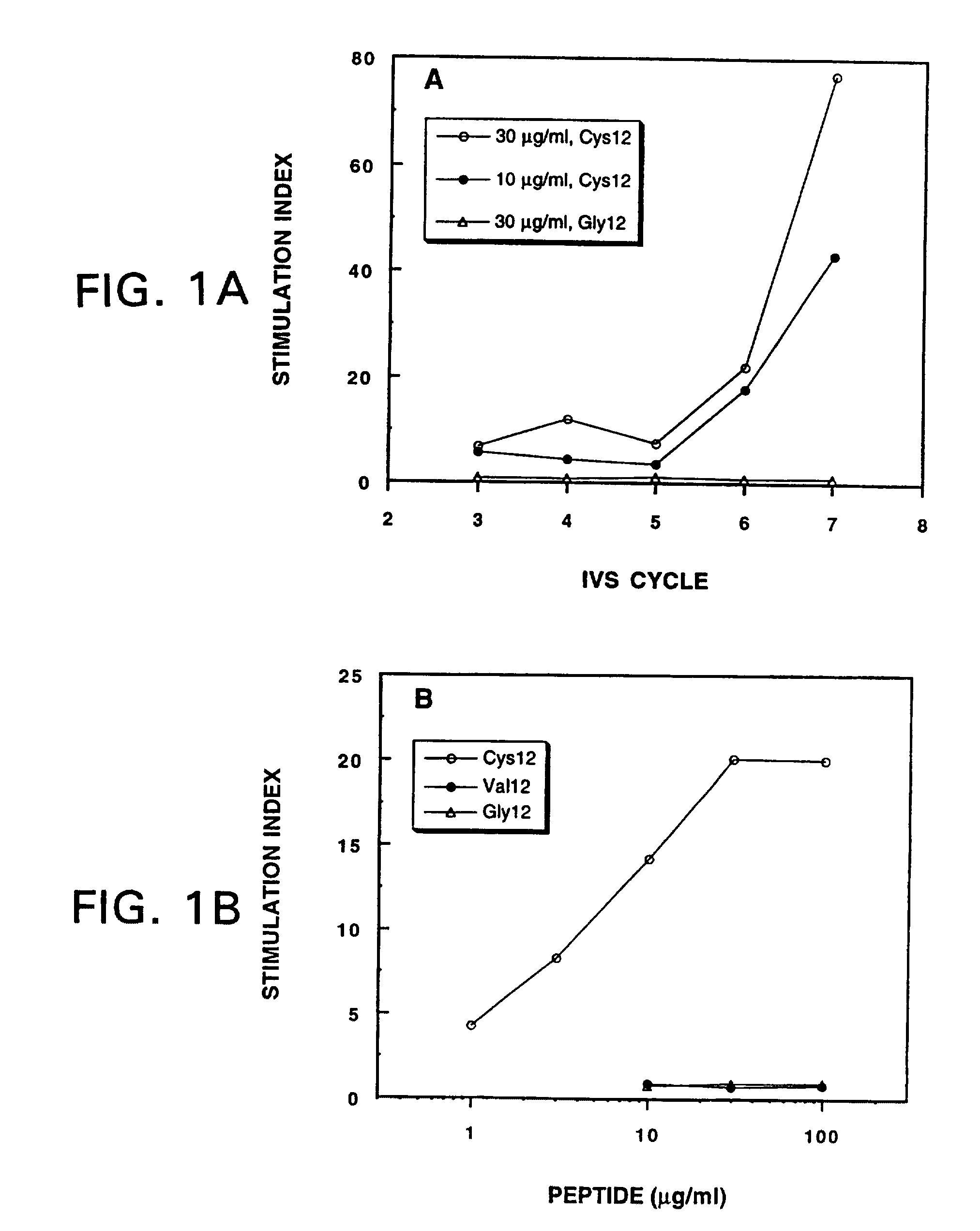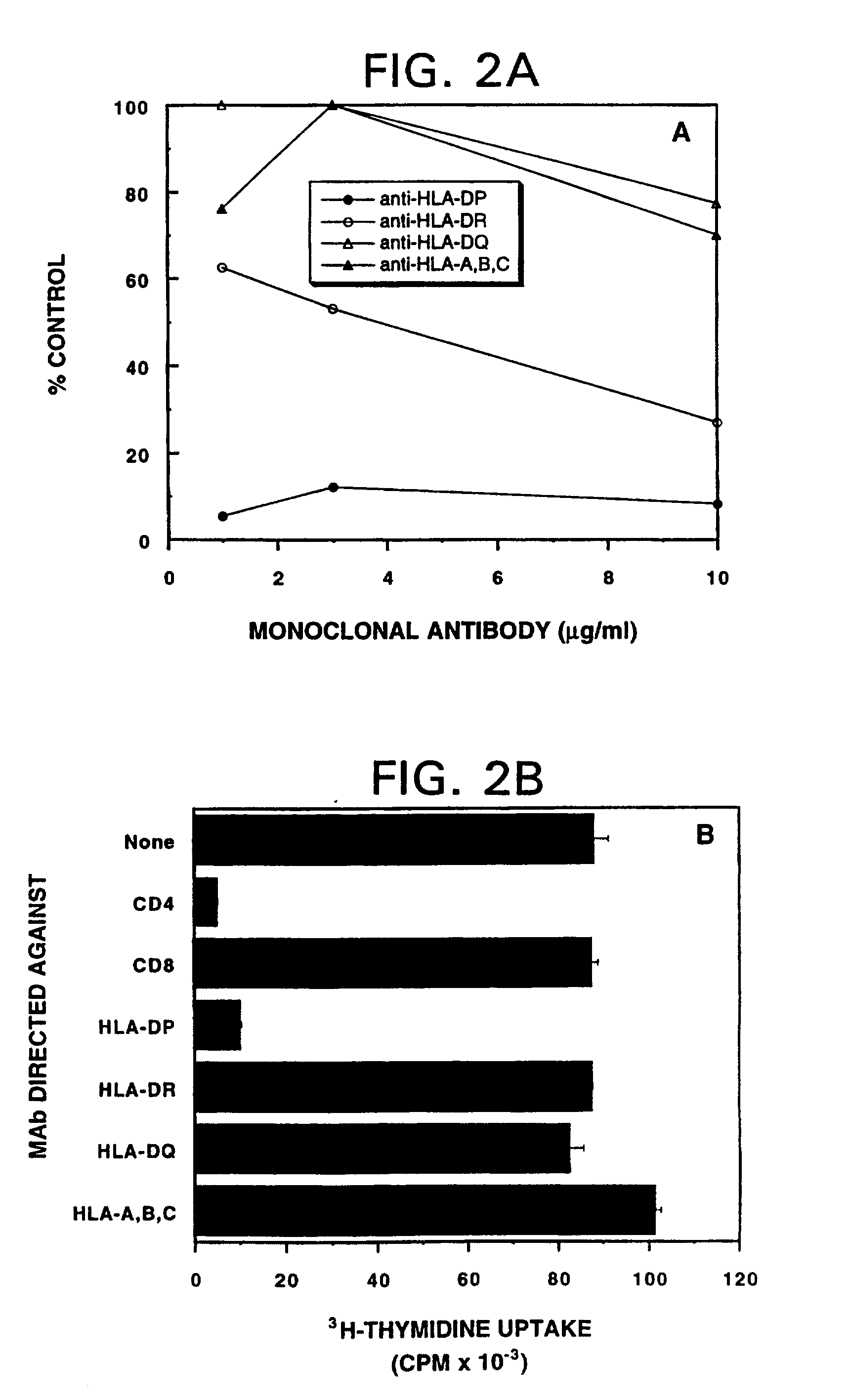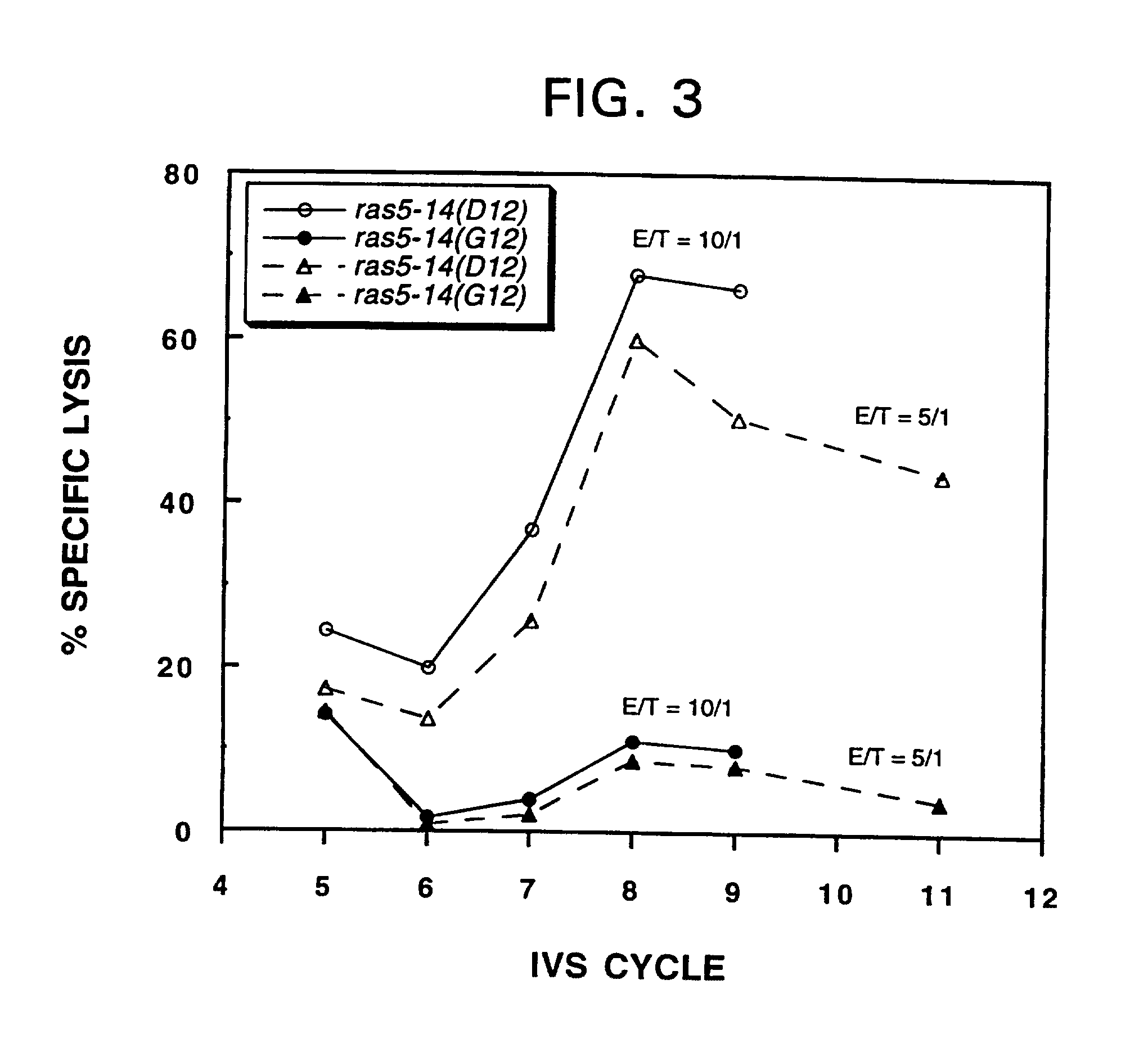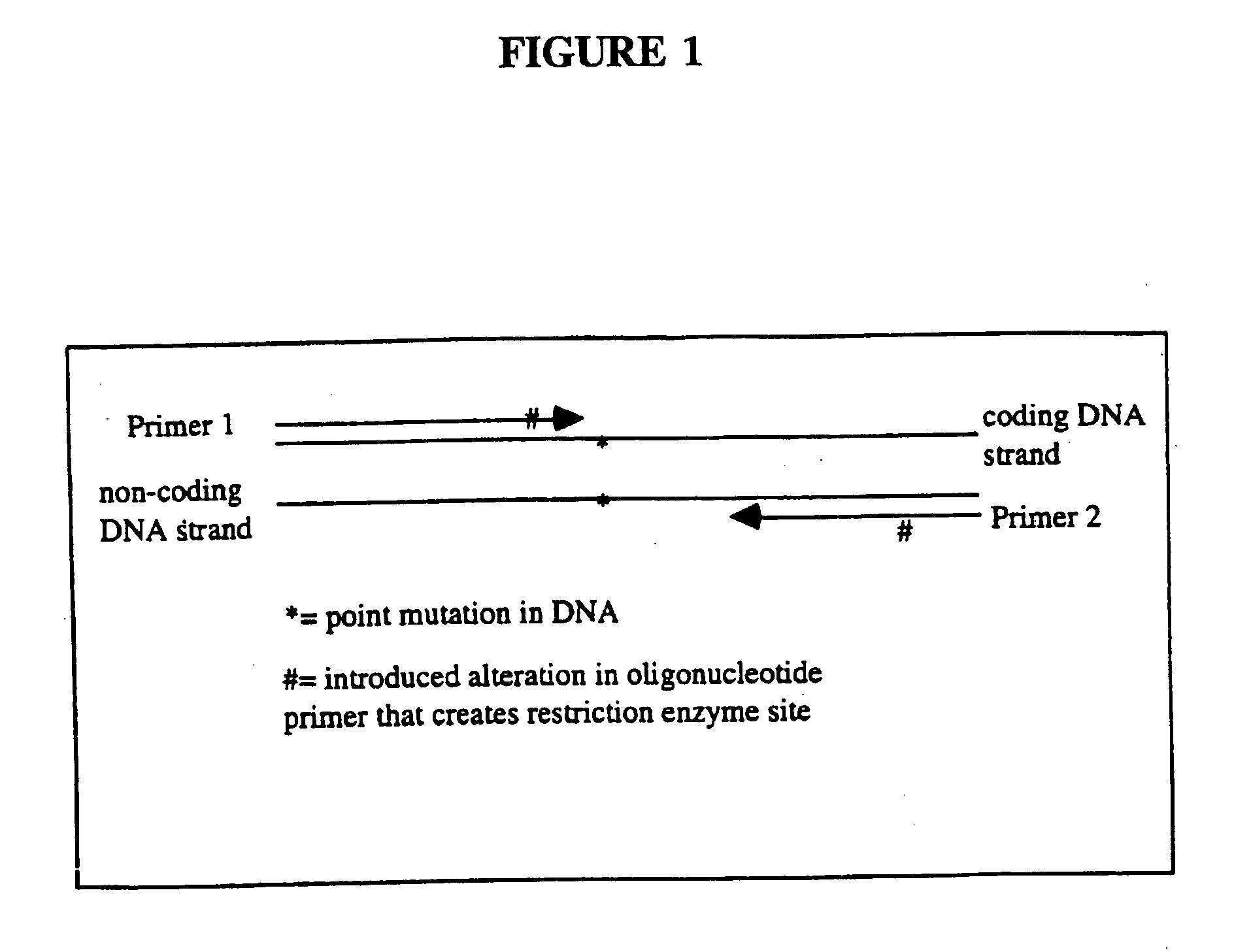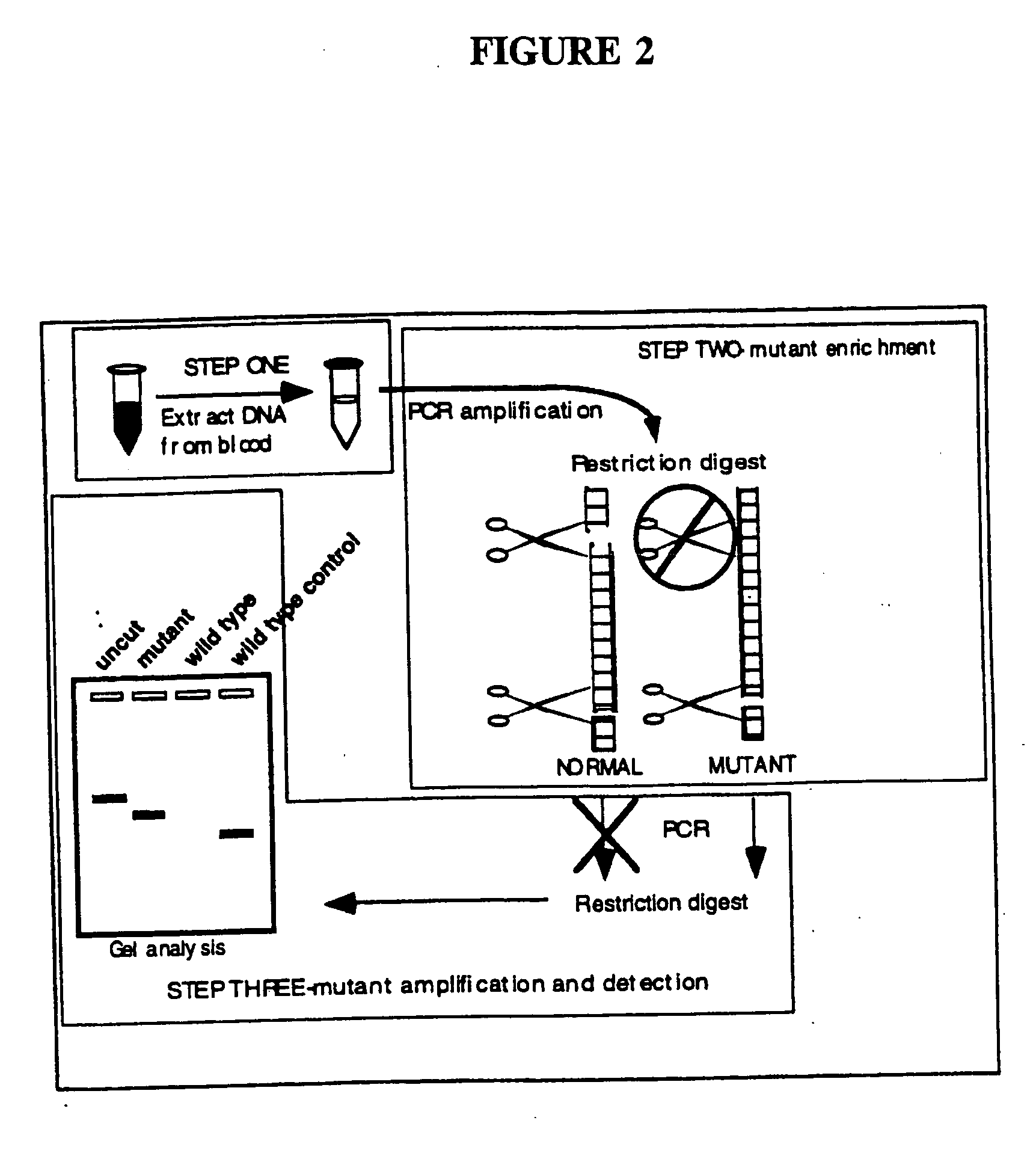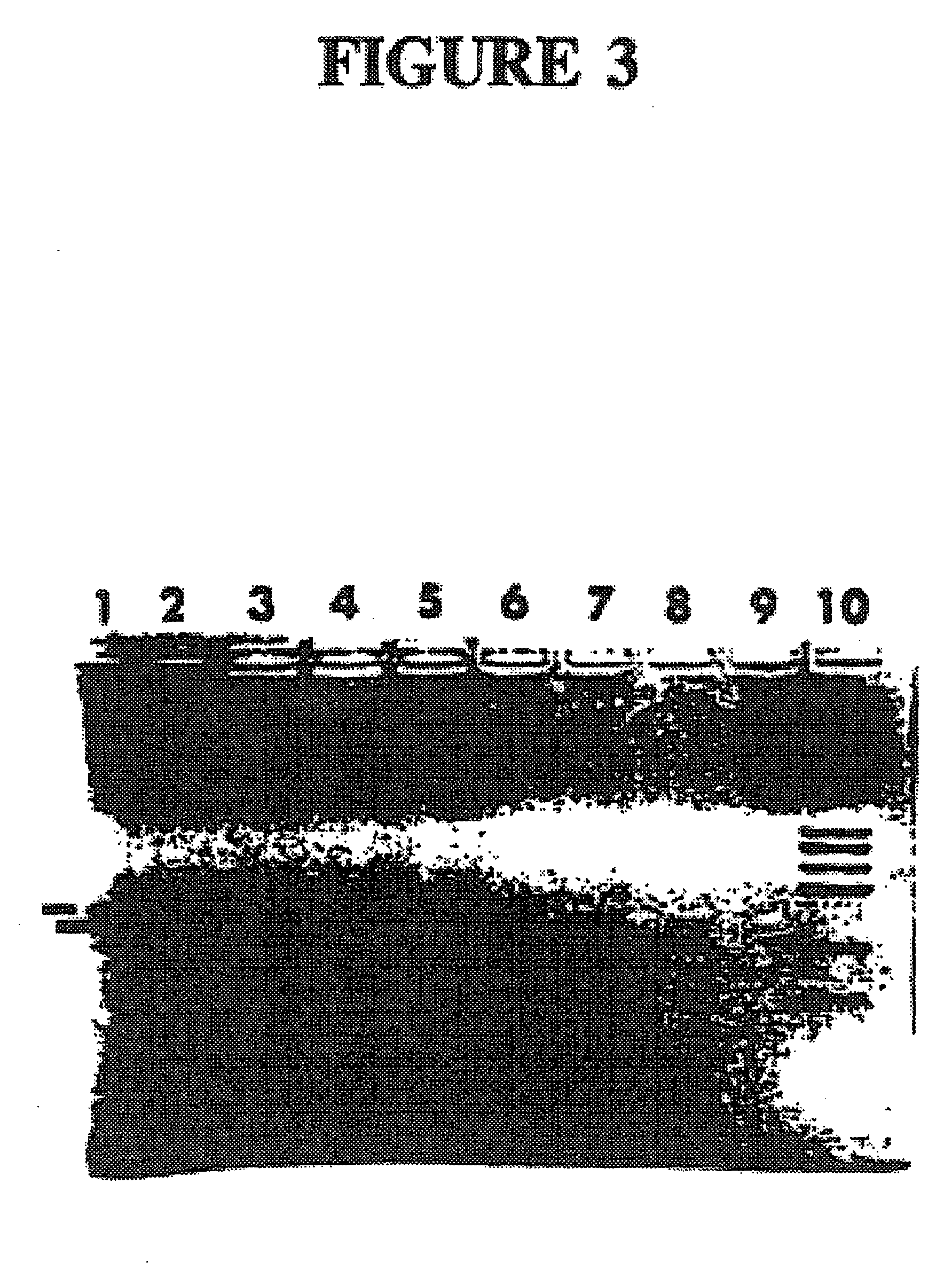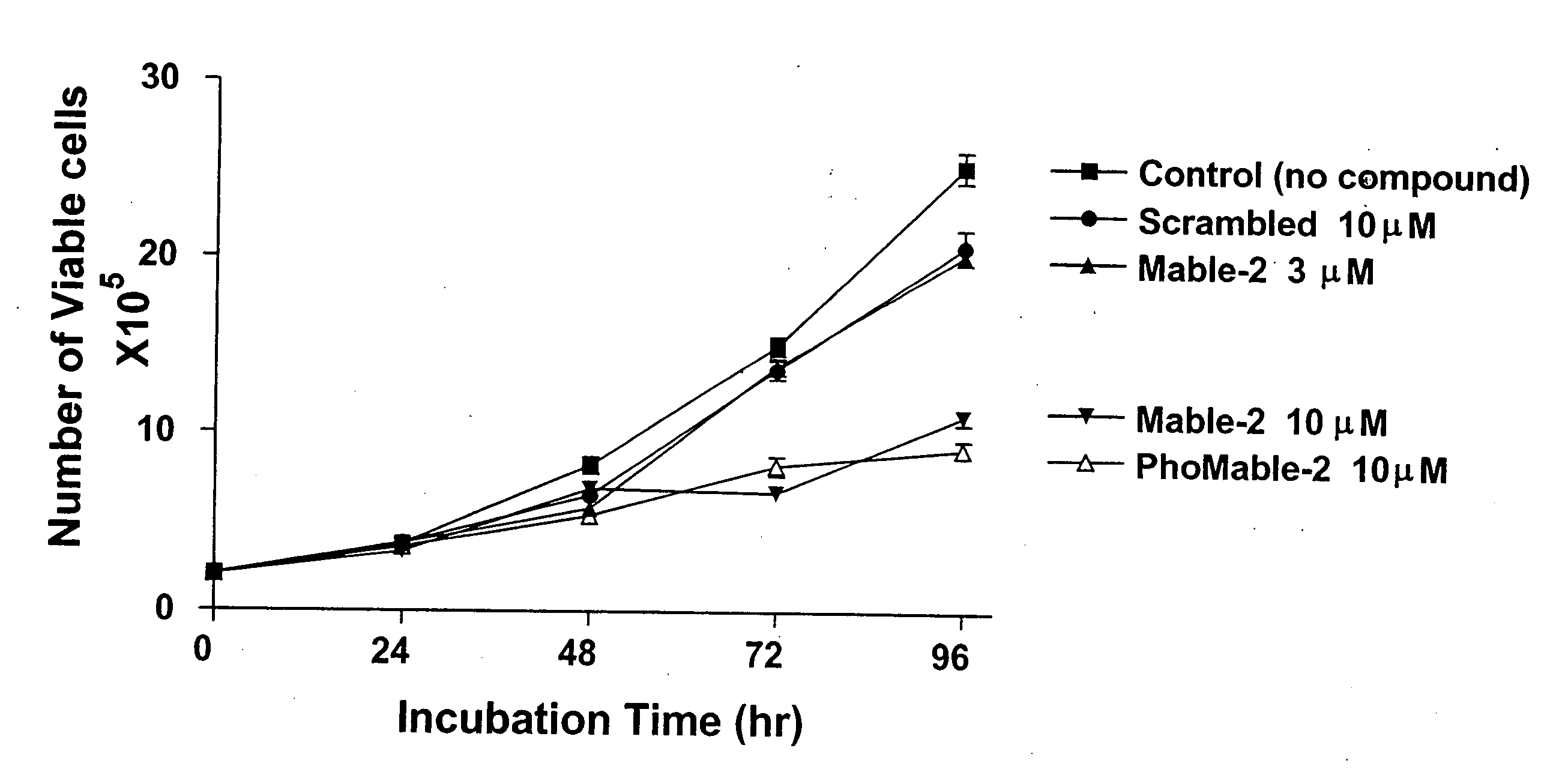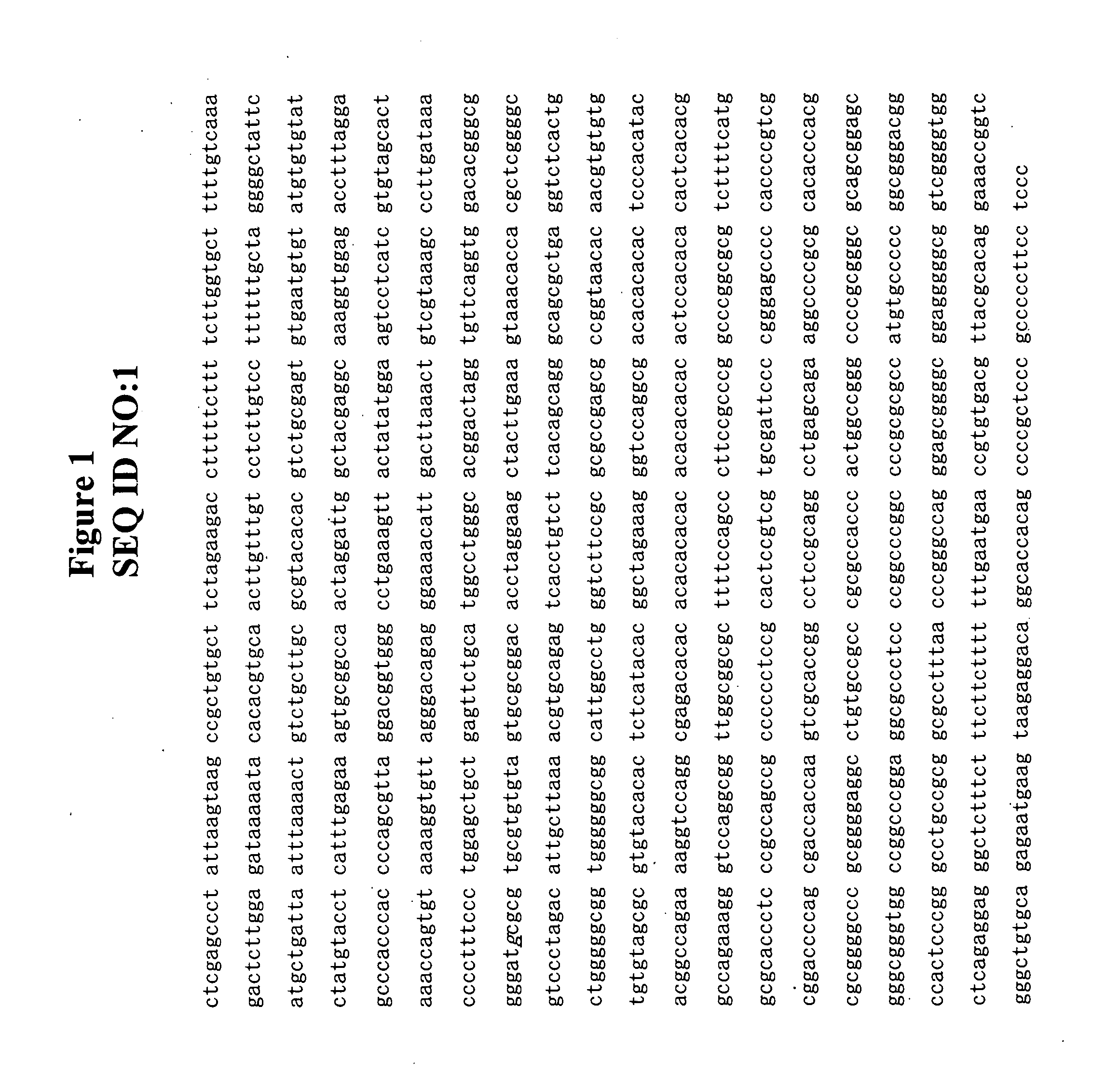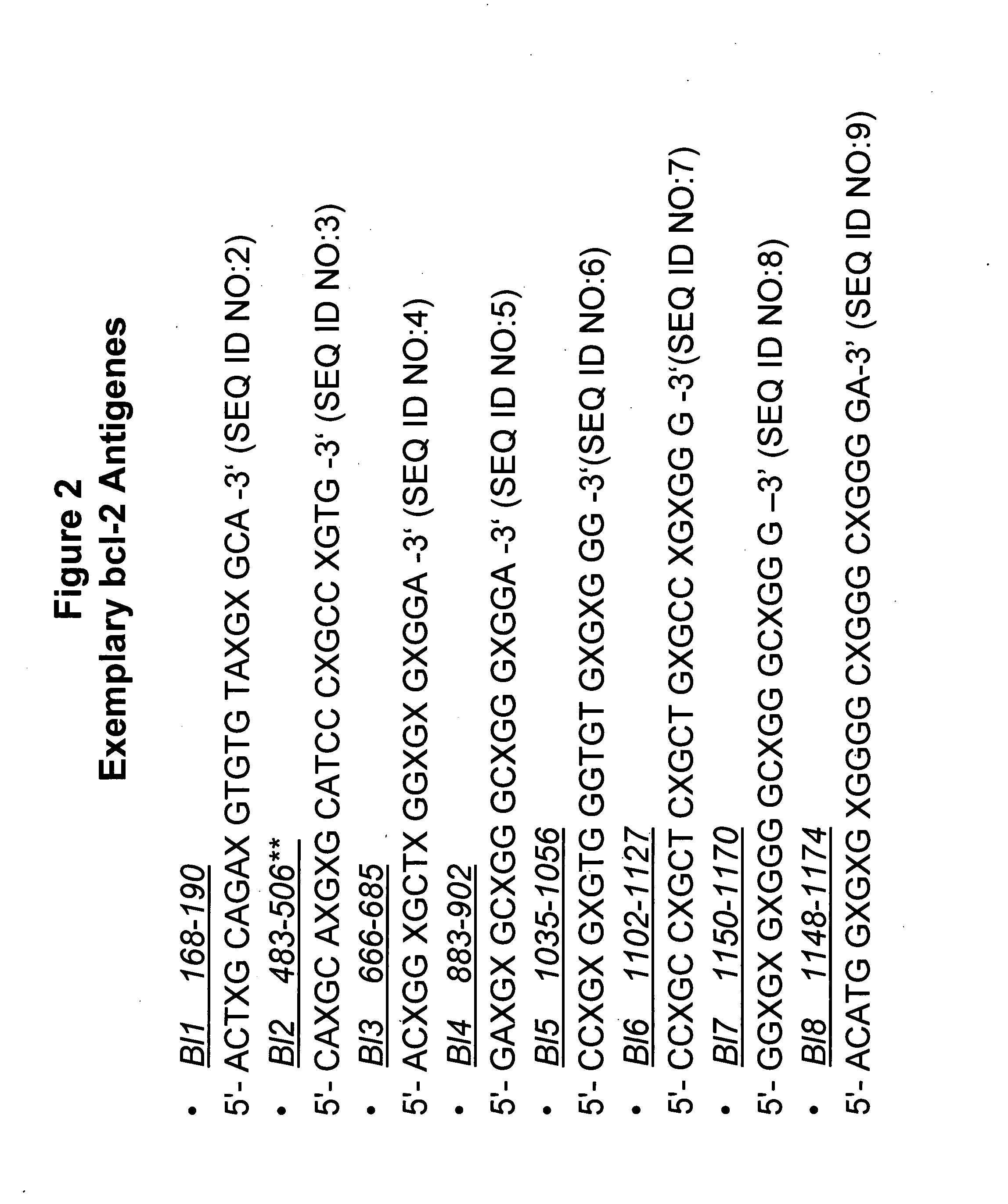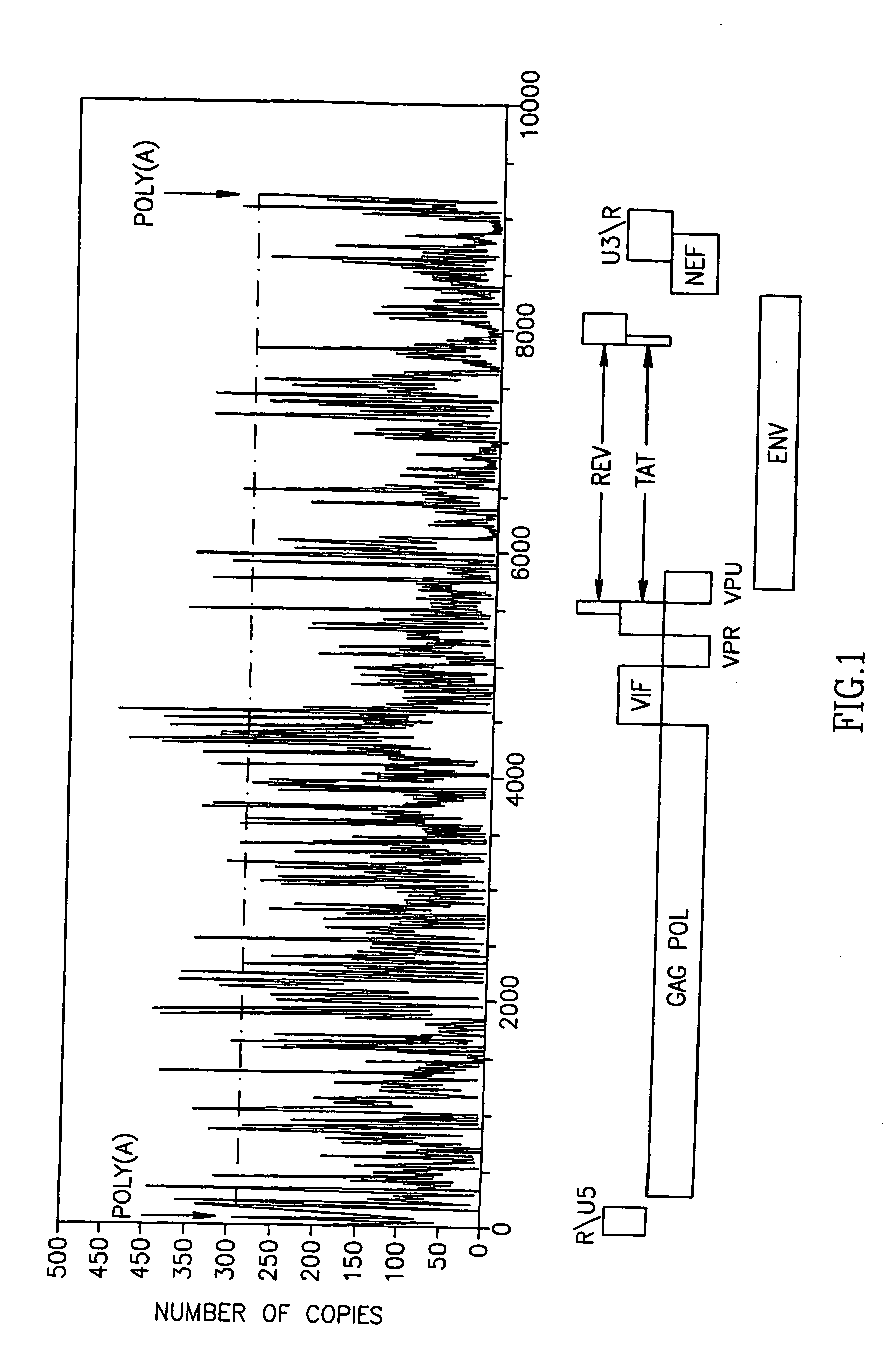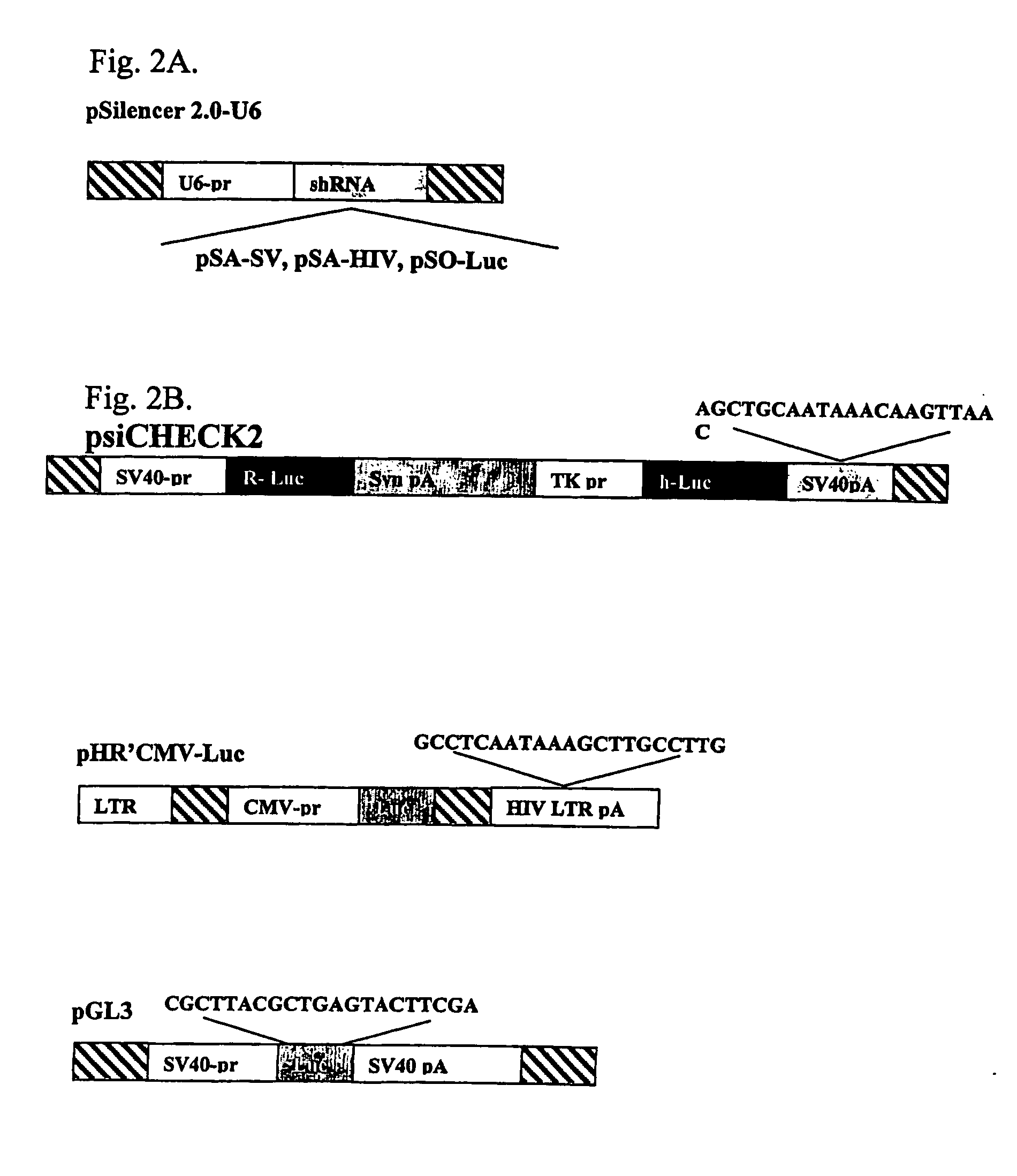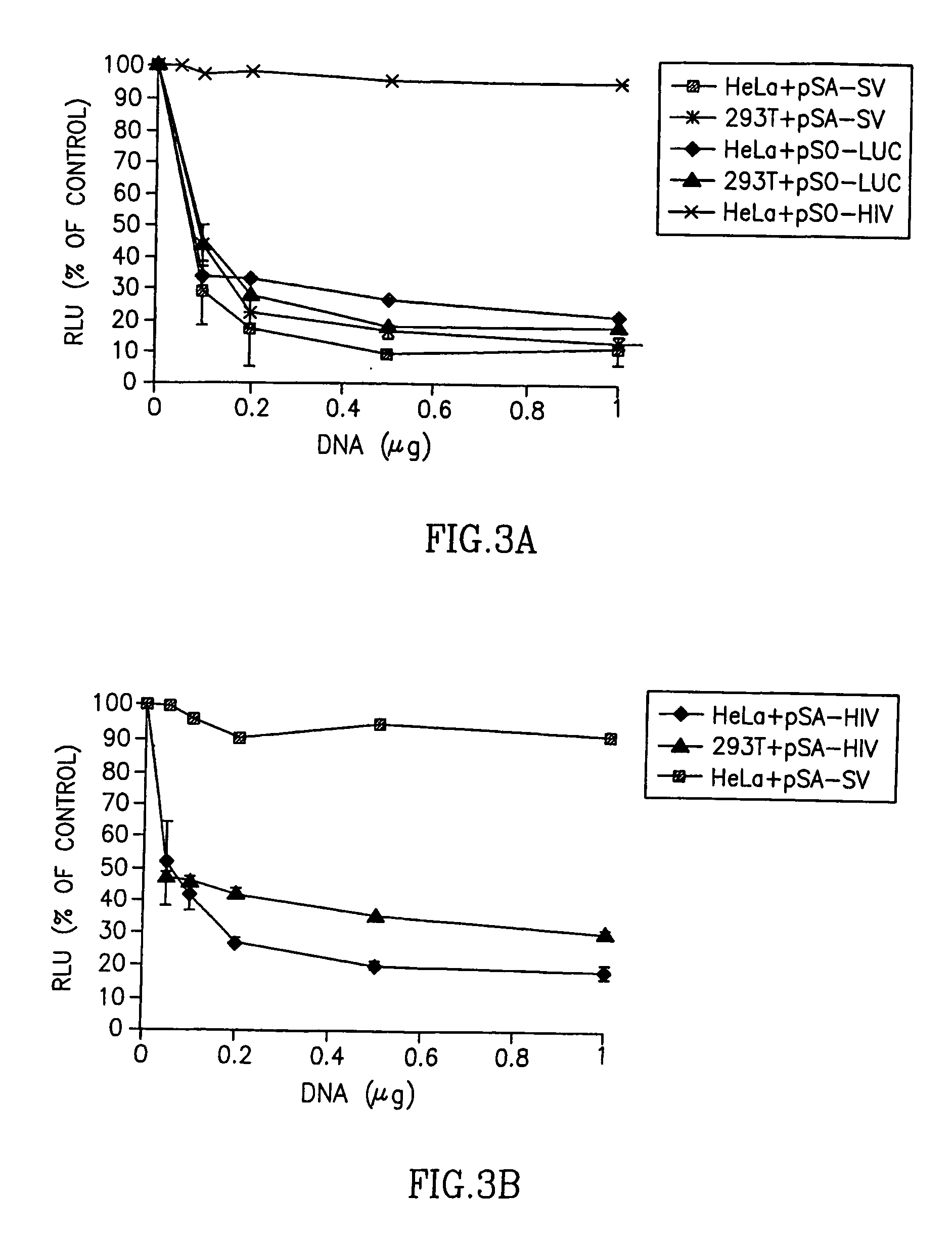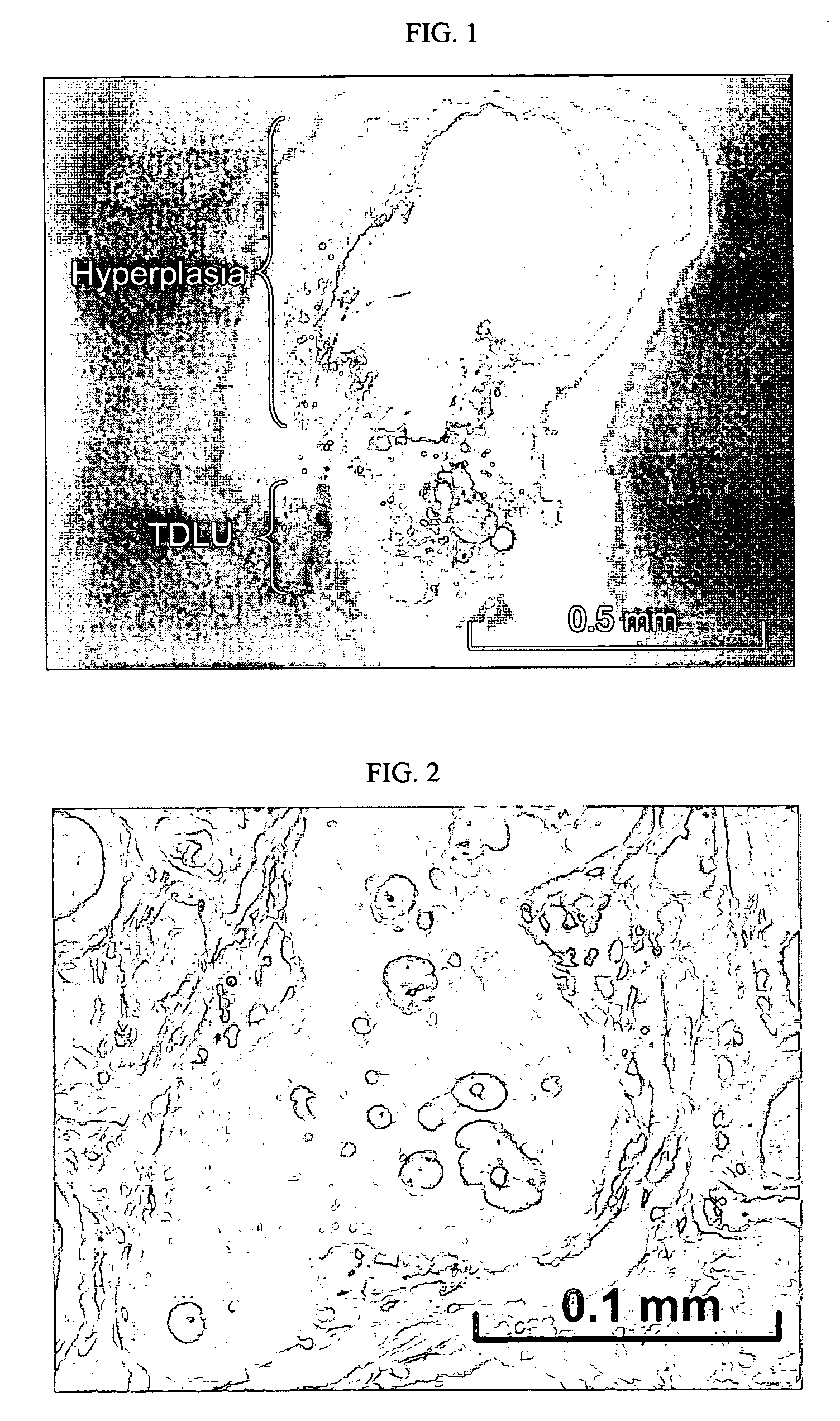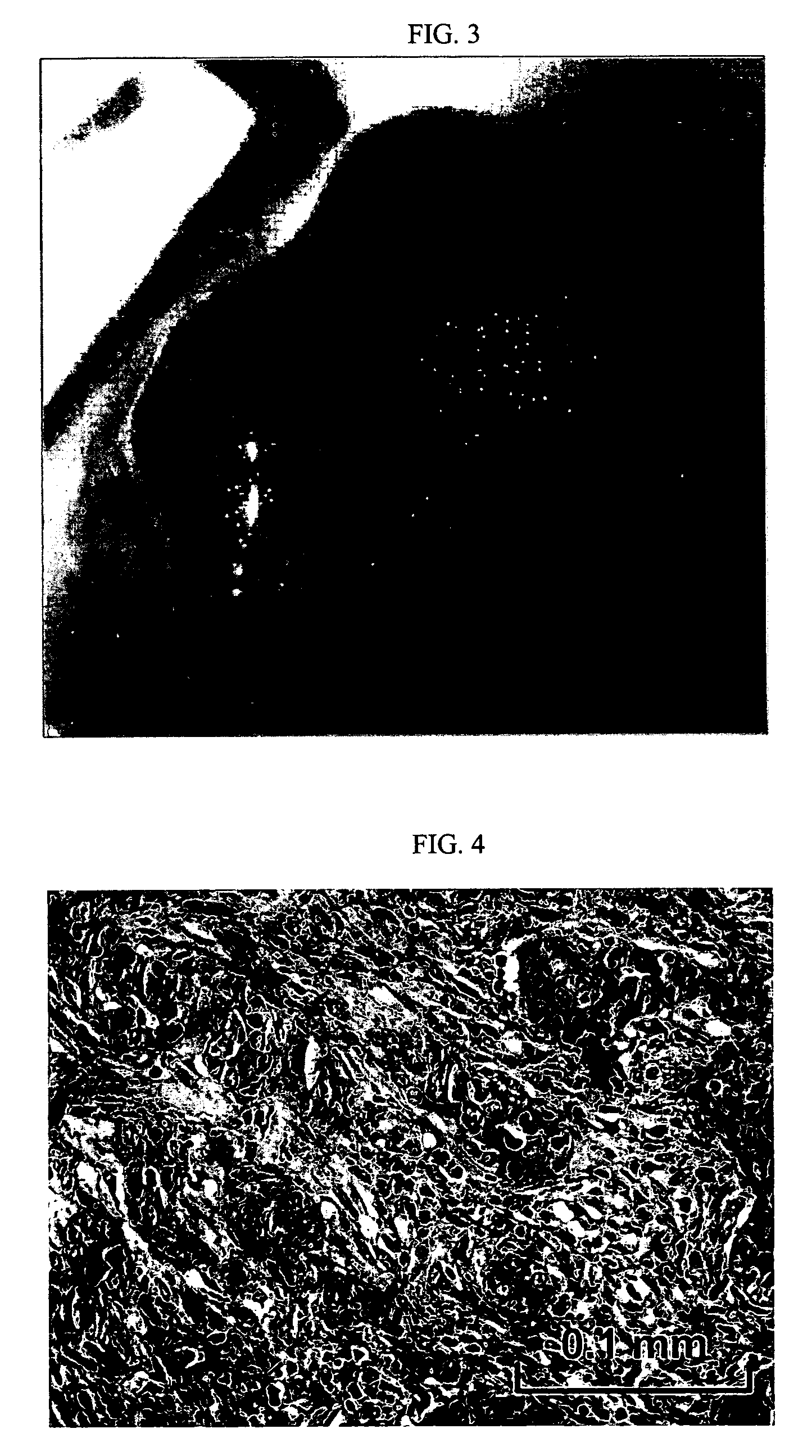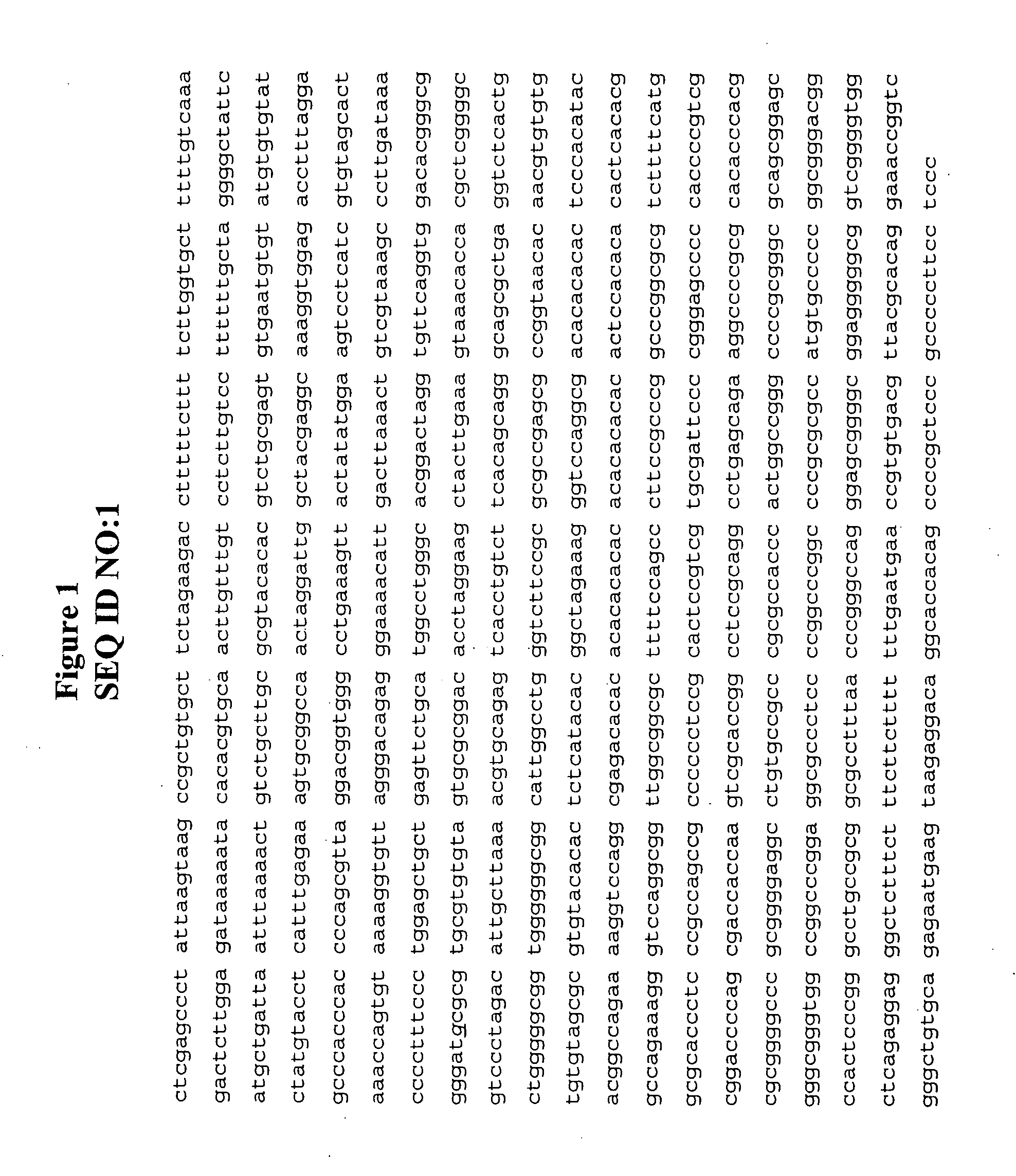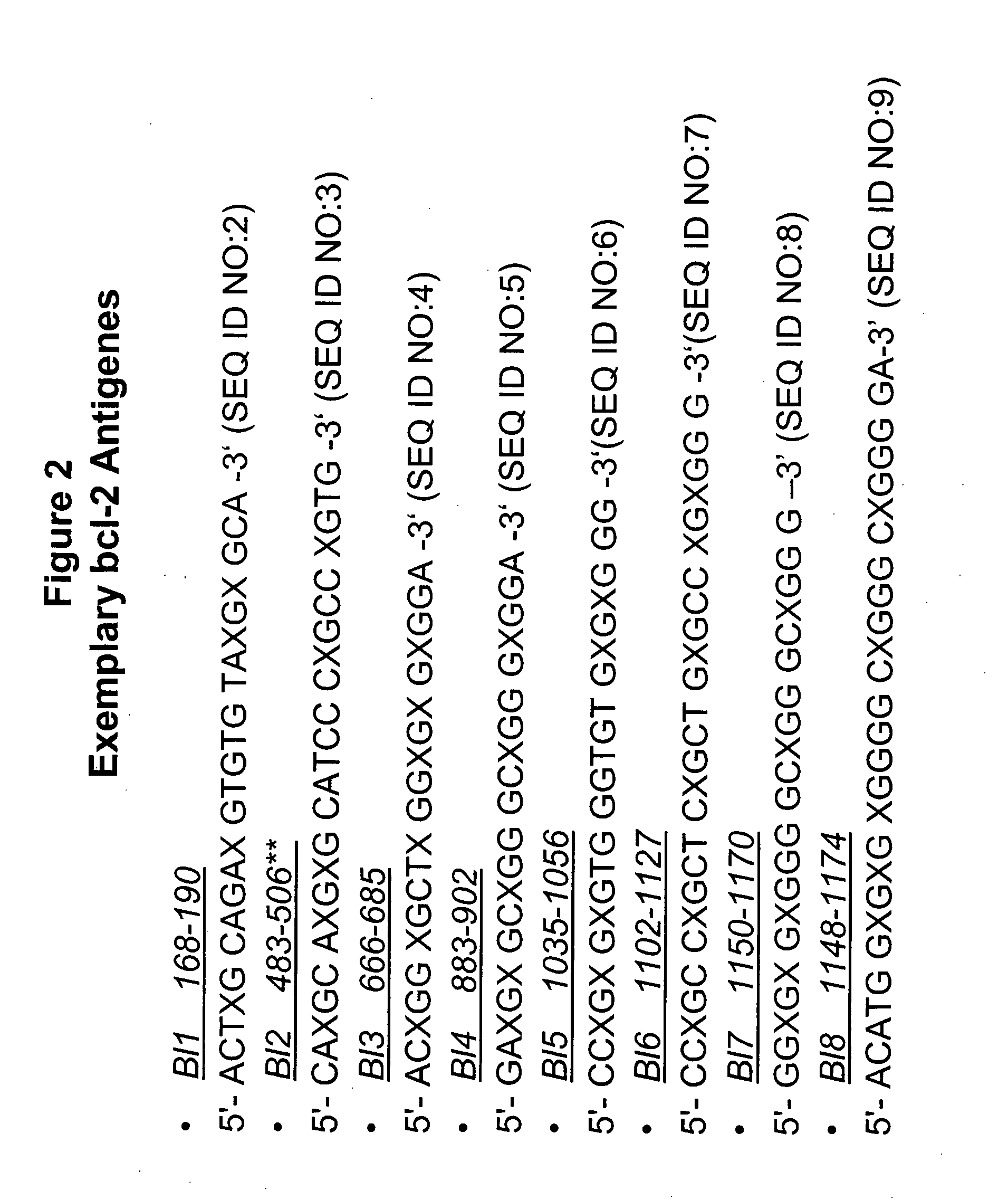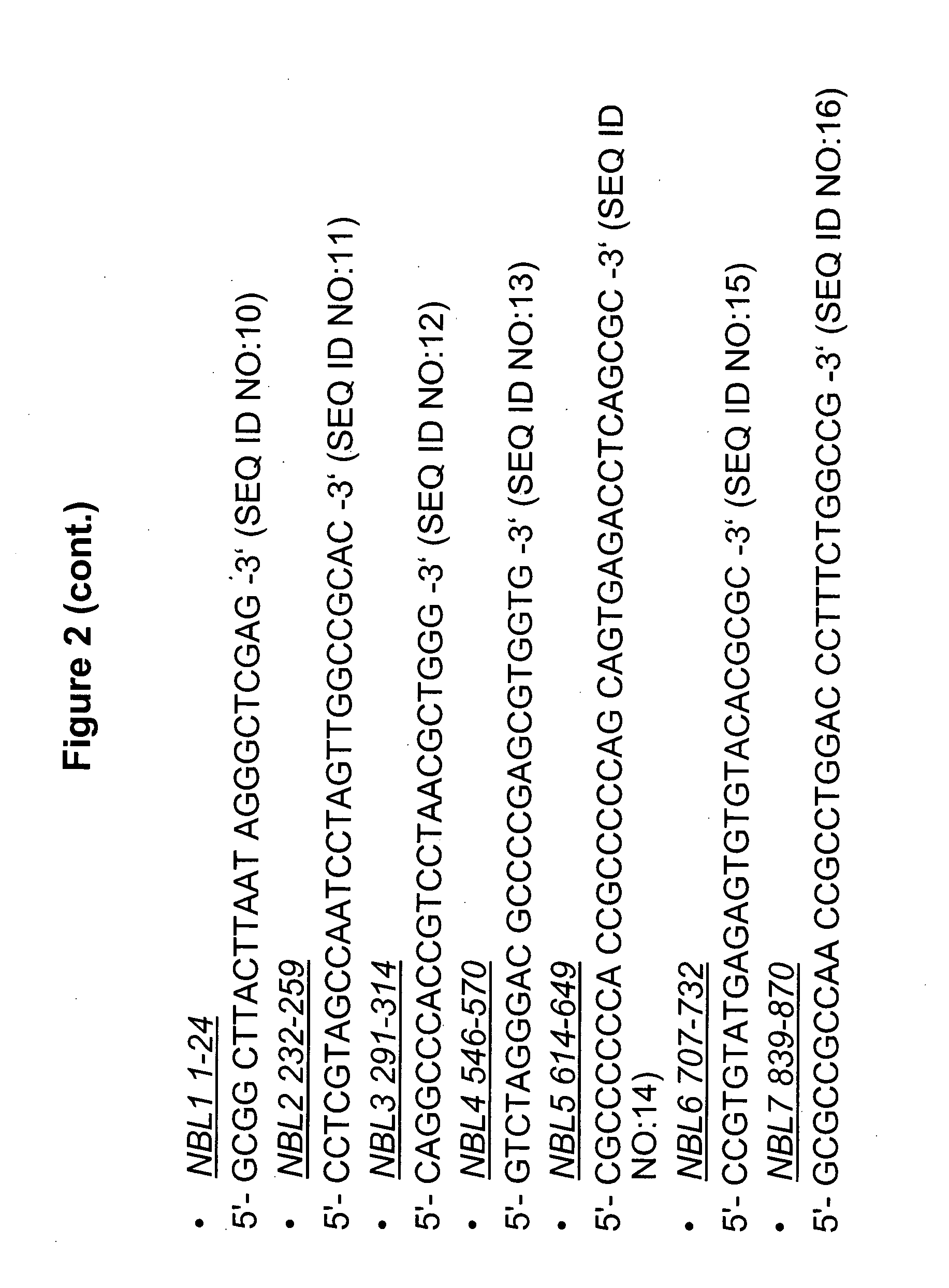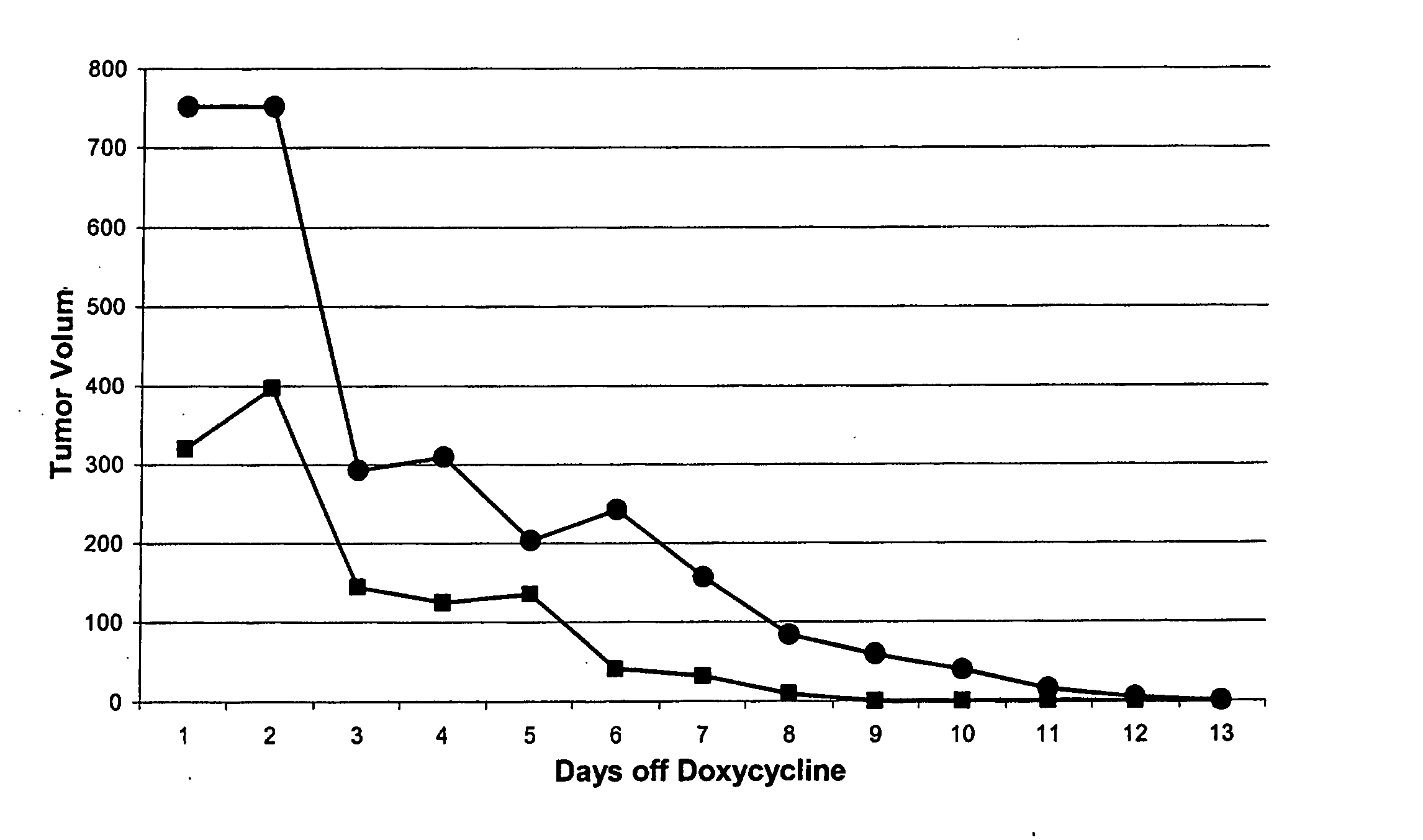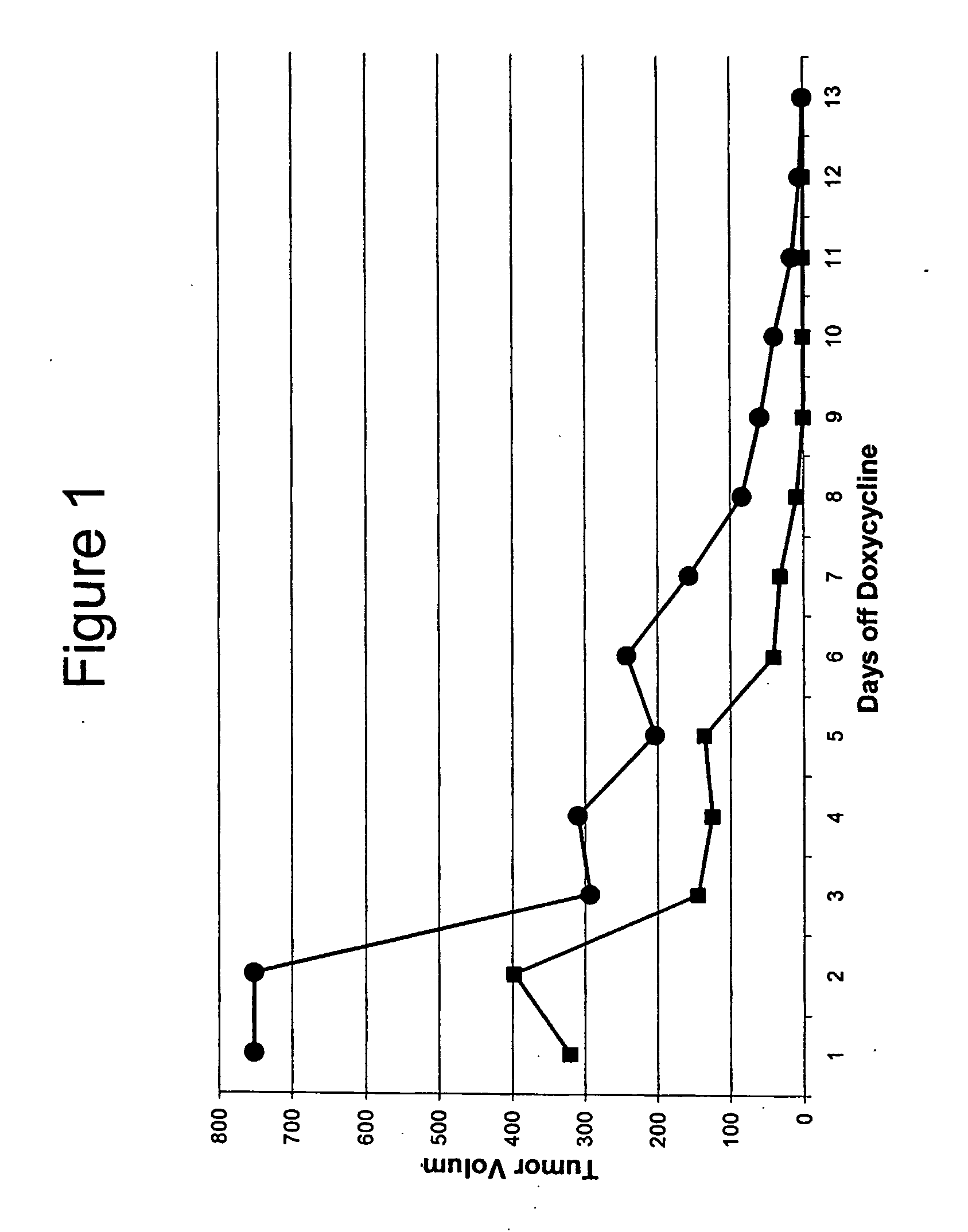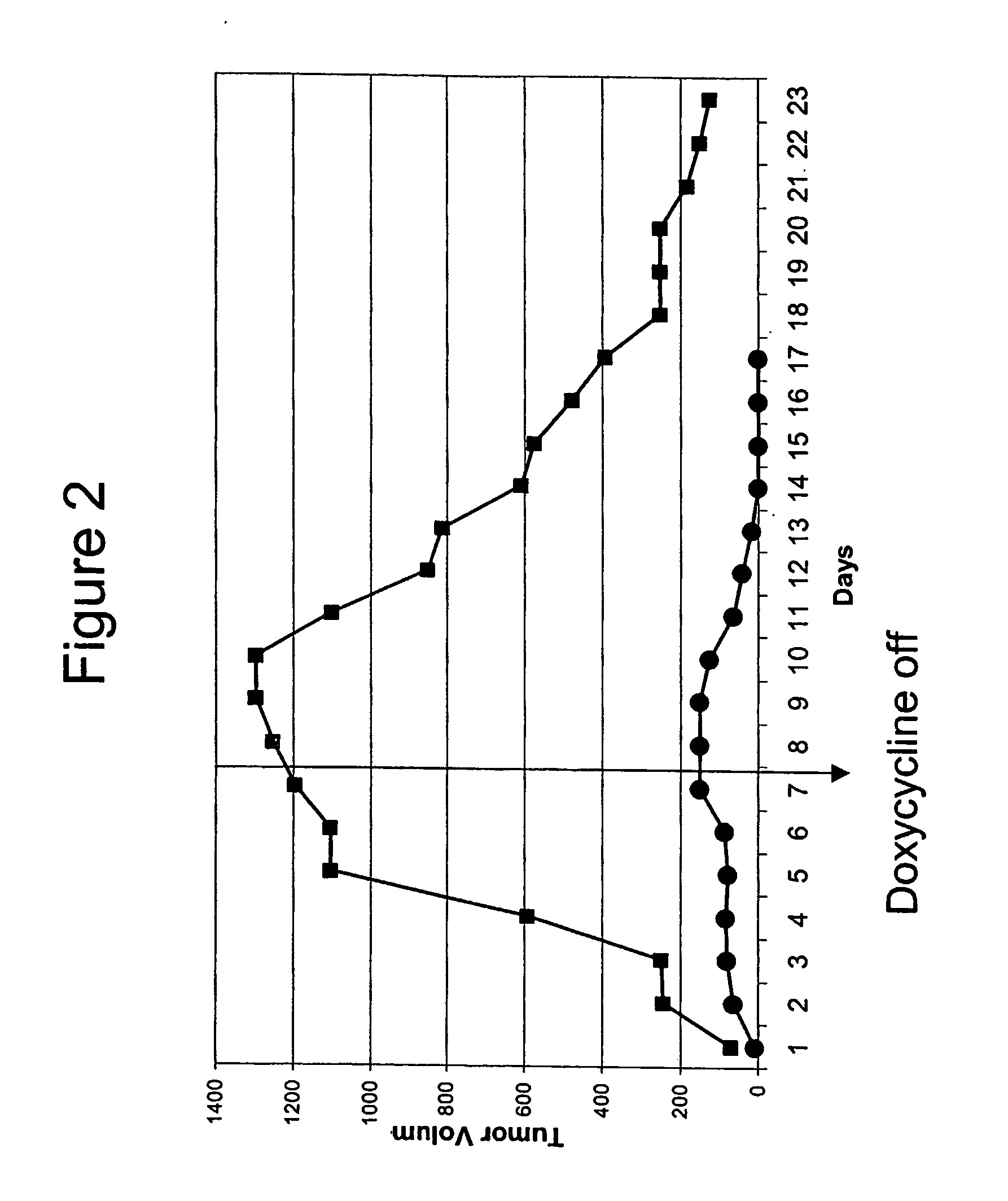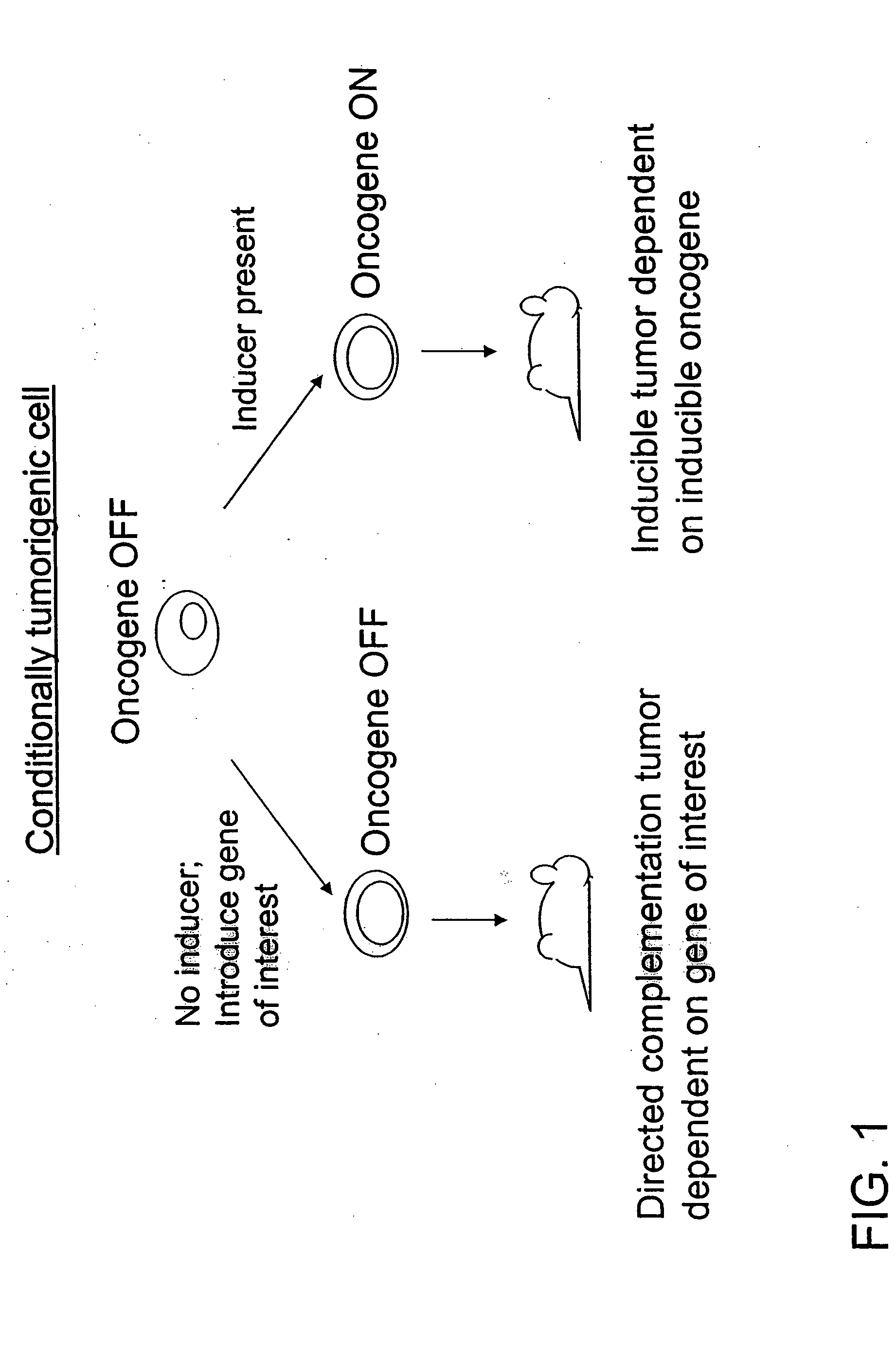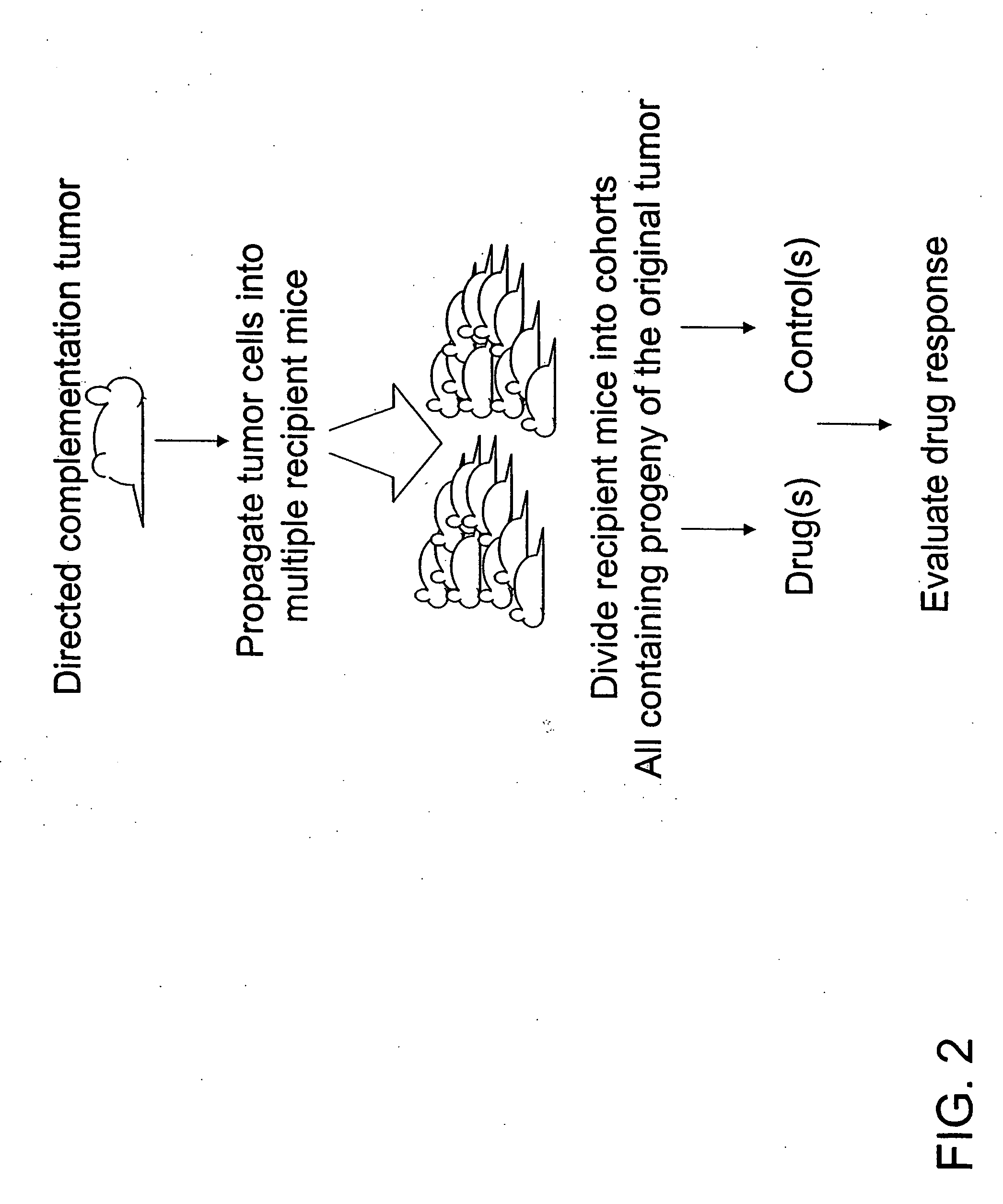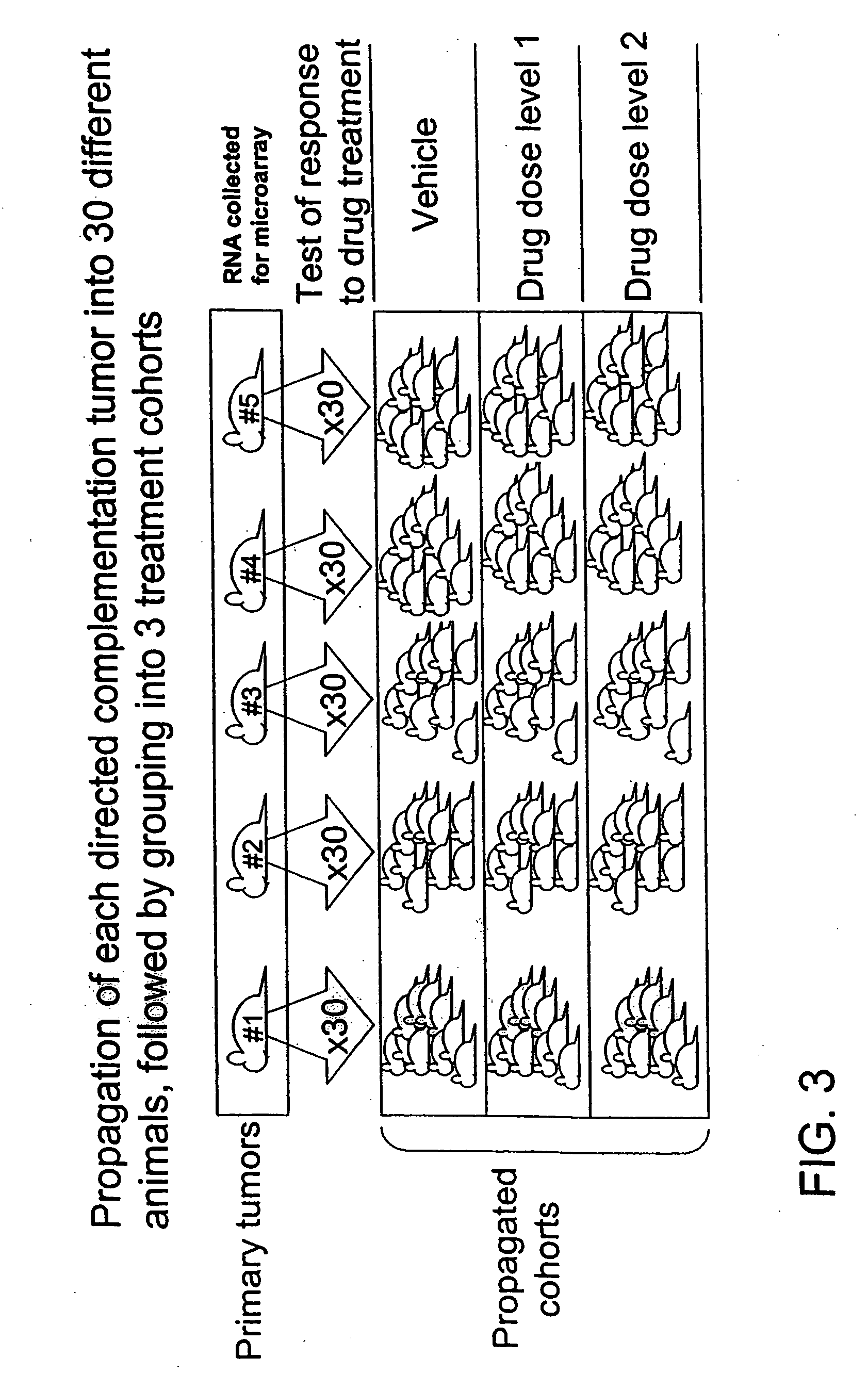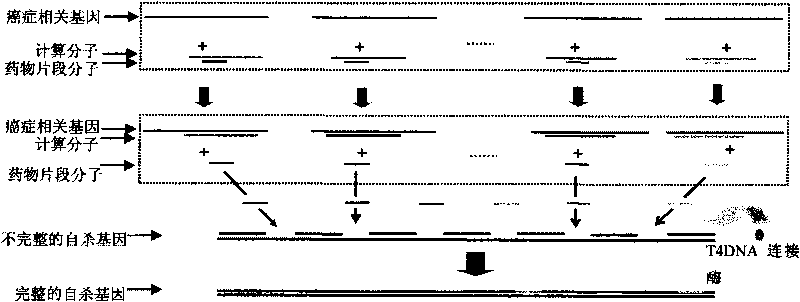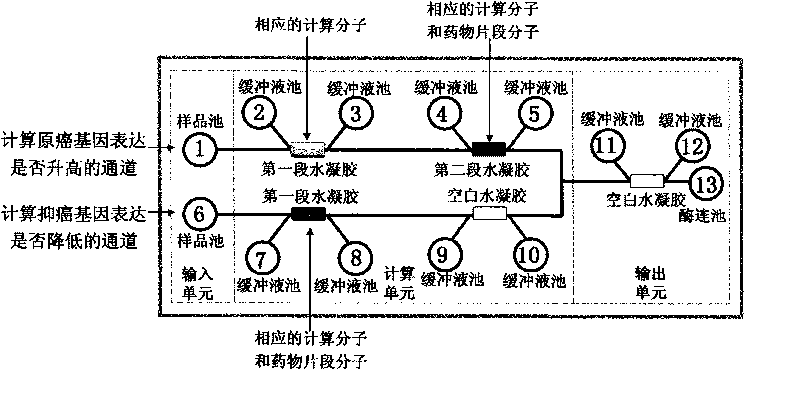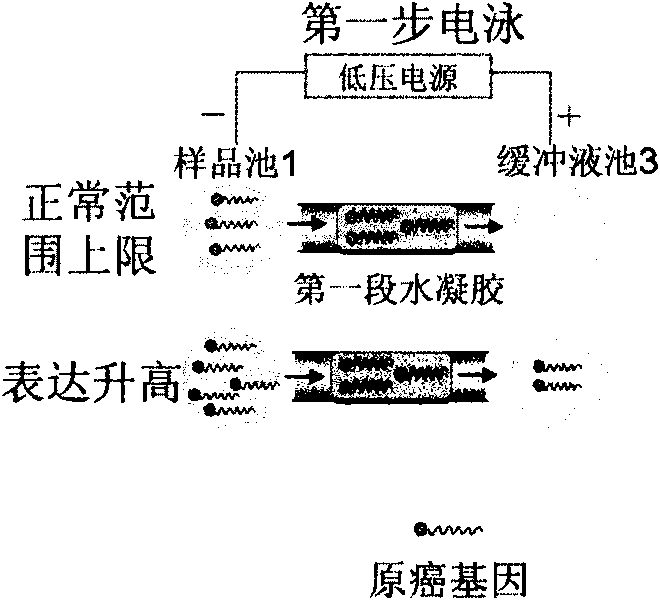Patents
Literature
66 results about "Oncogene Products" patented technology
Efficacy Topic
Property
Owner
Technical Advancement
Application Domain
Technology Topic
Technology Field Word
Patent Country/Region
Patent Type
Patent Status
Application Year
Inventor
A proto-oncogene is a normal gene that could become an oncogene due to mutations or increased expression. Proto-oncogenes code for proteins that help to regulate the cell growth and differentiation. Proto-oncogenes are often involved in signal transduction and execution of mitogenic signals, usually through their protein products.
Regulation of oncogenes by microRNAs
ActiveUS20060189557A1Inhibit expression of and moreSmall sizeOrganic active ingredientsNervous disorderCancer preventionDna encoding
Naturally occurring miRNAs that regulate human oncogenes and methods of use therof are described. Suitable nucleic acids for use in the methods and compositions described herein include, but are not limited to, pri-miRNA, pre-miRNA, mature miRNA or fragments of variants thereof that retain the biological activity of the mature miRNA and DNA encoding a pri-miRNA, pre-miRNA, mature miRNA, fragments or variants thereof, or regulatory elements of the miRNA. The compositions containing nucleic acids are administered to a patient in need of treatment or prophylaxis of at least one symptom or manifestation of cancer. In one embodiment, the compositions are administered in an effective amount to inhibit gene expression of one or more oncogenes. Methods for treatment or prevention of at least one symptom or manifestation of cancer are also described.
Owner:YALE UNIV
Method for increasing therapeutic gain in radiotherapy and chemotherapy
InactiveUS20050272644A1Inhibit tumor growthReduced radiation-induced normal tissue fibrosisBiocideAntipyreticAbnormal tissue growthTumor therapy
The present invention provides compositions and methods for increasing therapeutic gain in radiotherapy and chemotherapy for proliferating malignant or nonmalignant disease to produce high probability of tumor control with low frequency of sequelae of therapy by administering a therapeutically effective amount of a histone deacetylase inhibitor. The compounds are capable of simultaneously stimulating the epithelium regrowth, inhibiting the fibroblast proliferation, decreasing the collagen deposit, suppressing the fibrogenic growth factor, subsiding the proinflammatory cytokine and modulating the expression of cell cycle genes, tumor suppressors and oncogenes, and are useful to increase the therapeutic gain in radiotherapy and chemotherapy, which results in decrease of skin swelling and inflammation, promotion of epithelium healing in mucosa and dermis, decrease of xerostomia, prevention / reduction of severity of plantar-palmar syndrome, prevention of tissue fibrosis, ulceration, necrosis and tumorigenesis, and increase of tumor growth inhibition and tumor therapy effectiveness.
Owner:SUNNY PHARMTECH
Mutations of the pik3ca gene in human cancers
ActiveUS20090208505A1Inhibit progressReduce the amount requiredBiocideSugar derivativesHuman cancerSignalling pathways
Phosphatidylinositol 3-kinases (PI3Ks) are known to be important regulators of signaling pathways. To determine whether PI3Ks are genetically altered in cancers, we analyzed the sequences of the P13K gene family and discovered that one family member, PIK3CA, is frequently mutated in cancers of the colon and other organs. The majority of mutations clustered near two positions within the P13K helical or kinase domains. PIK3CA represents one of the most highly mutated oncogenes yet identified in human cancers and is useful as a diagnostic and therapeutic target.
Owner:THE JOHN HOPKINS UNIV SCHOOL OF MEDICINE
Orthotopic, controllable, and genetically tractable non-human animal model for cancer
InactiveUS20090022685A1High resolutionBiocideOrganic active ingredientsAbnormal tissue growthCooperative interaction
This invention provides a genetically tractable in situ non-human animal model for hepatocellular carcinoma. The model is useful, inter alia, in understanding the molecular mechanisms of liver cancer, in understanding the genetic alterations (e.g., in oncogenes and tumor suppressor genes) that lead to chemoresistance or poor prognosis, and in identifying and evaluating new therapies against hepatocellular carcinomas. The liver cancer model of this invention is made by altering hepatocytes to increase oncogene expression, to reduce tumor suppressor gene expression or both, preferably by inducible, reversible, and / or tissue specific expression of double-stranded RNA molecules that interfere with the expression of a target gene, and by transplanting the resulting hepatocytes into a recipient non-human animal. The invention further provides a method to treat cancer involving cooperative interactions between a tumor cell senescence program and the innate immune system.
Owner:COLD SPRING HARBOR LAB INC
Reconstituted human breast tumor model
InactiveUS20060123494A1Compounds screening/testingVirusesAbnormal tissue growthSimian Vacuolating Virus 40
A reconstituted human breast tumor model is disclosed. The model, which is incorporated into mice, provides actual tumors that arise spontaneously, thereby mimicking naturally occurring breast cancer. The tumors are genetically human, because they arise from human mammary tissues that develop from human mammary epithelial cells implanted into host mice. Prior to implantation, the mammary epithelial cells are genetically modified to contain a recombinant human oncogene and an SV40 early region.
Owner:AVEO PHARM INC
Monoclonal antigen-binding proteins to intracellular oncogene products
ActiveUS20180134804A1Antibody mimetics/scaffoldsImmunoglobulins against cell receptors/antigens/surface-determinantsRadio isotopesIntravenous gammaglobulin
Antigen binding proteins specific for an HLA-A2 restricted Ras peptide are disclosed. The antigen binding proteins encompass antibodies in a variety of forms, including full-length antibodies, substantially intact antibodies, Fab fragments, F(ab′)2 fragments, and single chain Fv fragments. Fusion proteins, such as scFv fusions with immunoglobulin or T-cell receptor domains, and bispecific antibodies incorporating the specificity of the antigen binding region for each peptide are also contemplated by the disclosure. Furthermore, immunoconjugates may include antibodies to which is linked a radioisotope, fluorescent or other detectable marker, cytotoxin, or other molecule are also encompassed by the disclosure. Among other things, immunoconjugates can be used for delivery of an agent to elicit a therapeutic effect or to facilitate an immune effector function.
Owner:MEMORIAL SLOAN KETTERING CANCER CENT +1
Polyethyleneimine-chitosan-octadecanoic acid grafting, preparation and application
InactiveCN101864078AIncreased ion buffering capacityAddress toxicityGenetic material ingredientsPharmaceutical non-active ingredientsHigh level expressionStearic acid
The invention provides a polyethyleneimine-chitosan-octadecanoic acid grafting, which is macromolecular substance, wherein parts of free amino groups on a chitosan chain are replaced by stearic acid or polyethyleneimine of which the weight-average molecular weight is 800Da. In the invention, on the basis of chitosan-octadecanoic acid grafting with the function of rapid cell absorbing, the polyethyleneimine with small molecular weight is modified, thereby improving the hydrophobicity of the original chitosan-octadecanoic acid grafting molecular structure, substantially increasing amino, improving the ion buffer capacity of molecular, and overcoming the toxicity of the polyethyleneimine. By the combination of rapid cell absorbing of the chitosan-octadecanoic acid grafting and the strong proton sponge effect of the polyethyleneimine, the invention can be applied to preparing the gene medicine so as to realize the high-level expression of the gene medicine and the effectiveness of oncogene therapy.
Owner:ZHEJIANG UNIV
Regulation of oncogenes by micrornas
ActiveUS20080119436A1Small sizeImprove manifestationNervous disorderPeptide/protein ingredientsSensitized cellDna encoding
Naturally occurring miRNAs that regulate human oncogenes and methods of use thereof are described. Suitable nucleic acids for use in the methods and compositions described herein include, but are not limited to, pri-miRNA, pre-miRNA, mature miRNA or fragments of variants thereof that retain the biological activity of the mature miRNA and DNA encoding a pri-miRNA, pre-miRNA, mature miRNA, fragments or variants thereof, or regulatory elements of the miRNA. The compositions are administered to a subject prior to administration of a cytotoxic therapy in an amount effective to sensitize cells or tissues to be treated to the effects of the cytotoxic therapy.
Owner:YALE UNIV
New drug
InactiveUS20050054593A1Growth inhibitionKeep for a long timePeptide/protein ingredientsAntibody mimetics/scaffoldsLymphatic SpreadMurine fibrosarcoma
CD44, the receptor for hyaluronic acid, has complex functions in cellular physiology, cell migration and tumour metastasis. The inventors have previously found that human CD44 receptor overexpression in mouse fibrosarcoma cells inhibits subcutaneous tumour growth in mice [Kogerman et al., Oncogene 1997; 15:1407-16; Kogerman et al., Clin Exp Metastasis 1998; 16:83-93]. Here it is demonstrated that a tumour growth inhibitory effect of CD44 is caused by block of angiogenesis. Furthermore, the inventors have found that soluble recombinant CD44 hyaluronic acid binding domain (CD44HABD) inhibits angiogenesis in vivo in cLick and mouse and thereby inhibits human tumour growth of various origins. The anti-angiogenic effect of CD44-HABD is independent of hyaluronic acid (HA) binding, since non-HA-binding mutants of CD44HABD still maintain anti-angiogenic properties. The invention discloses soluble CD44 recombinant proteins as a novel class of angiogenesis inhibitors based on targeting of vascular cell surface receptor. A method of block of angiogenesis and treatment of human tumours using recombinant CD44 proteins as well as their analogues is disclosed. As a further embodiment of the invention, methods for screening for new drug targets using CD44 recombinant proteins and their analogues is presented.
Owner:CELECURE
Amplification and overexpression of oncogenes
InactiveUS20050059011A1Hormone peptidesGenetic material ingredientsAbnormal tissue growthCancers diagnosis
There are disclosed methods and compositions for the diagnosis, prevention, and treatment of tumors and cancers in mammals, for example, humans, utilizing genes, which are amplified in many types of cancer. The amplified genes, their expressed protein products and antibodies are used diagnostically or as targets for cancer therapy or as vaccines; they also are used to identify compounds and reagents useful in cancer diagnosis, prevention, and therapy.
Owner:AMGEN INC
Methods and compositions using peptide-pulsed dendritic cells for stimulating cytotoxic T lymphocytes specific for tumor cells or virus-infected cells
InactiveUS20030032050A1Easy to synthesizePrevent proliferationBacterial antigen ingredientsViral antigen ingredientsDendritic cellT lymphocyte
A novel method of immunization, which can be used either prophylactically or therapeutically, is described. The method comprises coating of antigen presenting cells with a peptide and administering the peptide-coated cells to a mammalian subject to provoke an immune response. Useful peptides include peptides derived from viral or bacterial antigens or mutant oncogene or tumor suppressor gene products. Immunogens, constituted by the peptide-coated cells, are also described.
Owner:THE GOVT OF THE US REPRESENTED BY THE SEC OF THE DEPT OF H & H SERVICES
Identification and use of prognostic and predictive markers in cancer treatment
InactiveUS20090304697A1Reduce recurrenceLow recurrence rateOrganic active ingredientsMicrobiological testing/measurementFluorescenceTissue microarray
The present invention provides a method of screening for markers useful in predicting the efficacy of a specified cancer that includes: (a) constructing a tissue microarray from a tissue bank comprising multiple tissue samples that are annotated with clinical follow up data; (b) labeling polynucleic acid probes specific for oncogenes or cancer associated genes known to be potential amplicons; (c) performing fluorescent in situ hybridization analysis on the tissue microarray; and (d) correlating the result of the fluorescent in situ hybridization with the clinical follow up data. The present disclosure also provides methods of treating breast cancer that include screening a breast cancer patient for amplification of one or more of the genes disclosed herein, and treating a patient having amplification of one or more of these genes with a therapeutically effective amount of a compound that interferes with HER2 signaling.
Owner:NSABP FOUND INC
Directed complementation
A method of producing a tumorigenic mouse cell, the tumorigenicity of which depends on a recombinant gene of interest is disclosed. The method involves: (a) providing a conditionally tumorigenic mouse cell containing a recombinant oncogene operably linked to an inducible promoter, wherein (i) expression of the recombinant oncogene is necessary and sufficient for the tumorigenicity of the tumorigenic mouse cell, and (ii) the inducible promoter is in the uninduced state; and (b) introducing into the cell a recombinant gene of interest that functionally complements the oncogene. Also disclosed is a method of testing a compound for anti-tumor effects. The method includes producing tumorigenic mouse cells the tumorigenicity depends on expression of a recombinant gene of interest, implanting the cells in mice and obtaining tumors from the implanted cells, administering test compounds to the mice, and determining anti-tumor effects, if any, of the compounds.
Owner:AVEO PHARM INC
Promoters to control cell differentiation
InactiveUS20050032213A1Preventing unregulated expressionVectorsGenetic material ingredientsControl cellPolynucleotide
Recombinant vectors or constructs are prepared comprising a polynucleotide that encodes a conditionally-induced oncogene operably linked to the enhancer element of the second intron of the nestin gene, or a functional fragment thereof. The constructs can be used to produce conditionally immortal cells, for transplantation.
Owner:RENEURON LTD
Methods and probes for diagnosing a gynaecological condition
InactiveUS20050142580A1Monitor progressSugar derivativesMicrobiological testing/measurementDiseaseDLX5
DNA sequences are identified that are useful in the diagnosis of gynaecological conditions such as endometriosis. Some of the sequences have a high identity with gene of known function such as Pim-2 oncogenes, IGFBP-5, ribosomal protein L41, propsaponin, fibulin-1, DLX5, 11β hydroxysteroid dehydrogenase type 2, SET, and RhoE. Methods for diagnosing or monitoring the progression of a gynaecological condition such as endometriosis may use primers directed to the DNA sequences identified herein.
Owner:TAY SUN +1
Methods and compositions for the inhibition of gene expression
InactiveUS20050287667A1Reduce cell proliferationReduce spreadMicroencapsulation basedGenetic material ingredientsOncogene ProductsCancer research
The present invention relates to methods and compositions for the inhibition of gene expression. In particular, the present invention provides oligonucleotide-based therapeutics for the inhibition of oncogenes involved in cancers.
Owner:PRONAI THERAPEUTICS INC
High throughput cancer pharmaceutical screening using drosophila
InactiveUS20060010505A1Easy to practiceEasy to adaptOncogene translation productsGenetic engineeringAbnormal tissue growthTumour suppressor gene
Owner:WASHINGTON UNIV IN SAINT LOUIS
Novel Therapeutic RNA Interference Technology Targeted to the PDX-1 Oncogene in PDX-1 Expressing Neuroendocrine Tumors
InactiveUS20110117183A1High activityHigh efficacyOrganic active ingredientsMicroencapsulation basedFhit geneNeuroendocrine tumors
A bifunctional shRNA-based composition and methods for knocking down the expression of the PDX-1 oncogene in target cells is described herein. The invention also provides methods to deliver the shRNA-containing expression vectors to target tissues overexpressing the PDX-1 oncogene.
Owner:BAYLOR COLLEGE OF MEDICINE
Methods and compositions for the inhibition of gene expression
InactiveUS20060135455A1Reduce proliferationReduce spreadMicroencapsulation basedGenetic material ingredientsOncogene ProductsCancer research
Owner:PRONAI THERAPEUTICS INC
Oncogenes and methods for their detection
InactiveUS6713619B1Immune responseSimple diagnostic assaySugar derivativesPeptide/protein ingredientsCancer cellNucleic Acid Probes
Experiments designed to define the differences between the 21 oncogene of DNA isolated from human bladder cancer cells and its corresponding proto-oncogene are described herein. Also described is the determination of the difference between the rat neu oncogene and its corresponding proto-oncogene. Also described are nucleic acid probes reactive with regions of the proto-oncogene or oncogene, as are methods for their use in detecting the occurrence of the two types of genes. Antibodies specific for gene products encoded by the neu genes are also described, as are methods for their use.
Owner:MASSACHUSETTS INST OF TECH
Compound for selectively degrading CDK subtype in targeted manner and application thereof
InactiveCN110938060APrevent proliferationOrganic active ingredientsOrganic chemistryMetaboliteCancer cell
The invention discloses a compound for selectively degrading a CDK subtype in a targeted manner, and belongs to the field of biomedicine. The compound is a compound shown as a formula I or a stereoisomer, a geometrical isomer, a tautomer, a nitrogen oxide compound, a hydrate, a solvent compound, a metabolite, a pharmaceutically acceptable salt or a prodrug thereof, and can selectively degrade CDK2or CDK2 / 9 so as to block the synthesis process of DNA and achieve the proliferation of cancer cells, wherein certain compounds capable of selectively degrading CDK subtypes in the targeted manner canalso down-regulate signal channels including proto-oncogene products c-MYC and MCL-1, can strongly inhibit the proliferation of cancer cells, and have a potential treatment effect. X-Y-Z Formula I isperformed, wherein: X represents a cyclin kinase inhibitor, Z represents a CRBN ligand, Y represents a chain linking X and Z, and X is a structure as shown in a formula II or a formula III.
Owner:SICHUAN UNIV
Mutated ras peptides for generation of cd8+ cytotoxic t lymphocytes
InactiveUS20100074945A1Enhanced effector functionEnhances CTL activityBiocidePeptide/protein ingredientsCtl epitopeVaccination
Mutant ras oncogene peptides may induce specific anti-ras cellular immune responses in vaccinated patients. Moreover, a human CD8+ CTL epitope(s) reflecting a specific point mutation in the K-ras oncogene at codon 12 was identified. The mutant ras peptide has implications for both active and passive immunotherapies in selected carcinoma patients. A nested 10-mer peptide was identified [i.e., ras5-14(Asp12)], which was shown to bind to HLA-A2 and display specific functional capacity for expansion of the in vivo-primed CD8+ CTL precursors.
Owner:UNITED STATES OF AMERICA
Detection of extracellular tumor-associated nucleic acid in blood plasma or serum using nucleic acid amplification assays
InactiveUS20050176015A1Antibody mimetics/scaffoldsMicrobiological testing/measurementDiseaseNeoplasm
This invention relates to detection of specific extracellular nucleic acid in plasma or serum fractions of human or animal blood associated with neoplastic or proliferative disease. Specifically, the invention relates to detection of nucleic acid derived from mutant oncogenes or other tumor-associated DNA, and to those methods of detecting and monitoring extracellular mutant oncogenes or tumor-associated DNA found in the plasma or serum fraction of blood by using rapid DNA extraction followed by nucleic acid amplification with or without enrichment for mutant DNA. In particular, the invention relates to the detection, identification, or monitoring of the existence, progression or clinical status of benign, premalignant, or malignant neoplasms in humans or other animals that contain a mutation that is associated with the neoplasm through detection of the mutated nucleic acid of the neoplasm in plasma or serum fractions. The invention permits the detection of extracellular, tumor-associated nucleic acid in the serum or plasma of humans or other animals recognized as having a neoplastic or proliferative disease or in individuals without any prior history or diagnosis of neoplastic or proliferative disease. The invention provides the ability to detect extracellular nucleic acid derived from genetic sequences known to be associated with neoplasia, such as oncogenes, as well as genetic sequences previously unrecognized as being associated with neoplastic or proliferative disease. The invention thereby provides methods for early identification of colorectal, pancreatic, lung, breast, bladder, ovarian, lymphoma and all other malignancies carrying tumor-related mutations of DNA and methods for monitoring cancer and other neoplastic disorders in humans and other animals.
Owner:PENN STATE RES FOUND
Methods and compositions for cancer therapy
InactiveUS20070213285A1Reduce proliferationOrganic active ingredientsSugar derivativesCancer therapyOncogene Products
The present invention relates to methods and compositions for the inhibition of gene expression. In particular, the present invention provides oligonucleotide-based therapeutics for the inhibition of oncogenes involved in cancers.
Owner:PRONAI THERAPEUTICS INC
Universal target sequences for siRNA gene silencing
InactiveUS20070123485A1Good treatment effectSugar derivativesGenetic material ingredientsPoly-A RNAGene silencing
The present invention provides methods for designing a sequence for efficient short interference RNA molecules. In particular, the present invention defines a universal target for siRNA derived from the consensus sequence of the polyadenylation signal in conjunction with unique sequences for gene silencing and inhibition of viral replication in a eukaryotic host cell. The present invention further provides methods for the treatment and prevention of diseases and disorders by silencing a gene of a virus, an oncogene, genes encoding transcription factors and many other diseases related genes.
Owner:YISSUM RES DEV CO OF THE HEBREW UNIV OF JERUSALEM LTD
Reconstituted human breast tumor model
InactiveUS20060123493A1Compounds screening/testingVirusesAbnormal tissue growthHuman Mammary Epithelium
A reconstituted human breast tumor model is disclosed. The model, which is incorporated into mice, provides actual tumors that arise spontaneously, thereby mimicking naturally occurring breast cancer. The tumors are genetically human, because they arise from human mammary tissues that develop from human mammary epithelial cells implanted into host mice. Prior to implantation, the mammary epithelial cells are genetically modified to contain a recombinant human oncogene and an SV40 early region.
Owner:AVEO PHARM INC
Methods and compositions for the inhibition of gene expression
InactiveUS20060073596A1Reduce proliferationReduce spreadSugar derivativesMicroencapsulation basedOncogene ProductsCancer research
The present invention relates to methods and compositions for the inhibition of gene expression. In particular, the present invention provides oligonucleotide-based therapeutics for the inhibition of oncogenes involved in cancers.
Owner:PRONAI THERAPEUTICS INC
Chimeric Cancer Models
Chimeric nonhuman mammals useful as inducible spontaneous cancer models are disclosed. The nonhuman mammals are obtained by introducing one or more genetically modified embryonic stem (ES) cells into an early stage embryo, and then implanting the manipulated embryo into a surrogate mother. The ES cells contain a recombinant oncogene, and also may contain a genetic mutation that deletes or inactivates a tumor suppressor gene. Models of different types of cancer are produced by introducing different combinations of genetic mutations into the ES cells that are introduced into the early stage embryo.
Owner:AVEO PHARM INC
Directed complementation
A method of producing a tumorigenic mouse cell, the tumorigenicity of which depends on a recombinant gene of interest is disclosed. The method involves: (a) providing a conditionally tumorigenic mouse cell containing a recombinant oncogene operably linked to an inducible promoter, wherein (i) expression of the recombinant oncogene is necessary and sufficient for the tumorigenicity of the tumorigenic mouse cell, and (ii) the inducible promoter is in the uninduced state; and (b) introducing into the cell a recombinant gene of interest that functionally complements the oncogene, thereby restoring tumorigenicity without expression of the inducible recombinant oncogene. Also disclosed is a method of testing a compound for anti-tumor effects. The method includes producing tumorigenic mouse cells the tumorigenicity depends on expression of a recombinant gene of interest, implanting the cells in mice and obtaining tumors from the implanted cells, administering test compounds to the mice, and determining anti-tumor effects, if any, of the compounds.
Owner:AVEO PHARM INC
Genetic therapy breast cancer drug preparation method based on microfluidic chip
InactiveCN101745121AMicrobiological testing/measurementGenetic material ingredientsTherapeutic effectC erbb 2
The invention discloses a genetic therapy breast cancer drug preparation method based on microfluidic chip, which includes that: the method adopts biological molecules as computation medium to compute the cancer-related gene expression through biochemical reaction; when the result meets the requirement, the anti-cancer drug is automatically synthesized and released in targeted manner; the anti-cancer drug is complete suicide gene; the biological molecules used as computation medium are DNA molecules and / or enzyme; the oncogene related to breast cancer includes: C-erbB-2, EGFR, c-myc, ras, int-2, bcl-2, BAG-1, BCSG-2 and survivin; the cancer suppressor gene related to breast cancer includes P53, nm23, PTEN, Rb, P16, P21, CHEK2, BRCA1 and BRCA2. The invention can synthesize and release anti-cancer drugs for breast cancer on specified conditions; and the anti-cancer drugs are complete suicide gene. The method can be combined with the nanometer technology and micromachining technology to help improve the treatment effect.
Owner:DALIAN INST OF CHEM PHYSICS CHINESE ACAD OF SCI
Features
- R&D
- Intellectual Property
- Life Sciences
- Materials
- Tech Scout
Why Patsnap Eureka
- Unparalleled Data Quality
- Higher Quality Content
- 60% Fewer Hallucinations
Social media
Patsnap Eureka Blog
Learn More Browse by: Latest US Patents, China's latest patents, Technical Efficacy Thesaurus, Application Domain, Technology Topic, Popular Technical Reports.
© 2025 PatSnap. All rights reserved.Legal|Privacy policy|Modern Slavery Act Transparency Statement|Sitemap|About US| Contact US: help@patsnap.com
